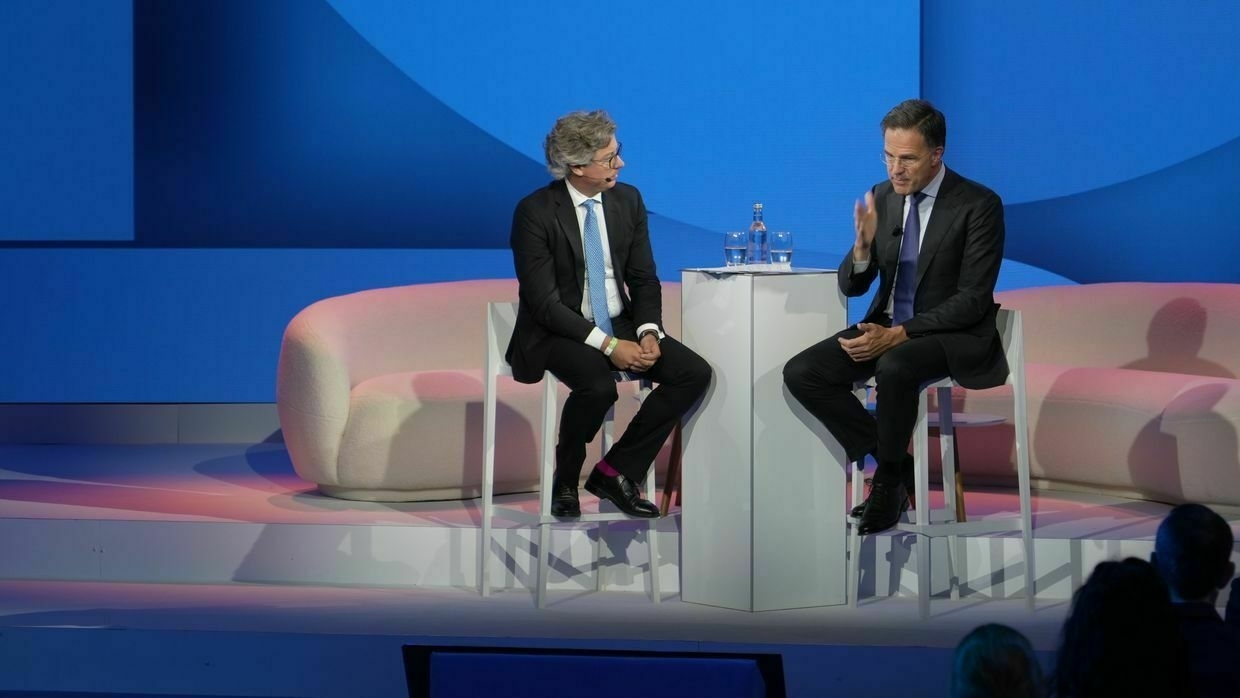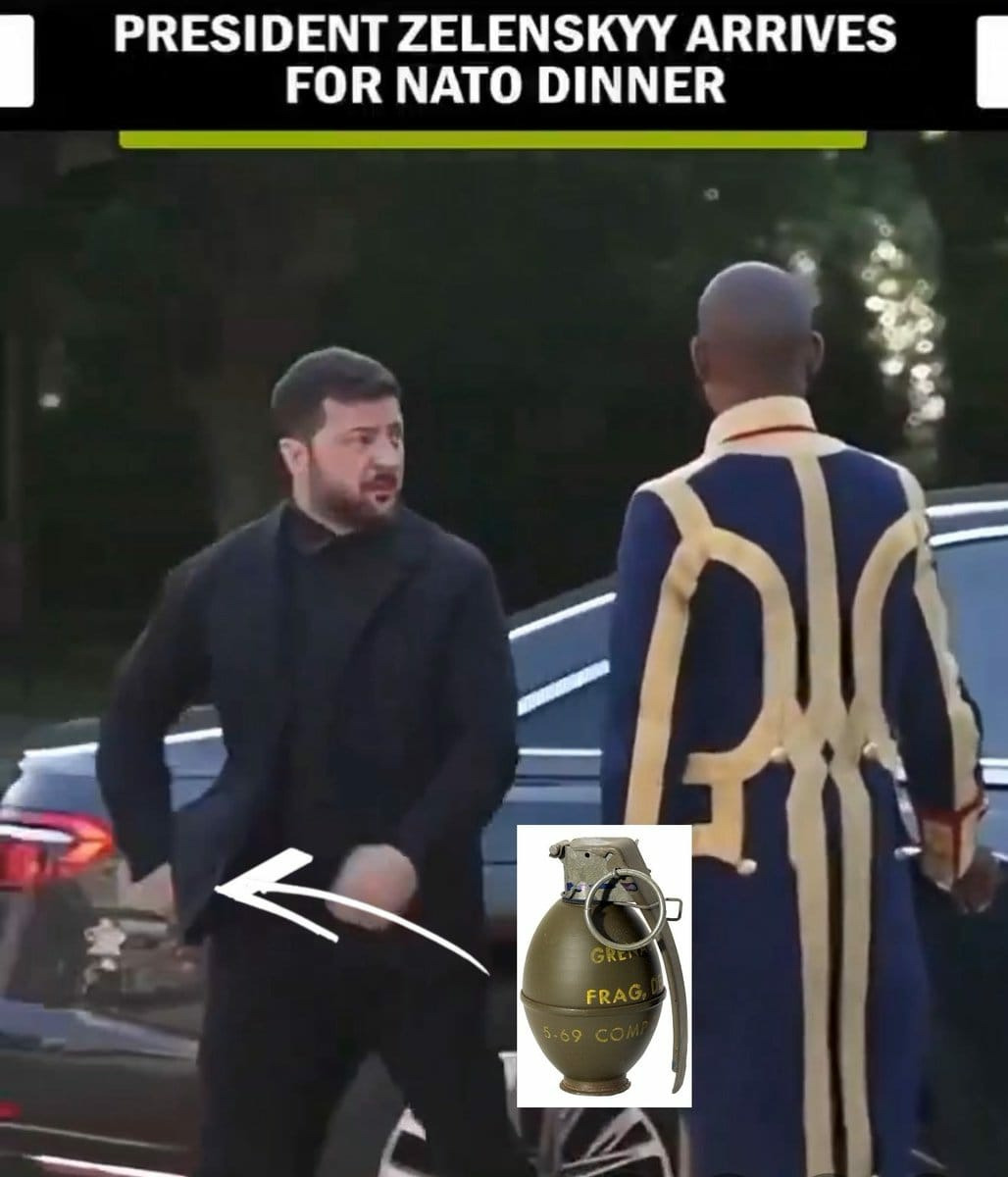-
Good сonversation! TRUMP on talking with Zelenskyy at NATO summit
-
'It's possible' — Trump on Putin's territorial ambitions beyond Ukraine
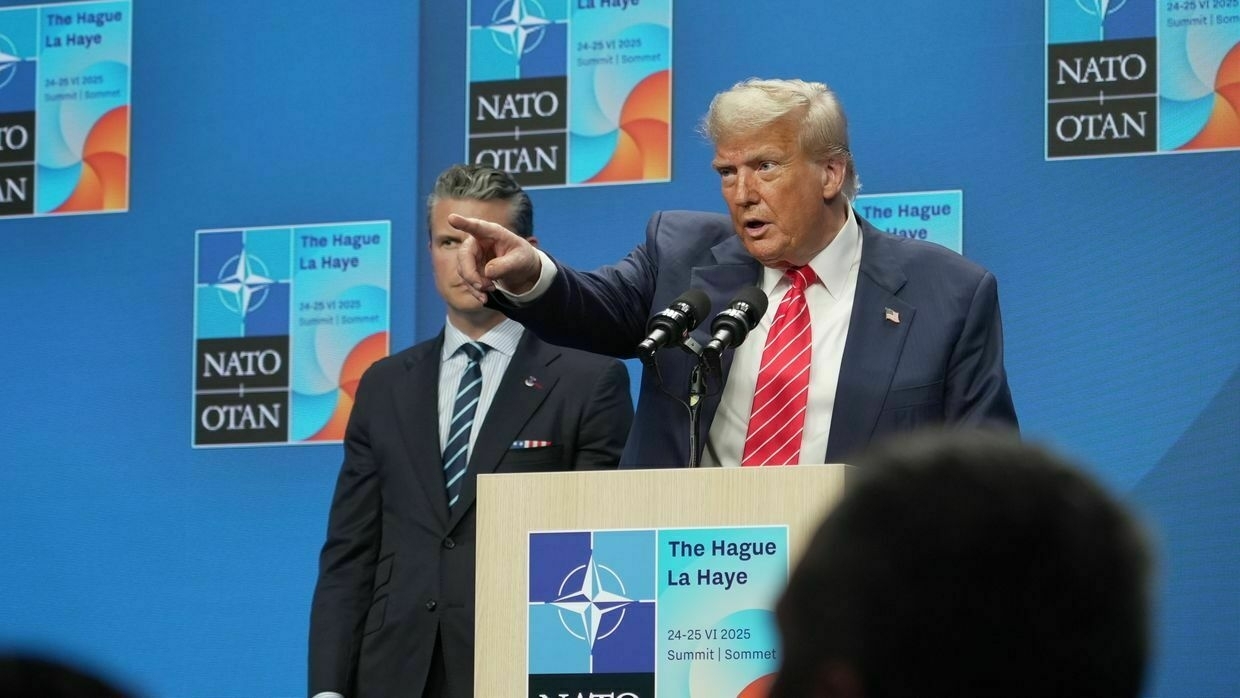
Speaking at a NATO press conference in The Hague on June 25, U.S. President Donald Trump said it was possible Russia could target other countries beside Ukraine.
When asked whether Russian President Vladimir Putin has territorial ambitions beyond Ukraine, Trump replied, “it’s possible."
“I know one thing: He (Putin) would like to settle (the war). He’d like to get out of this thing. It’s a mess for him,” he added.
Foreign officials and EU diplomats have increasingly called for the preparation for a potential full-scale conflict between NATO and Russia.
Trump’s remarks came days after President Volodymyr Zelensky said that Ukraine’s intelligence has proof that Russia is preparing new military operations in Europe and just a week after Putin declared “all of Ukraine is ours."
During The Hague summit, NATO Secretary General Mark Rutte called on alliance members to be realistic about the threats posed by Russia and China.
While Trump appeared to downplay concerns about Putin’s threat, he later said that the Russian leader “really has to end that war” against Ukraine. During his speech, he also referred to Russia’s all-out war as a “crisis,” a term used by some Russian allies but criticized by Kyiv.
“I consider him (Putin) a person I think is misguided,” Trump said.
The U.S. leader said his June 25 meeting with Zelensky, which preceded the briefing, “couldn’t have been nicer."
“I think it’s a great time to end it (war). I’m going to speak to Vladimir Putin, see if we can get it ended,” Trump said. “He (Zelensky) is fighting a brave battle, it’s a tough battle."
Separately, Trump acknowledged that Ukraine wants to receive Patriot missiles, saying that the U.S. is going to see “if we can make some available."
In recent weeks, Russia has intensified drone and missile attacks on Kyiv and other Ukrainian cities, killing and injuring hundreds of civilians.
Despite Kyiv’s appeals, Trump has dismissed the request, accusing Zelensky of “always looking to purchase missiles” and falsely blaming Ukraine for provoking the war.
NATO allies set new 5% defense spending target, reaffirm support for Ukraine, but fail to condemn RussiaThe leaders also reaffirmed support for Ukraine, stating that direct contributions to Ukraine’s defense and industrial capacity will be counted toward the 5% total.The Kyiv IndependentAnna Fratsyvir
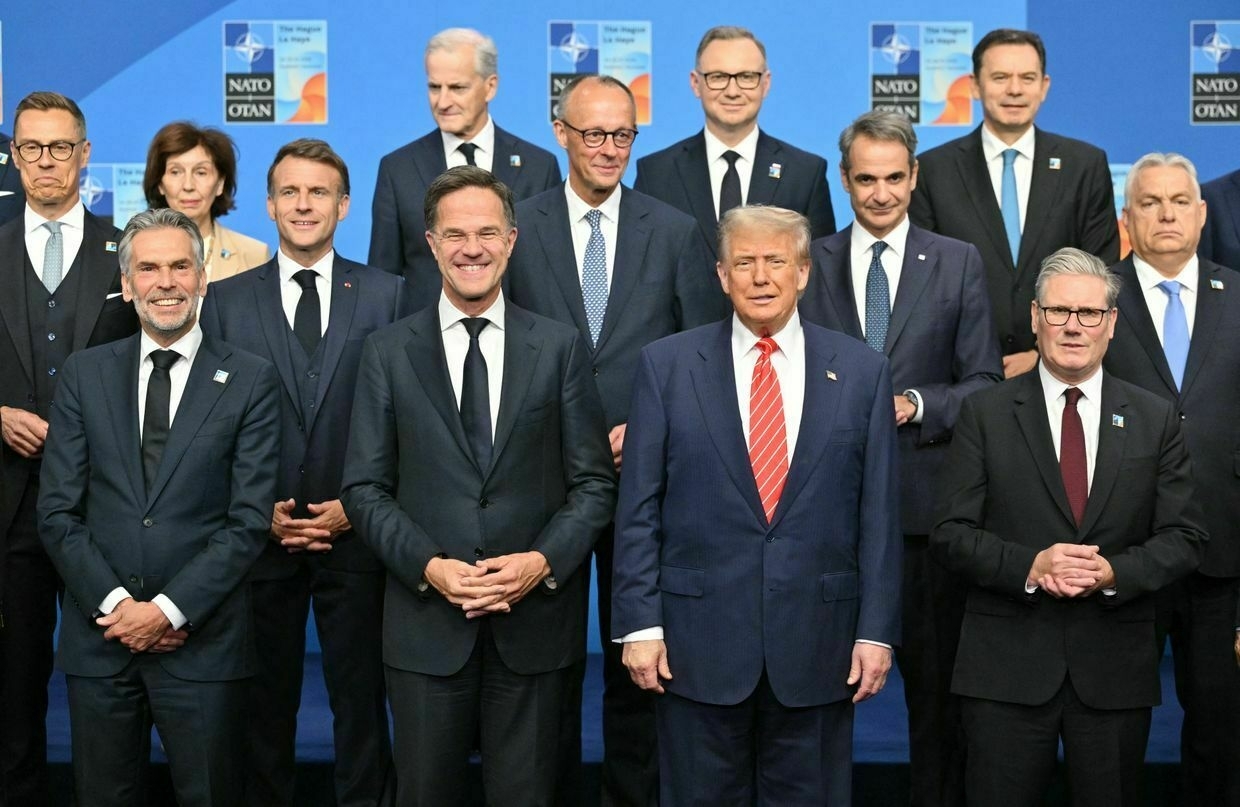
-
The most important fashion news you’ll read today.
Editor’s Note: When we say we cover all the angles of this war, that includes the inside jokes, cultural references and local chatter that make this place unique.
Want to support our journalism? Upgrade now!
Zelenskyy arrives at the NATO summit, wearing a suit. Source: Reuters.
In a rare change since the full-scale invasion began, Zelenskyy wore a classic suit.
The three-button, head-turning jacket is a leading topic of conversation today in Ukraine, with the public marveling as Zelenskyy arrived at the NATO summit in The Hague.
He is meeting today with Trump to discuss the possible purchase of American weapons.
It may seem trivial, but fashion has a critical role to play in wartime diplomatic relations. This marks an uncommon time – we can count on one hand the number – when the Ukrainian president has broken his principle of wearing military-style clothing during the full-scale invasion.
By wearing his traditional green, khaki or black shirts, he has sought to display solidarity with the troops on the ground. Until now, he had upheld this principle even during meetings with Monarchs, European leaders and the most critical negotiations held at the White House.
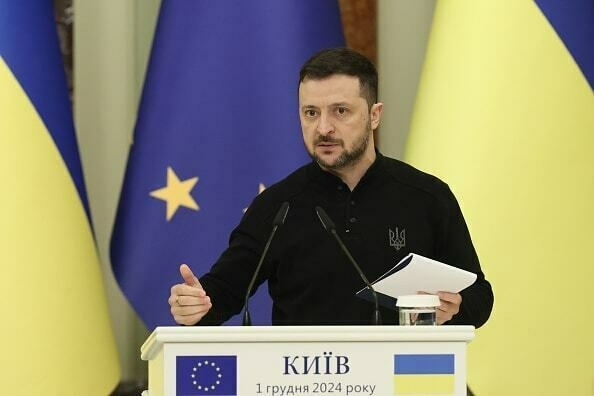
Zelenskyy wears one of his more casual shirts, emblazoned with the Ukrainian trident, after a meeting with the president of the European Council in 2024. (Photo by Viktor Kovalchuk/Global Images Ukraine via Getty Images). The Ukrainian president had a fashion capsule collection designed for him by noted Ukrainian designer Viktor Anisimov, said the Ukrainian outlet New Voice:
“It includes classic shirts, turtlenecks, T-shirts, jackets and suits. The designer's goal was to retain the military uniform, but make the outfit more formal, restrained and functional. All items are made in black.”
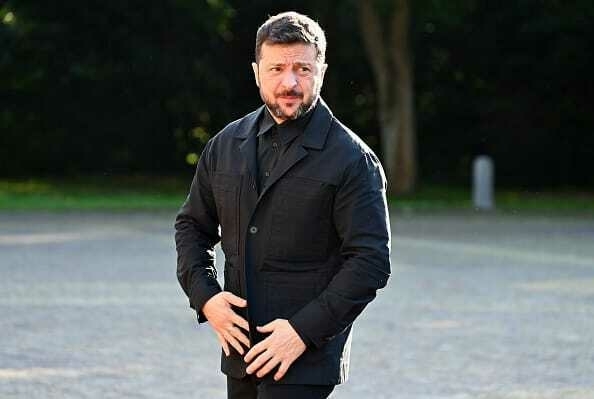
Zelenskyy arrives before an official NATO dinner on June 24, 2025 (Photo by Ansgar Haase/picture alliance via Getty Images). This signals a certain shift in attitude: Zelenskyy is ready to make this symbolic concession amid the heavy attacks that Russia is launching daily – all in the hopes that it will steer Trump back towards Ukraine.
The suit – or lack thereof – was a central point in a blowup between the two leaders back in February.
“You’re all dressed up,” Trump sarcastically remarked when he saw Zelenskyy on that remarkable day, which marked a break in U.S.-Ukraine relations and raised questions about American reliability in the Transatlantic alliance.
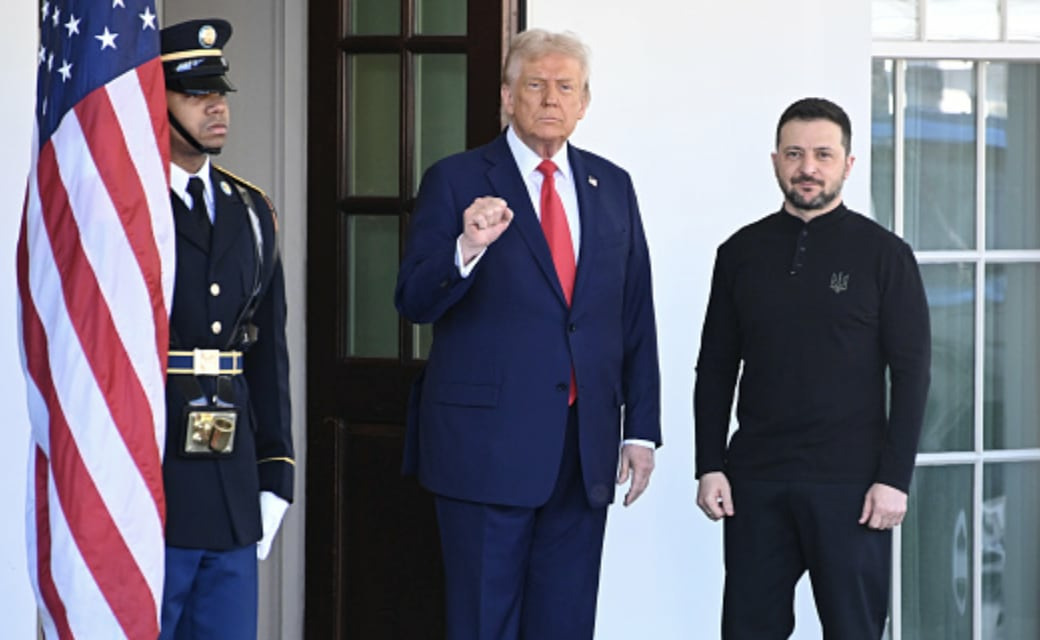
Trump greets Zelensky as he arrives at the White House on February 28, 2025. (Photo by Chen Mengtong/China News Service/VCG via Getty Images). The Oval Office spat – delaying a critical minerals deal that was set for their signatures – took place in no small part because of the Ukrainian leader’s choice of wear.
"Why don't you wear a suit? Do you own a suit?" one journalist asked. "A lot of Americans have problems with you not respecting the dress code of the Oval Office.” Vice President JD Vance was seen smirking as the question was posed.
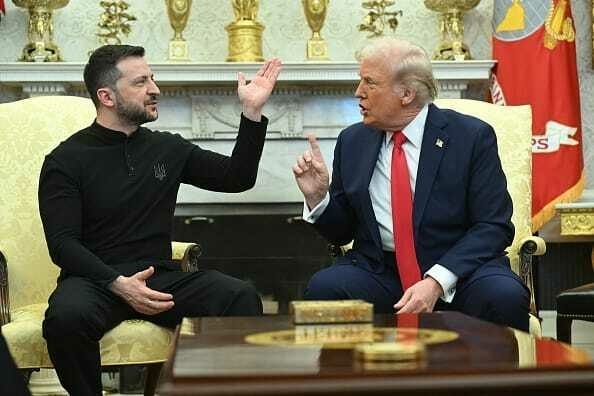
Zelensky and Trump openly clashed in the White House on February 28 at a meeting where they were due to sign a deal on sharing Ukraine's mineral riches. (Photo by SAUL LOEB/AFP via Getty Images). Trump advisors asked Zelenskyy's team multiple times that he should ditch his traditional military attire when visiting the Oval Office, and the U.S. president was irked that he didn’t wear a suit, Axios reported.
His attire was made the subject of national debate. In fact, the event even inspired a viral song: 'If Only Zelenskyy Had A Nice Suit’:
If only Zelenskyy had a nice suit / Maybe there'd be something we could do.
If only Zelensky had a nice suit/ A 10K Brioni in navy blue,
White shirt and red tie / No one else would have to die.
Ukrainians have already created numerous memes today in response to Zelenskyy breaking with his previous fashion precedent.
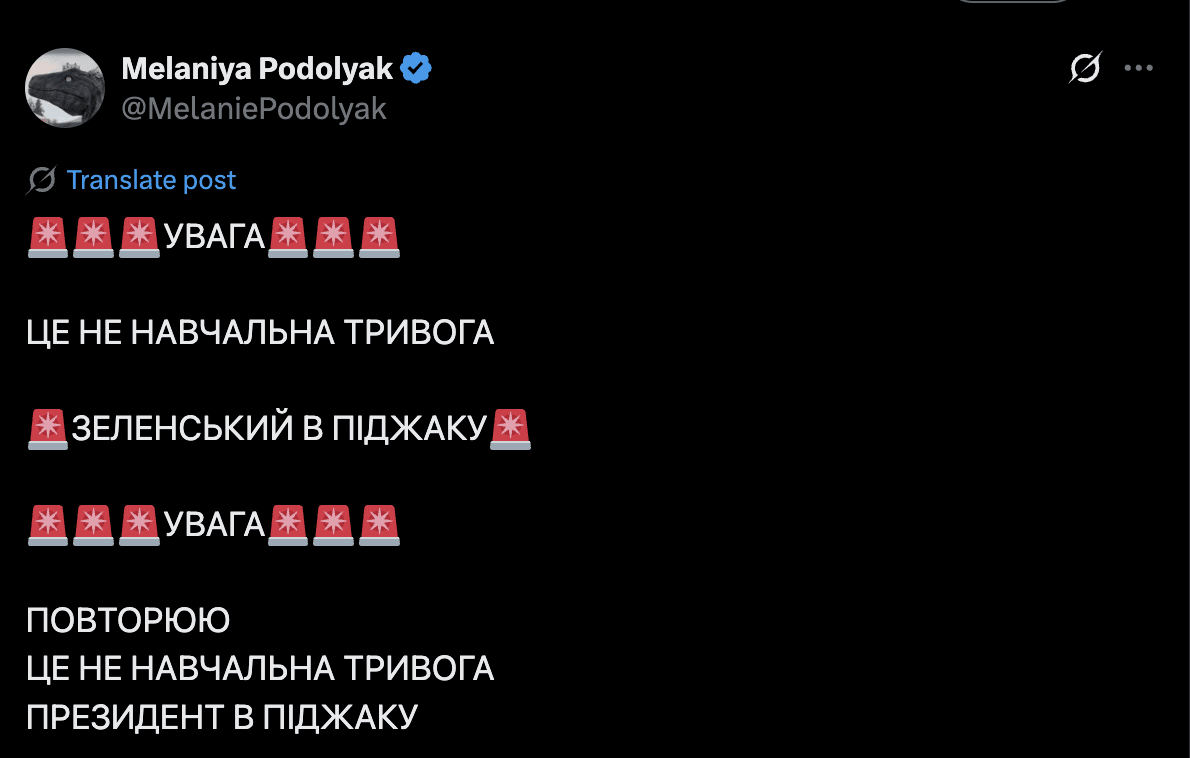
A meme that says “ATTENTION. THIS IS NOT A DRILL. ZELENSKYY IN A JACKET. ATTENTION. I REPEAT. THIS IS NOT A DRILL. THE PRESIDENT IS IN A JACKET.” Source: Melaniya Podolyak in Twitter. 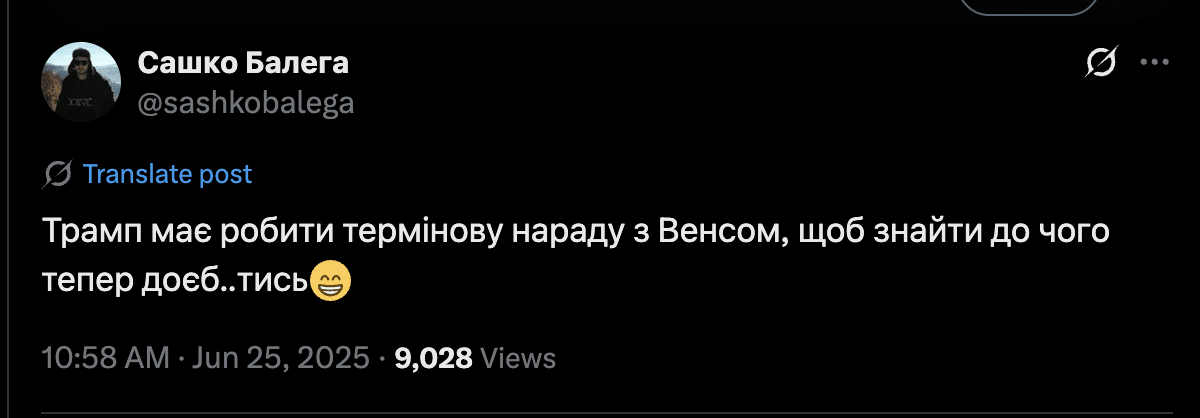
A comment that says: “Trump needs to hold an urgent meeting with Vance to figure out what to give sh*t about now.” Source: @sashkobalega in Twitter. 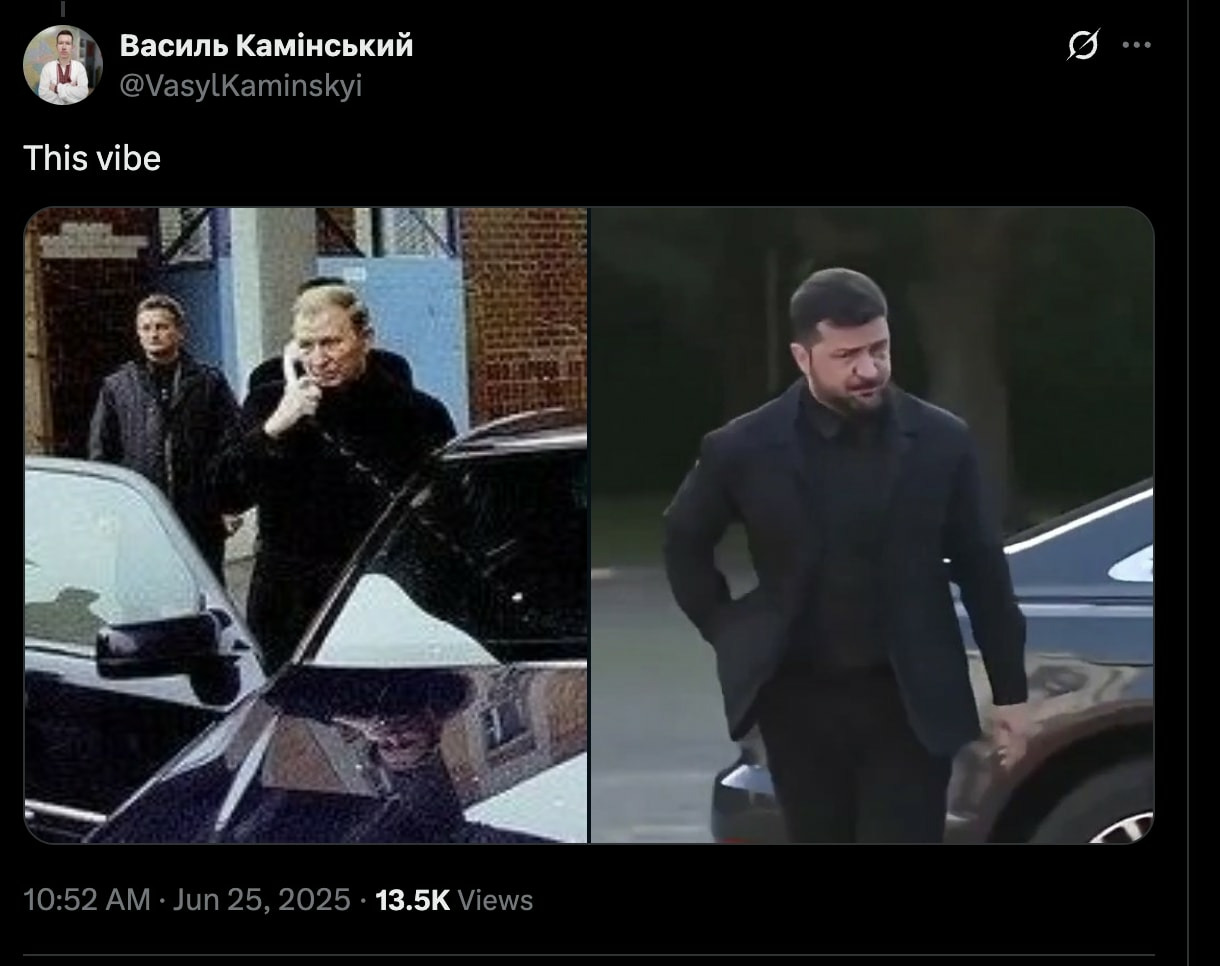
On the left side the meme shows a photo of ex-president of Ukraine Leonid Kuchma, who was famous as a deal-maker, a wheeler and dealer. Source: @VasylKaminskyi in Twitter. 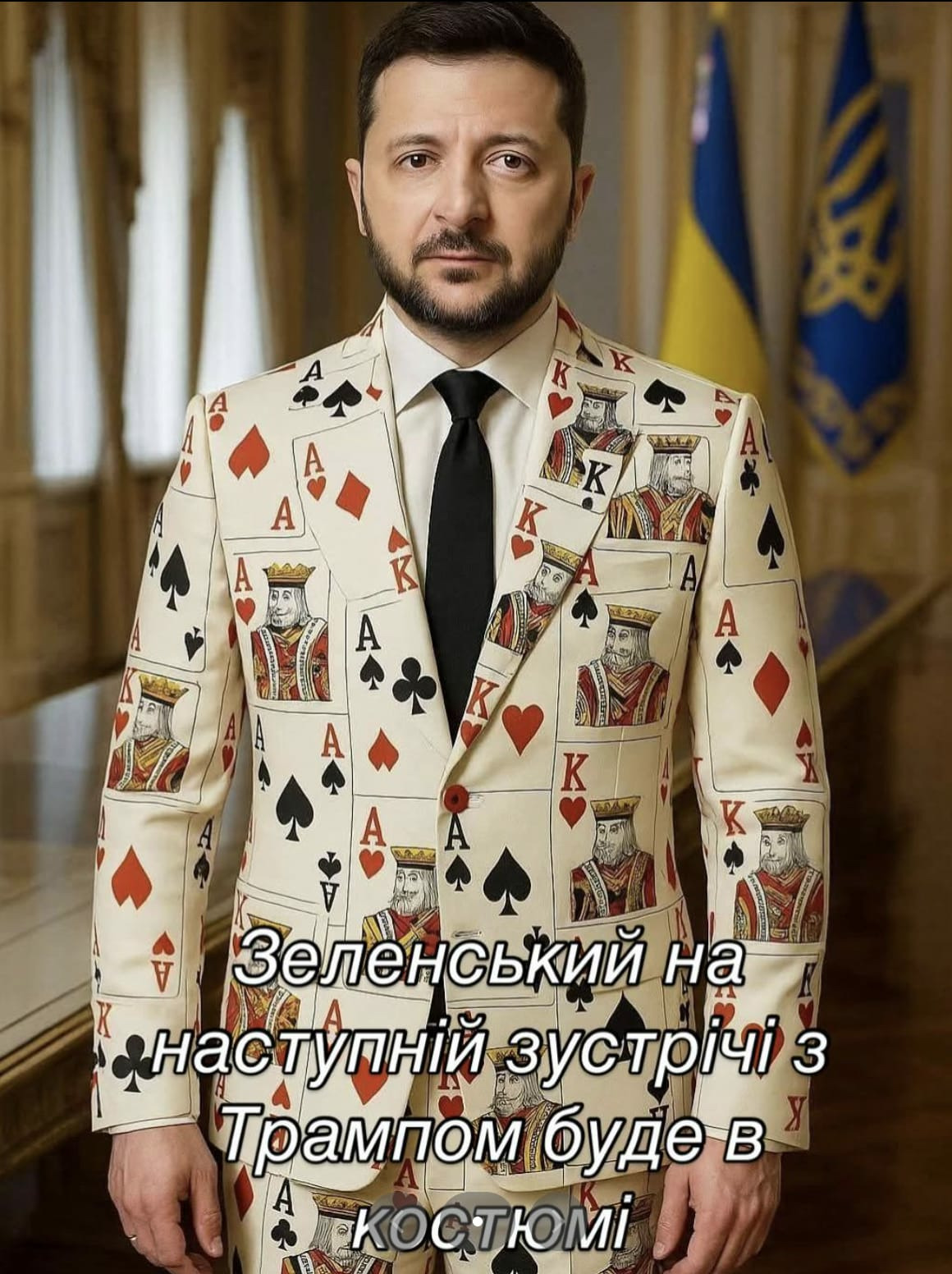
A meme says: “Zelenskyy’s look at the next meeting with Trump,” a reference to Trump’s comment that Ukraine doesn’t “have the cards.” Source: https://vm.tiktok.com/ZMS9afYVn/. The last time Zelenskyy wore a suit under normal conditions? For an address on the day of the full-scale invasion.
Zelenskyy address on the day of the invasion. Source: https://t.me/V_Zelenskiy_official/725
For critics of Zelenskyy, they’ll likely move on and criticize something else. It was never about the suit. The goal posts will soon move.
Why didn’t you wear a top hat? Do you even own a monocle?
NEWS OF THE DAY:
By: Veronika Romanova
UK BANKROLLS WEAPONRY TO KYIV WITH RUSSIAN FROZEN ASSETS: The UK will send 350 air defense missiles to Ukraine, paid for with £70 million ($88 million) from profits on frozen Russian assets. “Russia, not Ukraine, should pay the price for Putin’s barbaric and illegal war,” said PM Keir Starmer.
Originally designed as air-to-air missiles, the short-range ASRAAMs were adapted to launch from the back of British-made trucks. The development spanned more than 25 years before being adopted by the Royal Air Force in 2002.
While this marks the UK’s first direct use of Russia-linked funds to supply weapons to Ukraine, Belgium pioneered the practice in 2023, allocating profits from the frozen assets for both military and reconstruction aid.
UKRAINE, EUROPE TO OPEN TRIBUNAL FOR RUSSIAN CRIMES: After years of discussion, Ukraine’s Zelenskyy and the Council of Europe – the continent’s leading human right institution – will sign an agreement on Wednesday to establish a special tribunal to prosecute Russian leaders for war crimes since 2022. The details, including the tribunal’s exact structure and location, remain under discussion.
The special tribunal would open cases against acting presidents, prime ministers, and foreign ministers, said the Council of Europe. But it will issue warrants only when they are out of office.
The effort was backed by Japan and Canada, and was supported by the US under former President Joe Biden. In contrast, Donald Trump did not approve the move.
LEARNING FROM UKRAINE AND ISRAEL, TAIWAN PREPARES FOR POSSIBLE CHINESE ATTACK: Learning lessons from Ukraine and Israel, Taiwan will issue air-raid guidance next week in case of Chinese military strike, Reuters reported. The instructions will tell citizens what to do when air raid sirens sound – including advice for those unable to reach shelters in time or caught driving during an alert.
"Our people must know how to protect themselves, either at home or in office," an official said.
China has been claiming Taiwan as a part of its territory for a long time now, circling around and trying to isolate the island. Since Russia’s invasion of Ukraine in 2022 after similar territorial claims, fears of a Chinese assault have grown. Taiwan has since been preparing air-raid shelters in subway stations and shopping malls across the island.
THE DOG OF WAR:
Today’s Dog of War is a puppy Veronika spotted in the park – full of excitement for summer, playing on the lawn beside a passenger plane on display.
Stay safe out there.
Best,
Veronika -
Zelensky, Trump hold talks on NATO summit sidelines
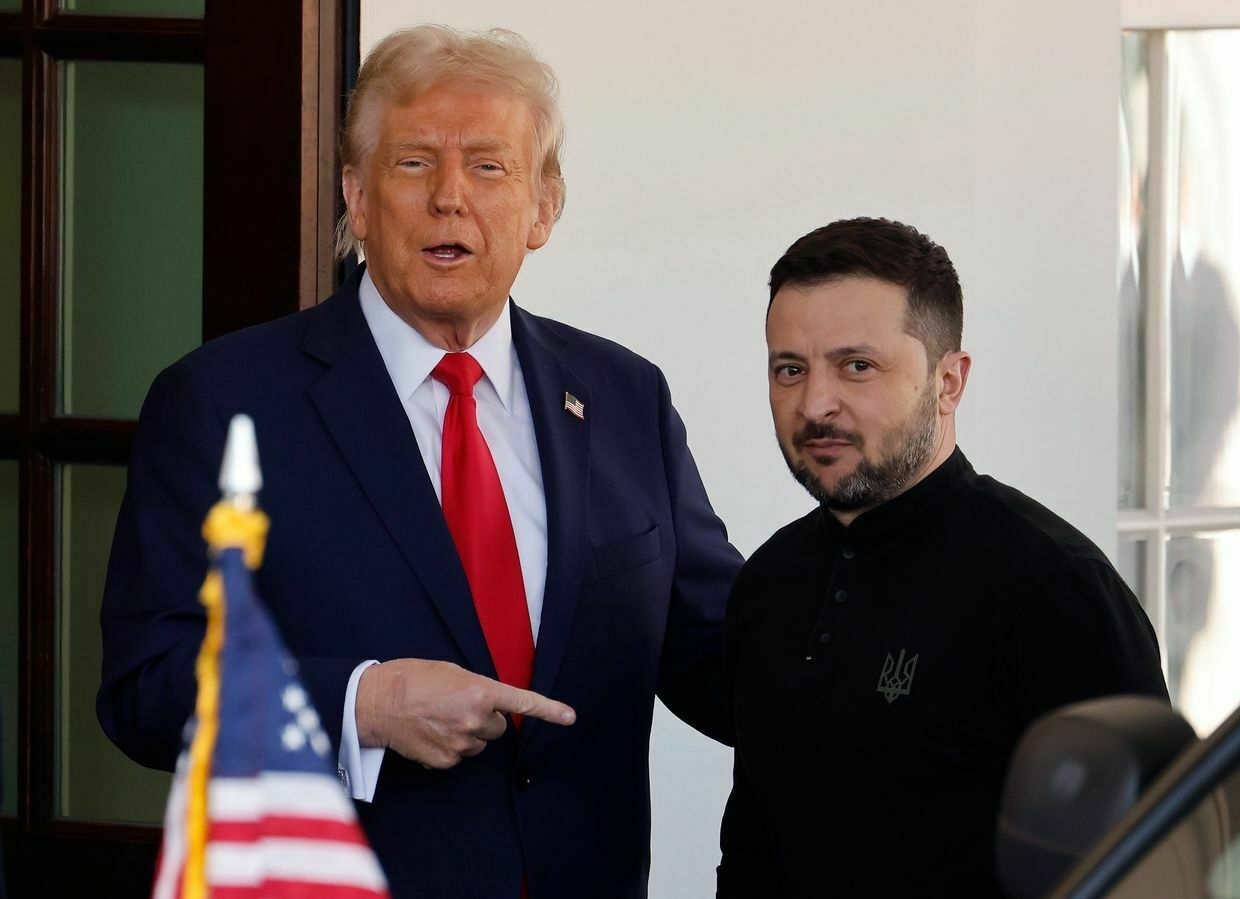
Editor’s note: This story is being updated.
President Volodymyr Zelensky met with his U.S. President Donald Trump at the NATO summit in The Hague on June 25.
The meeting lasted approximately 50 minutes, according to Suspilne. In a post on X, Zelensky described the conversation as “long and substantive."
“We covered all the truly important issues,” he wrote. “We discussed how to achieve a ceasefire and a real peace. We spoke about how to protect our people. We appreciate the attention and the readiness to help bring peace closer."
No further details have been announced.
The two leaders were expected to discuss Ukraine’s planned purchase of a new defense package, including air defense systems, as well as additional sanctions on Russia and an international price cap on Russian oil.
Speaking at a briefing earlier in the day, Trump was asked what he would be discussing during the meeting with Zelensky.
“Obviously we’ll be discussing his difficulties, he’s got a little difficulty,” the U.S. president replied without elaborating on what he meant.
The NATO summit convenes at a time when U.S. support for Kyiv is waning, and just a week after Russian President Vladimir Putin declared “all of Ukraine is ours."
This is the first meeting between the two leaders since April, when they spoke briefly on the sidelines of Pope Francis' funeral in Rome.
A planned discussion at the G7 summit earlier this month fell through after both leaders left the event early, Trump due to escalating tensions in the Middle East, and Zelensky in response to drone and missile attack on Kyiv.
Upon arriving in The Hague, Andriy Yermak, head of the Ukrainian presidential office, said on June 24 that he had held “substantive” talks with U.S. Secretary of State Marco Rubio to prepare for the Zelensky-Trump meeting, including its structure and key topics.
Zelensky is also scheduled to meet with NATO Secretary-General Mark Rutte and European Commission President Ursula von der Leyen during the summit.
In a recent interview with Sky News, Zelensky expressed uncertainty about Trump’s ties to Putin but said he believes Trump understands that Ukraine is a U.S. ally and that “the real existential enemy of America is Russia."
NATO allies set new 5% defense spending target, reaffirm support for Ukraine, but fail to condemn RussiaThe leaders also reaffirmed support for Ukraine, stating that direct contributions to Ukraine’s defense and industrial capacity will be counted toward the 5% total.The Kyiv IndependentAnna Fratsyvir
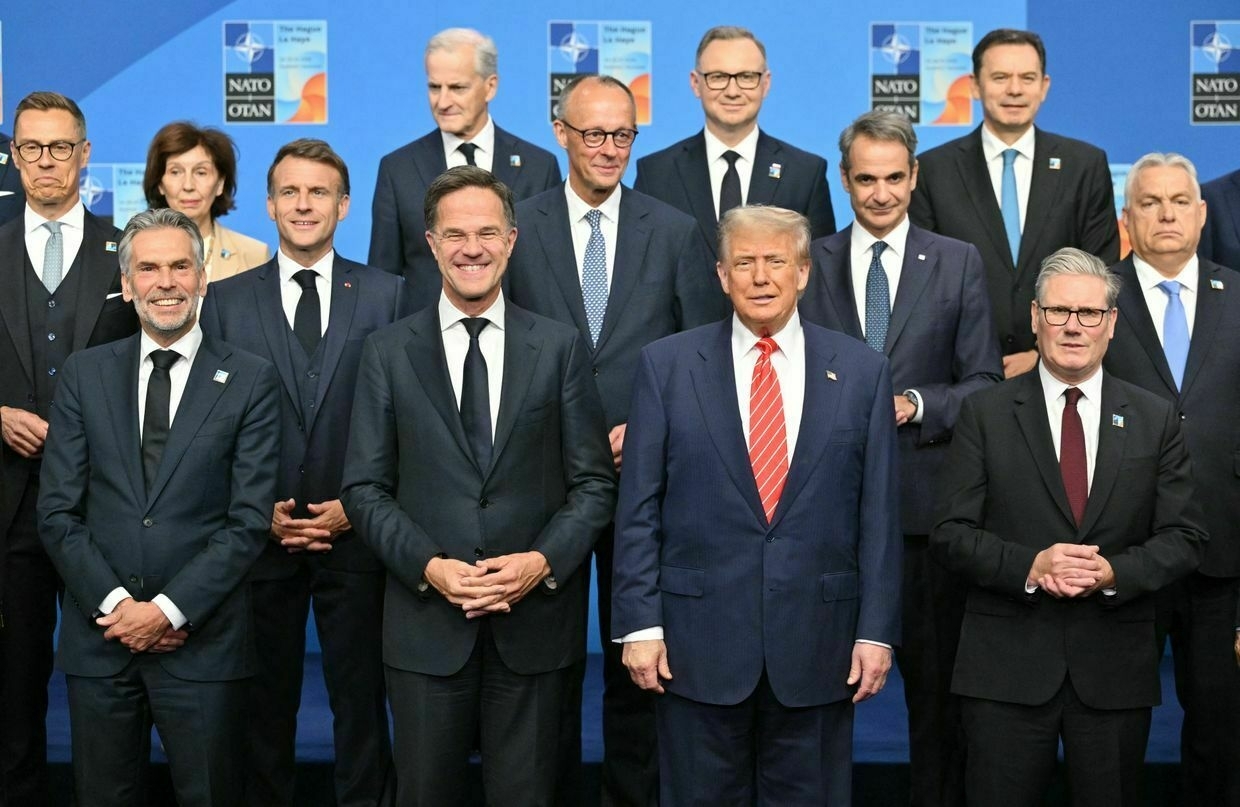
-
NATO allies set new defense spending target at 5% of GDP by 2035, reaffirm support for Ukraine
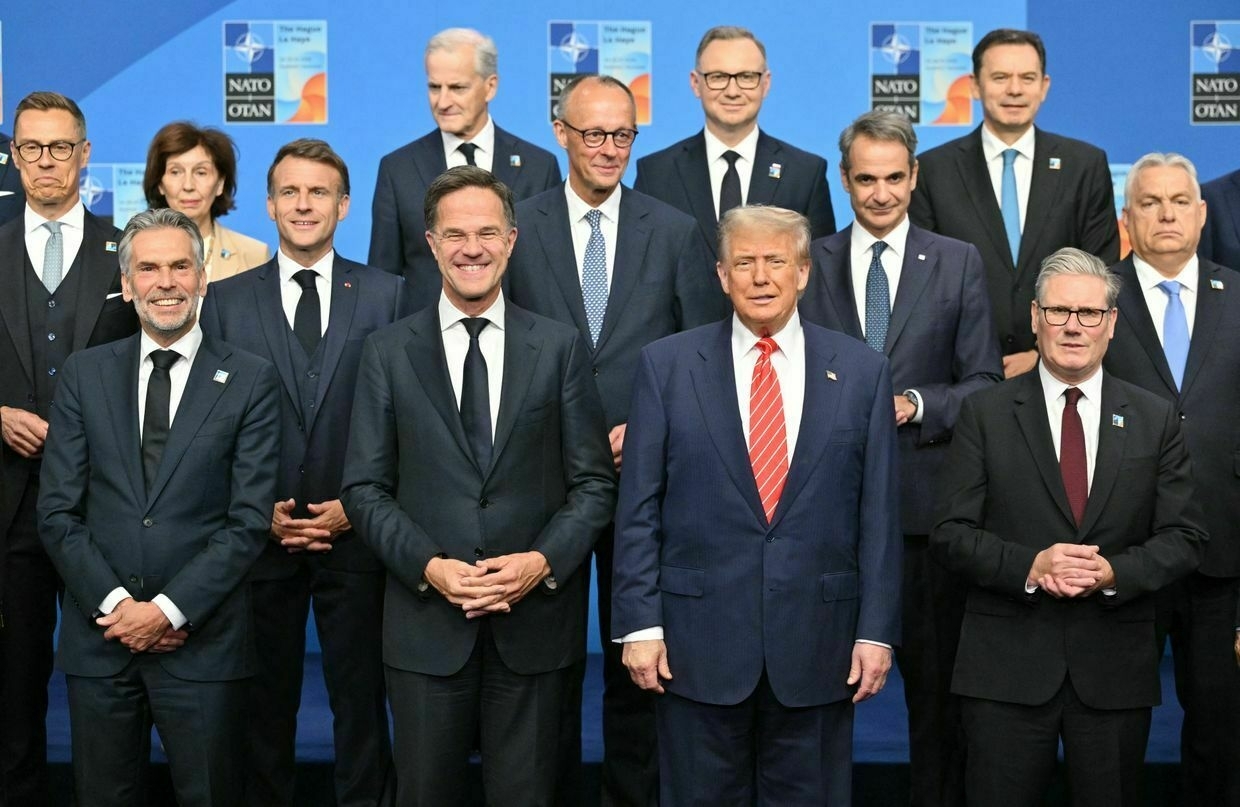
NATO member states have agreed to a new defense spending benchmark, committing to allocate 5% of their gross domestic product annually to defense and security-related expenditures by 2035, according to a joint statement released on June 25 by alliance leaders meeting in the Netherlands.
The decision marks a significant increase from the current 2% guideline and reflects the alliance’s response to the push from the U.S. and growing security threats, particularly the long-term challenge posed by Russia.
“We remain united and steadfast in our resolve to protect our one billion citizens,” the statement reads. “Allies commit to invest 5% of GDP annually on core defense requirements as well as defense and security related spending."
The leaders also reaffirmed support for Ukraine, stating that direct contributions to Ukraine’s defense and industrial capacity will be counted toward the 5% total.
Under the new framework, at least 3.5% of GDP will be directed toward core defense needs, including NATO capability targets, with the remaining 1.5% covering civil preparedness, infrastructure protection, innovation, and the defense industrial base.
Allies will submit annual plans outlining a credible path to reach the targets, with a mid-term review scheduled for 2029.
With Trump disengaged and EU complacent, Ukrainian reforms lose momentumRussia’s all-out war has accelerated Ukraine’s push to join the European Union and NATO, as well as its dependency on Western loans and aid. Before, these things would have been heavily preconditioned on Ukraine implementing crucial reforms. However, the war has also eased the pressure on Kyiv to carry outThe Kyiv IndependentOleg Sukhov
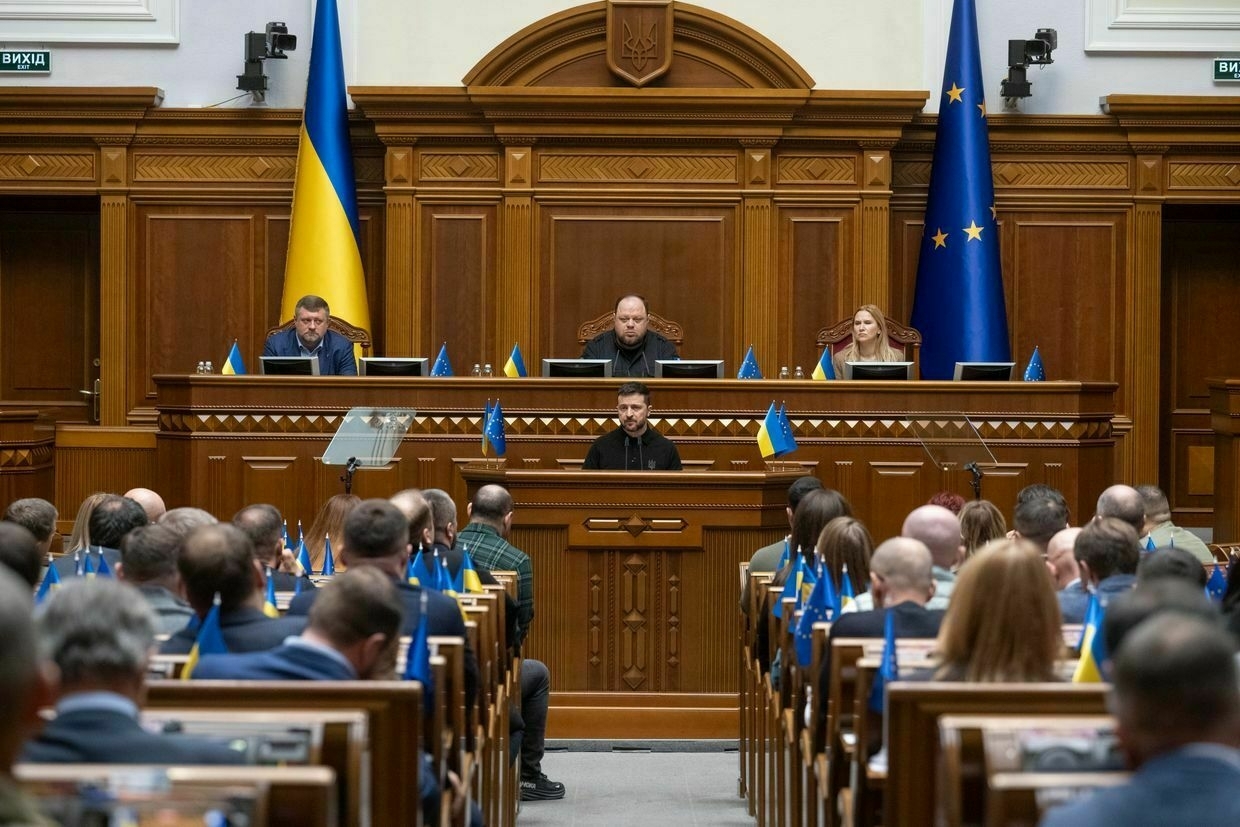
-
Trump says Zelensky is a 'nice guy,' will discuss 'his difficulties' during meeting at NATO summit
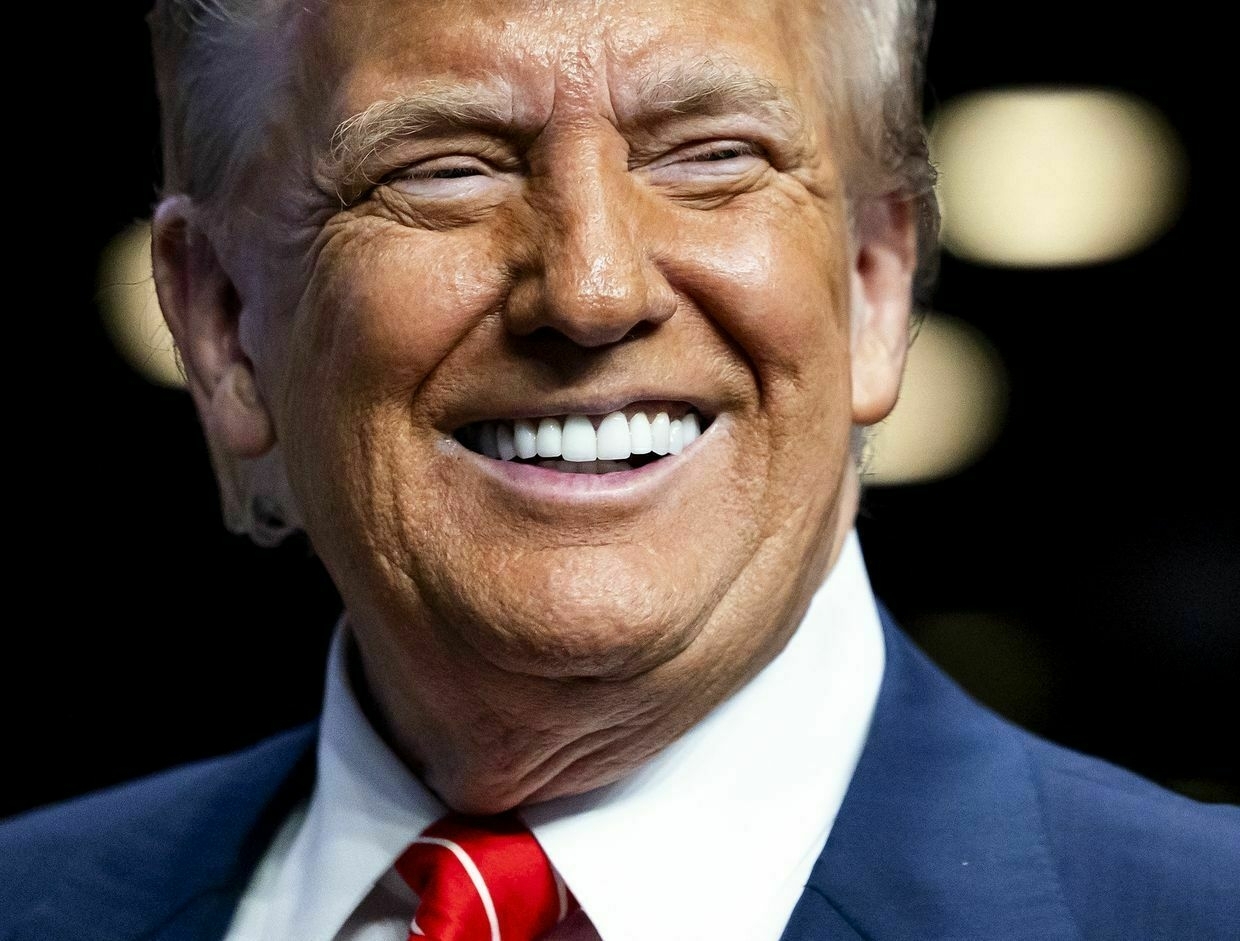
U.S. President Donald Trump has said President Volodymyr Zelensky is a “nice guy” ahead of a meeting at NATO summit in The Hague on June 25, saying they will be “discussing his difficulties."
The White House confirmed the meeting on June 24 but did not release further details. According to a diplomatic source cited by AFP, the talks between Zelensky and Trump were scheduled for early afternoon, with both sides finalizing the agenda.
The two leaders are expected to discuss Ukraine’s planned purchase of a new defense package, including air defense systems, as well as additional sanctions on Russia and an international price cap on Russian oil.
Speaking at a press briefing at The Hague on June 25, Trump was asked by a reporter what he would be discussing during the meeting with Zelensky.
“Obviously we’ll be discussing his difficulties, he’s got a little difficulty,” Trump replied.
“Zelensky is a nice guy, I’m going to meet him today. I don’t know, I assume we’re going to be discussing Ukraine. It seems the most likely,” he added.
Trump did not elaborate on what he meant by “difficulties” but the NATO summit comes at a time when U.S. support for Kyiv is waning, and just a week after Russian President Vladimir Putin declared “all of Ukraine is ours."
This will be the first meeting between Zelensky and Trump since April, when they spoke briefly on the sidelines of Pope Francis' funeral in Rome.
A planned discussion at the G7 summit earlier this month fell through after both leaders left the event early, Trump due to escalating tensions in the Middle East, and Zelensky in response to drone and missile attack on Kyiv.
Upon arriving in The Hague on Monday, Andriy Yermak, head of the Ukrainian presidential office, said he held “substantive” talks with U.S. Secretary of State Marco Rubio to prepare for the Zelensky-Trump meeting, including its structure and key topics.
Zelensky is also scheduled to meet with NATO Secretary-General Mark Rutte and European Commission President Ursula von der Leyen during the summit.
In a recent interview with Sky News, Zelensky expressed uncertainty about Trump’s ties to Putin but said he believes Trump understands that Ukraine is a U.S. ally and that “the real existential enemy of America is Russia."
Investigation: How Russia prepares its strategic missile plant for ‘eternal war’Key findings: * Despite international sanctions, Russia’s strategic missile plant was able to import complex machinery to dramatically increase missile production. * The Kyiv Independent has identified the equipment supplied to the plant, as well as the supply chains, mostly from China. * We located the plant’s new premises, built to house theThe Kyiv IndependentAlisa Yurchenko
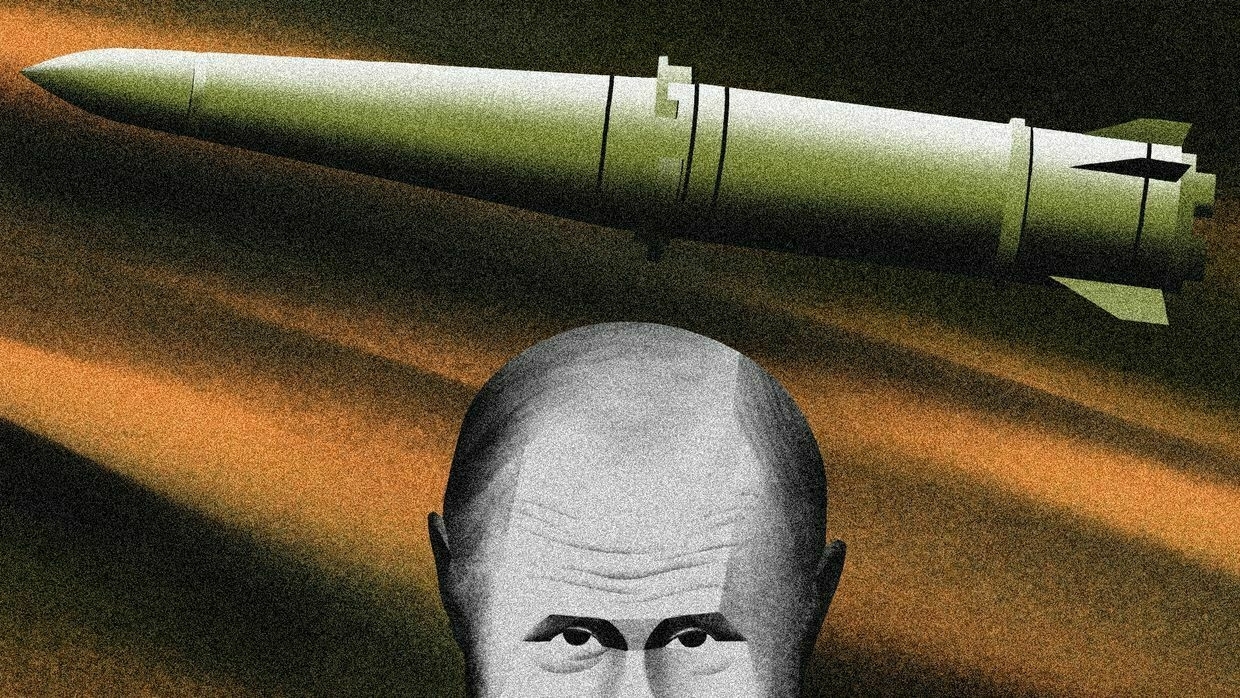
-
Little-known casualty of the war — Ukraine's reforms
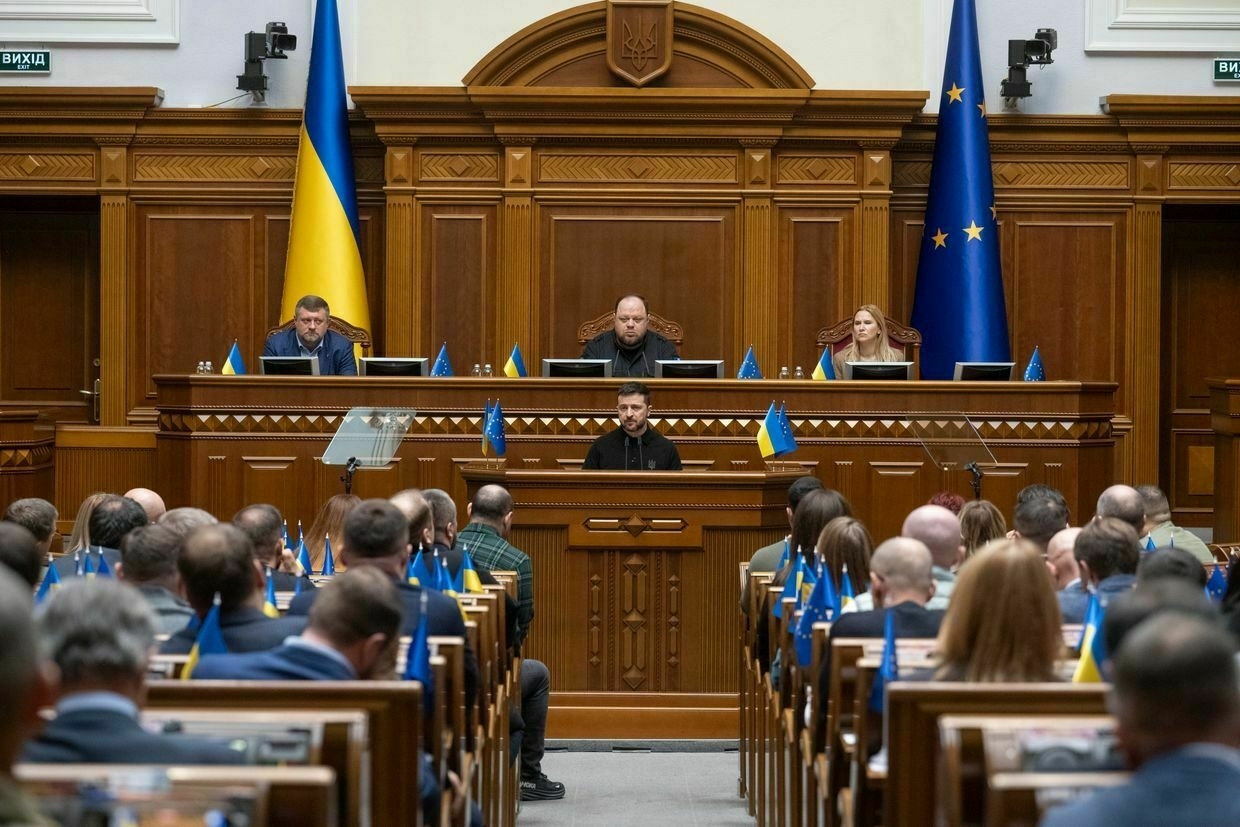
Russia’s all-out war has accelerated Ukraine’s push to join the European Union and NATO, as well as its dependency on Western loans and aid.
Before, these things would have been heavily preconditioned on Ukraine implementing crucial reforms.
However, the war has also eased the pressure on Kyiv to carry out reforms — stalling the country’s progress in advancing anti-corruption programs and reforming law enforcement.
The key reason is that Ukraine’s formerly demanding Western backers have preferred not to set strict conditions for a country at war.
U.S. President Donald Trump’s administration has shown little interest in Ukraine, and even less interest in the country’s domestic reforms.
The European Union has also been lenient on law enforcement and anti-corruption reforms in Ukraine, several members of Ukraine’s parliament and civil society told the Kyiv Independent.
The sources said that this soft-touch approach has backfired, leaving Ukrainians with either half-baked or failed reforms in crucial sectors.
Some sources spoke on condition of anonymity due to the sensitivity of the issue: they were raising concerns about the lack of pressure on their country to implement reforms during war.
Ukraine’s anti-corruption bureau makes progress yet doesn’t take on top presidential alliesAs Ukraine’s civil society and the country’s Western partners call on the authorities to fight corruption amid Russia’s full-scale invasion, the National Anti-Corruption Bureau of Ukraine (NABU) is showing mixed results. A year has passed since Semen Kryvonos became the head of the NABU in March 2023, replacing the bureau’The Kyiv IndependentOleg Sukhov
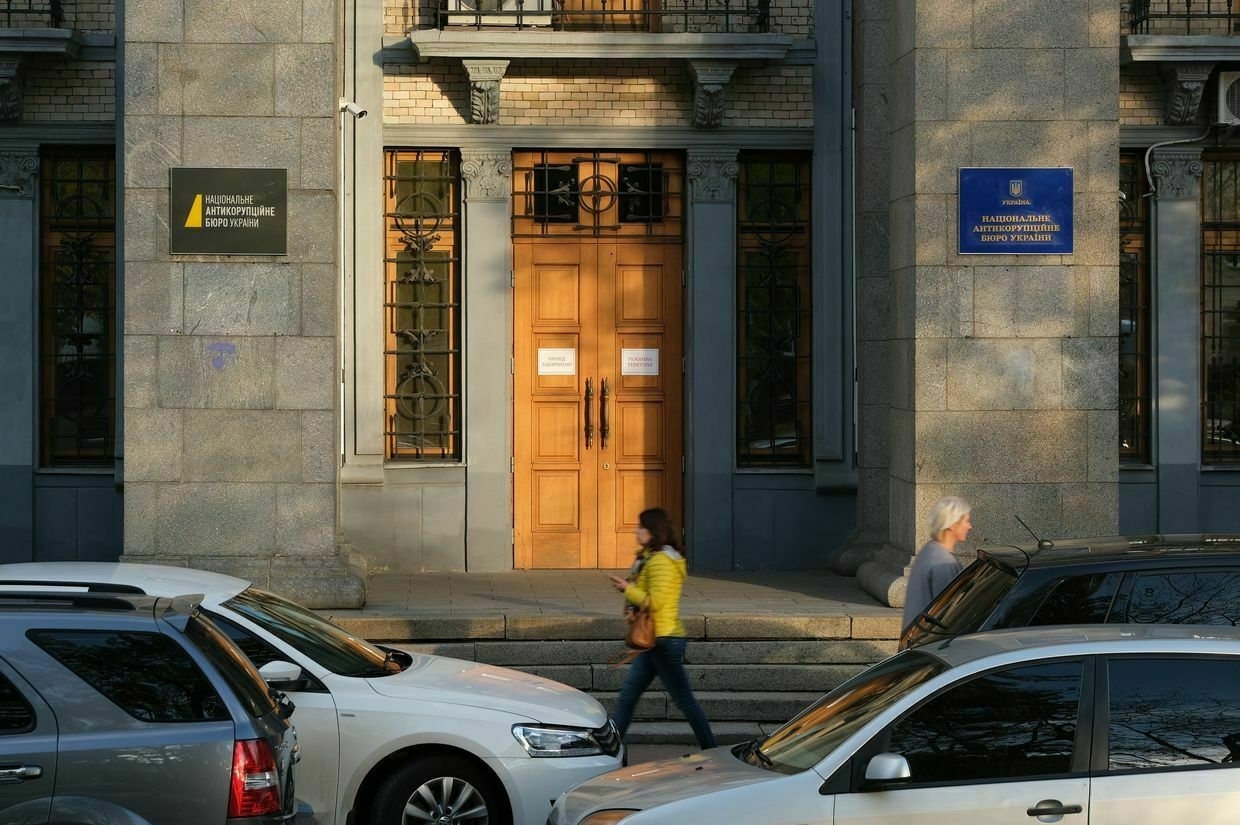
All eyes on accessionThe West’s leverage over reforms in Ukraine traditionally stems from financial assistance given to Kyiv by the U.S., the EU, and the International Monetary Fund (IMF), as well as from Ukraine’s aspirations to join the EU and the conditions it must meet to do so.
The European Union granted Ukraine candidate status in 2022 and approved launching accession talks with Kyiv in 2024 despite several botched reforms. The decision was mainly seen as a political move in support of the country as it struggles to withstand Russia’s ongoing onslaught.
Still, anti-corruption activists and experts hope that Ukraine’s European integration will be a push for a number of critical reforms.
A European official leading the process, who spoke on condition of anonymity, admitted to the Kyiv Independent that the EU had been soft on Ukraine before the EU accession negotiations had been approved.
The source argued, though, that the strategy would change radically due to the European Union’s stronger leverage that comes with accession talks. The EU will closely track Ukraine’s progress on reforms and will agree to Kyiv’s accession to the bloc only if there is meaningful and fundamental change, according to the source.
The accession talks formally began in June 2024. However, they have proceeded slowly and have been derailed by political obstruction from within the Union.
Olha Stefanishyna, Ukraine’s deputy prime minister for European integration, denied the accusations that the country’s authorities are sabotaging reforms needed for EU accession.
The EU and U.S. embassies, as well as the International Monetary Fund and Ukraine’s President’s Office, did not respond to requests for comment.
The West’s demands have played a key role in driving critical Ukrainian reforms that kicked off after the pro-Western 2014 EuroMaidan Revolution, which ousted a pro-Russian president and his corrupt government.
Specifically, the U.S. and EU helped Ukraine to set up and develop anti-corruption institutions, including the National Anti-Corruption Bureau of Ukraine (NABU), the Special Anti-Corruption Prosecutor’s Office (SAPO), the High Anti-Corruption Court, and the National Agency for Corruption Prevention (NACP).
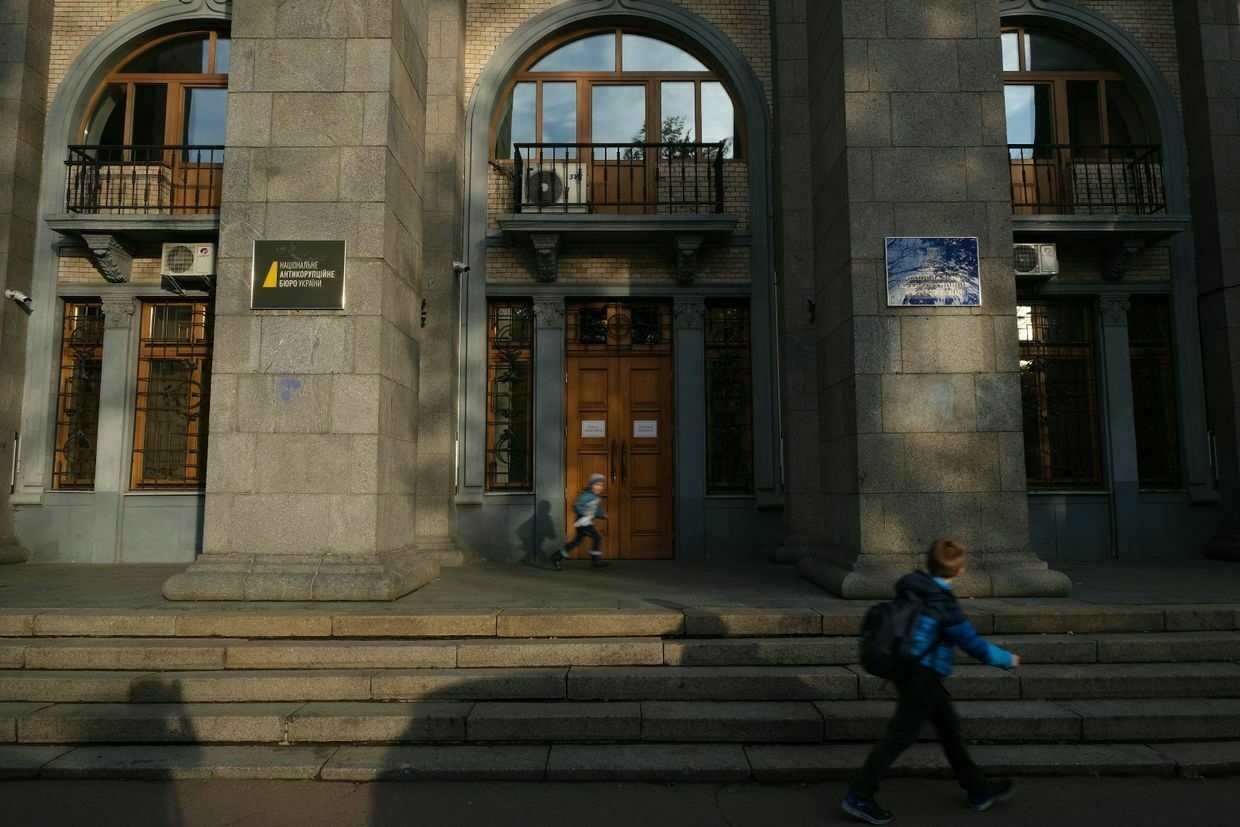
Children walk past the offices of the National Anti-Corruption Bureau of Ukraine (NABU) in Kyiv, Ukraine, on Oct. 1, 2019. (Sean Gallup / Getty Images) When the EU approved Ukraine’s candidate bid in 2022, its accession conditions also played a major role in reforms, Kateryna Butko, head of anti-corruption watchdog AutoMaidan, told the Kyiv Independent. Specifically, the EU urged Ukraine to speed up the selection of a new chief anti-corruption prosecutor and fill in Constitutional Court jobs with the participation of international experts, she said.
Ukraine’s judicial reform relaunch shows mixed results so farIn late 2023, Ukraine finally re-launched the process of vetting judges as part of a long anticipated judicial reform – a key condition for Ukraine’s accession to the European Union. Four months later, the results are mixed. On the one hand, the High Qualification Commission, a top judicial body, has approvedThe Kyiv IndependentOleg Sukhov
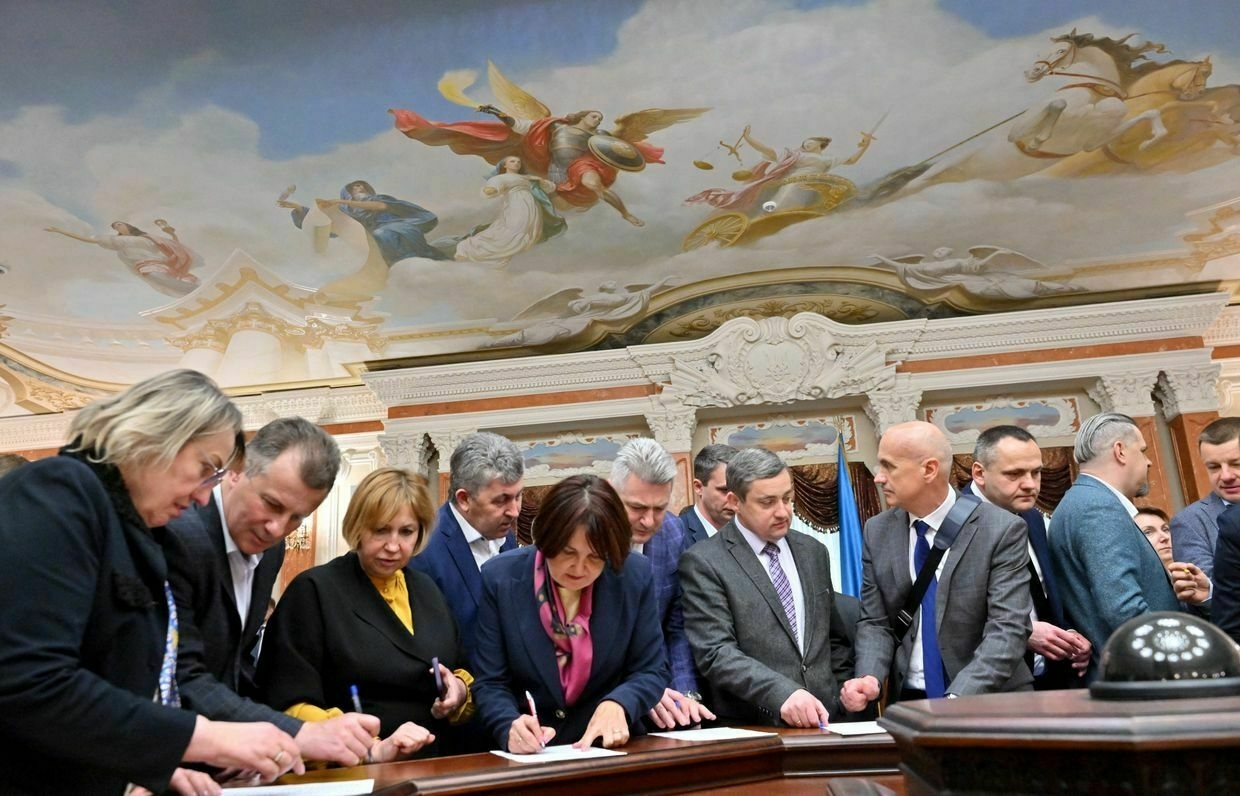
Exploiting the West’s weaknessThe all-out war forced the EU into a difficult dilemma.
“On the one hand, (the Europeans) want reforms,” Yaroslav Yurchyshyn, a lawmaker from the opposition Holos party, told the Kyiv Independent. “On the other hand, they understand that we are protecting them (by fighting Russia). Meanwhile, our authorities have a ready excuse for everything — ‘We’re at war, why are you bothering us?'"
He said that the Ukrainian authorities fulfilled some of the West’s requirements at the beginning of the full-scale invasion, but “as time went on, the authorities explained all reform failures by appealing to the war effort."
“EU’s position is weak, and it allows our government to deceive it.”
As a result, there is a major delay in reforms, Yurchyshyn said.
"Since late 2023, it's been mostly imitation," he said. "Now, it's almost total imitation."
He said that some technical changes demanded by the EU were being implemented, but there was no progress on fundamental and "politically sensitive" reforms.
Yaroslav Zheleznyak, another lawmaker from Holos, also said that the "EU's position is weak, and it allows our government to deceive it."
Larysa Golnyk, a whistleblower judge who has exposed corruption, and Vitaly Tytych, former head of the judicial watchdog Public Integrity Council, also share this opinion.
Political uncertainty in the U.S. following Trump's election is not helping Ukrainian reforms either.
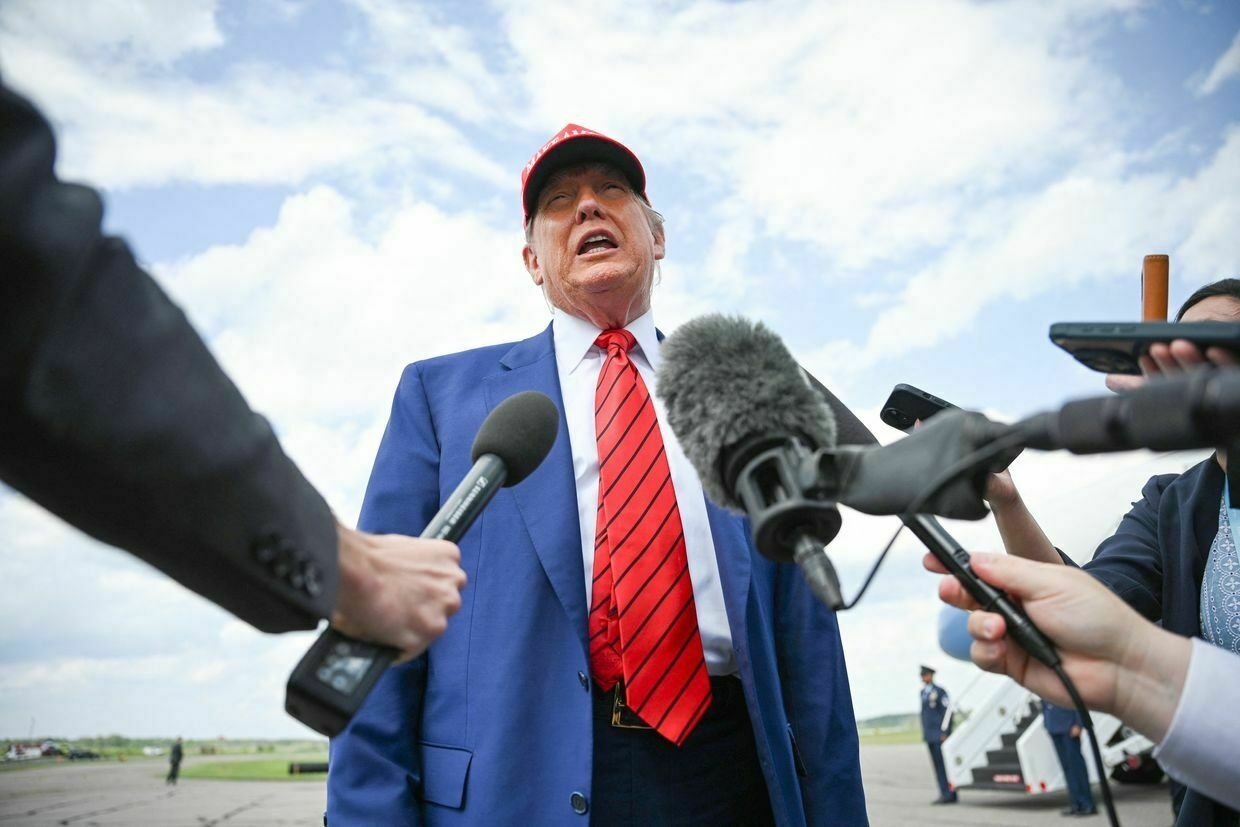
U.S. President Donald Trump speaks to the press upon arrival at Morristown Municipal Airport in Morristown, New Jersey, U.S. on June 20, 2025. (Mandel Ngan / AFP via Getty Images) After taking office on Jan. 20, Trump froze funding for the U.S. Agency for International Development (USAID), which had financed the implementation of rule of law reforms in Ukraine. The Trump administration has also announced plans to dismantle USAID completely.
"After Trump was elected, the U.S. pulled out of Ukrainian reform processes," Yurchyshyn said. "Now they're mostly observers."
Meanwhile, Zheleznyak said that "after Trump was elected, our (Western) partners have lost appetite for reforms."
"Our authorities interpreted this as carte blanche to do anything they want," he added.
How Ukrainian officials get away with having Russian citizenship – even amid warAs Russia is waging its war against Ukraine, some high-ranking Ukrainian officials with confirmed or suspected Russian citizenship are doing fine. Ukraine’s Constitution bans foreign citizenship for officials. However, in some cases, officials with Russian citizenship are not fired at all, and in other cases Ukraine’s judiciary stubbornly resists theirThe Kyiv IndependentOleg Sukhov
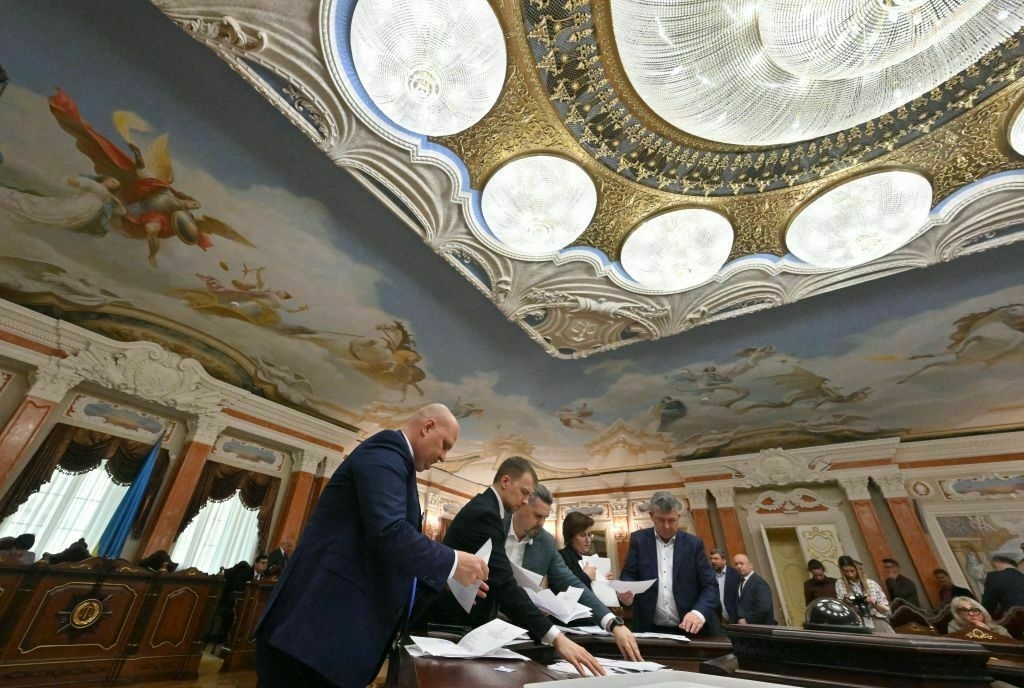
International experts' roleOne example of stalled reforms is an ongoing effort by Ukrainian authorities to reduce the role of international experts on supervisory boards and selection panels in key law enforcement and procurement agencies, several sources in Ukraine's parliament and civil society told the Kyiv Independent.
Ukrainian officials on selection panels have often backed controversial candidates for top government jobs, and international experts have been invited to offset their role. Foreign experts' function is to check the integrity, independence and professionalism of candidates for key positions.
Deputy Prime Minister Stefanishyna said in parliament on Dec. 6 that Ukrainian authorities were planning to eventually stop using international experts in the process of selecting governing officials because Ukraine would allegedly be reformed enough to cope on its own.
Meanwhile, President Volodymyr Zelensky's Deputy Chief of Staff Iryna Mudra said at a meeting of parliament's legal policy and justice committee on Jan. 8 that international experts should play an advisory role rather than make decisions.
Ukraine's Western partners appear to have turned a blind eye.
A civil society source who has spent years pushing for judicial reforms said that the participation of international experts "is supposed to uphold the rule of law but the EU is backing down and making concessions."
The source spoke on condition of anonymity due to the sensitive nature of the subject.
"If they continue doing this, then we can forget about any real rule of law," the source added.
Specifically, Katarína Mathernová, the EU ambassador to Ukraine, has herself stated that Ukraine may not need international experts with a casting vote, according to the source. Mathernová did not respond to a request for comment.
The authority of international experts on the selection panels for the High Qualification Commission, a judicial governing body, and the High Anti-Corruption Court is set to expire in June and November, respectively.
There is a risk that their powers will not be extended, one of the civil society sources said.
Stefanishyna told the Kyiv Independent that the Ukrainian authorities have "no intention whatsoever of shutting down the existing selection processes" with the participation of international experts.
She also argued that, eventually, Ukraine's institutions would have to function without foreign experts.
"EU member states and the U.S. should not have to think about how judges are being selected (in Ukraine)," she said. "A system must be in place that is trusted, with a clear process, and those institutions must function."
Watchdogs say Ukraine’s judicial reform on brink of catastropheUkraine’s leading anti-corruption watchdogs issued a statement on June 24 saying that the Ethics Council, the judicial reform’s main body, has undermined trust in the process by approving tainted candidates for top jobs and vetoing an anti-corruption crusader. “Since the Ethics Council’s decisions are concealed and there isThe Kyiv IndependentOleg Sukhov
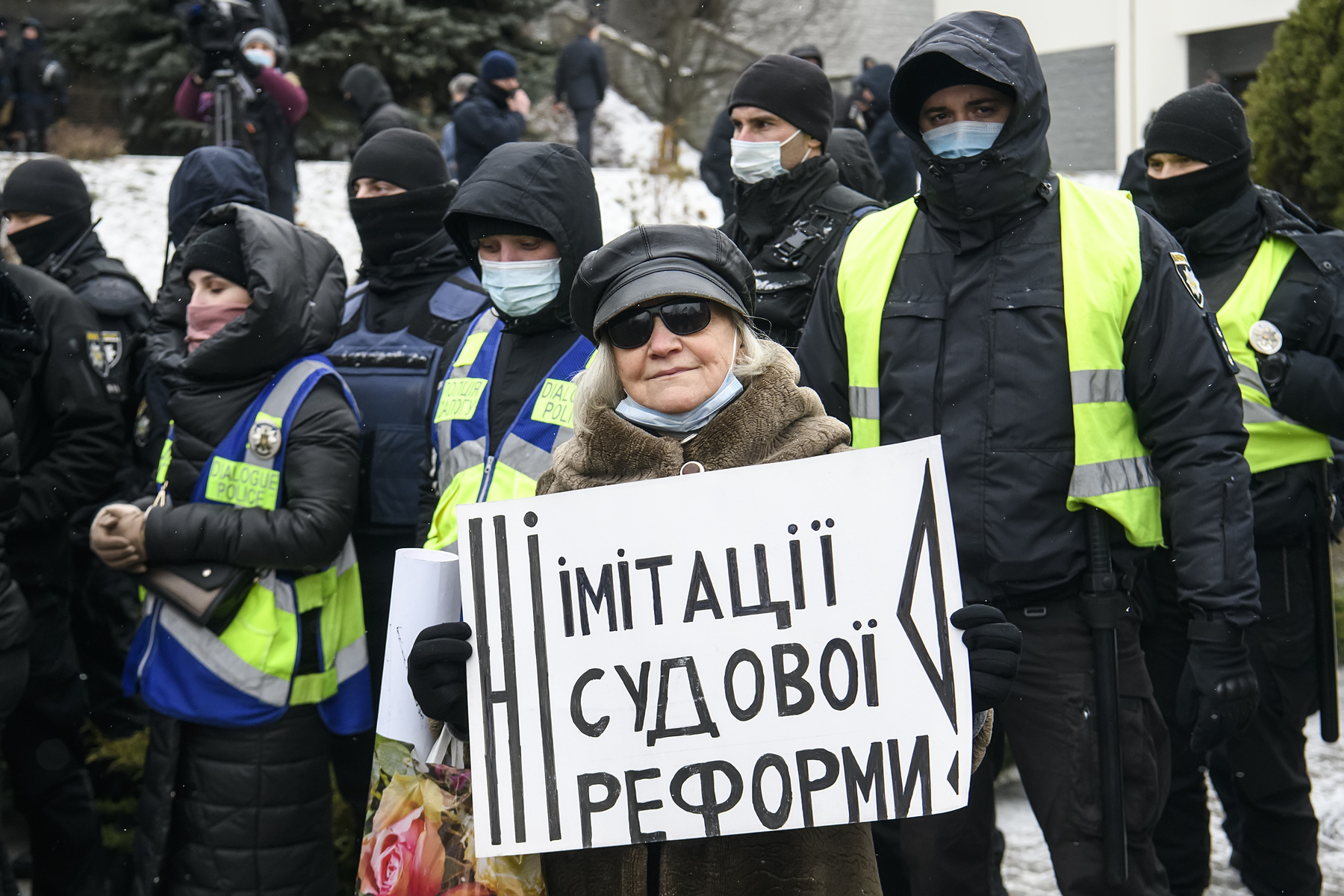
Botched judicial reformsOne example of a recently botched reform is the creation of the High Administrative Court, which is expected to play a crucial role by considering appeals against decisions made by government bodies. The court is expected to replace the discredited Kyiv District Administrative Court, which was liquidated in 2022 amid corruption investigations against its controversial ex-chairman, Pavlo Vovk.
Initially, Ukraine's international partners suggested that a panel fully consisting of foreign experts vet candidates for the High Administrative Court.
However, the Ukrainian government prepared a bill with a weaker role for international experts. Under that bill, candidates can be vetoed by a joint meeting of the High Qualification Commission and a panel that includes three Ukrainian experts and three international experts.
"The role of international experts has been completely watered down," one of the civil society sources told the Kyiv Independent.
The source said that, under the bill, it would be much harder for international experts to "stand their ground," given their diluted role.
In January the parliament went further and approved the first reading of a different bill, not supported by the Cabinet, creating a High Administrative Court without the participation of international experts at all.
Following a public outcry, the parliament backed down and approved the previous version of the bill in February, envisaging a panel with three Ukrainian experts and three foreign ones.
Another failed reform involves the Supreme Court.
Supreme Court judges have been involved in numerous scandals and controversies and faced accusations of corruption and other violations.
In 2022, the court's deputy chairman, Bohdan Lvov, was fired after his concealed Russian citizenship surfaced.
Vsevolod Kniaziev, then the court's chairman, was charged with accepting a $2.7 million bribe in 2023.
As a result, the judicial watchdog Dejure and other activists have called for inviting a panel of international experts to conduct integrity checks of Supreme Court judges.
On June 3, parliament ignored these calls and passed the first reading of a judicial reform bill that does not envisage integrity checks for Supreme Court judges with the participation of international experts.
Ukraine’s anti-corruption bureau under fire over its handling of leak scandalThe National Anti-Corruption Bureau of Ukraine (NABU) has come under fire as more details emerged over the past weeks about leaks from the bureau and its handling of the scandal. For nearly a month, the country’s key anti-corruption agency has been in turbulence. In late May, it was revealedThe Kyiv IndependentOleg Sukhov
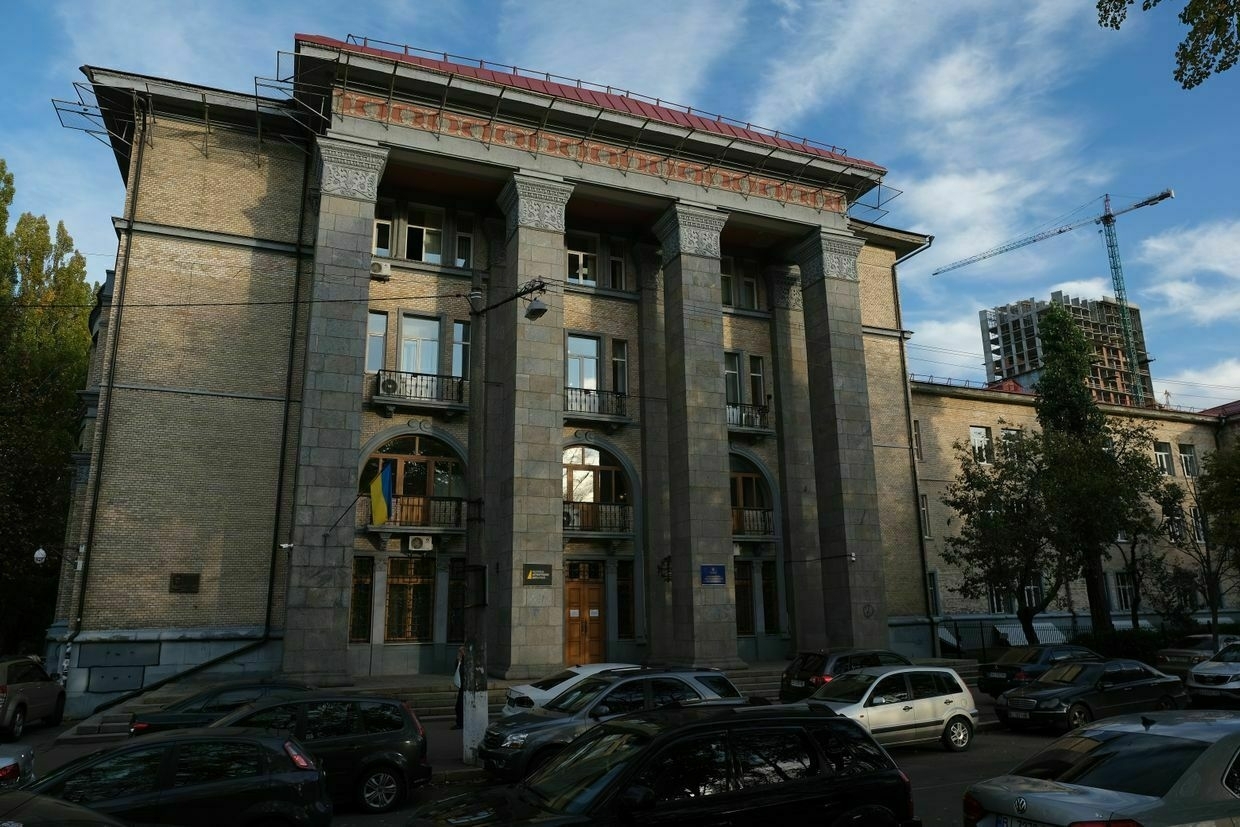
A backlog of stalled reformsUkraine's Western partners have also demanded a reform of the Security Service of Ukraine (SBU) for years. The reform envisages stripping the successor of the Soviet Union's KGB of investigative functions, including the ability to investigate economic crimes and corruption and refocus the security service exclusively on counter-intelligence and anti-terrorism.
Investigating economic crimes is seen as vulnerable to corruption, with international observers arguing that the highly militarized Security Service is the wrong body to hold a monopoly over such cases.
The Security Service was formally stripped of the power to investigate corruption in 2015 and economic crimes in 2021, with the functions passing to the National Anti-Corruption Bureau of Ukraine (NABU) and the Economic Security Bureau, respectively.
However, the SBU is managing to bypass this restriction. Prosecutors still routinely allow the SBU to investigate economic crimes and corruption jointly with other law enforcement agencies.
In 2021, the parliament passed in the first reading a bill stripping the SBU of all investigative functions but the bill has seen no progress since then.
One of the sources told the Kyiv Independent that "when the Russian invasion began, any moves toward reforming the SBU were essentially put on hold by parliament and all stakeholders."
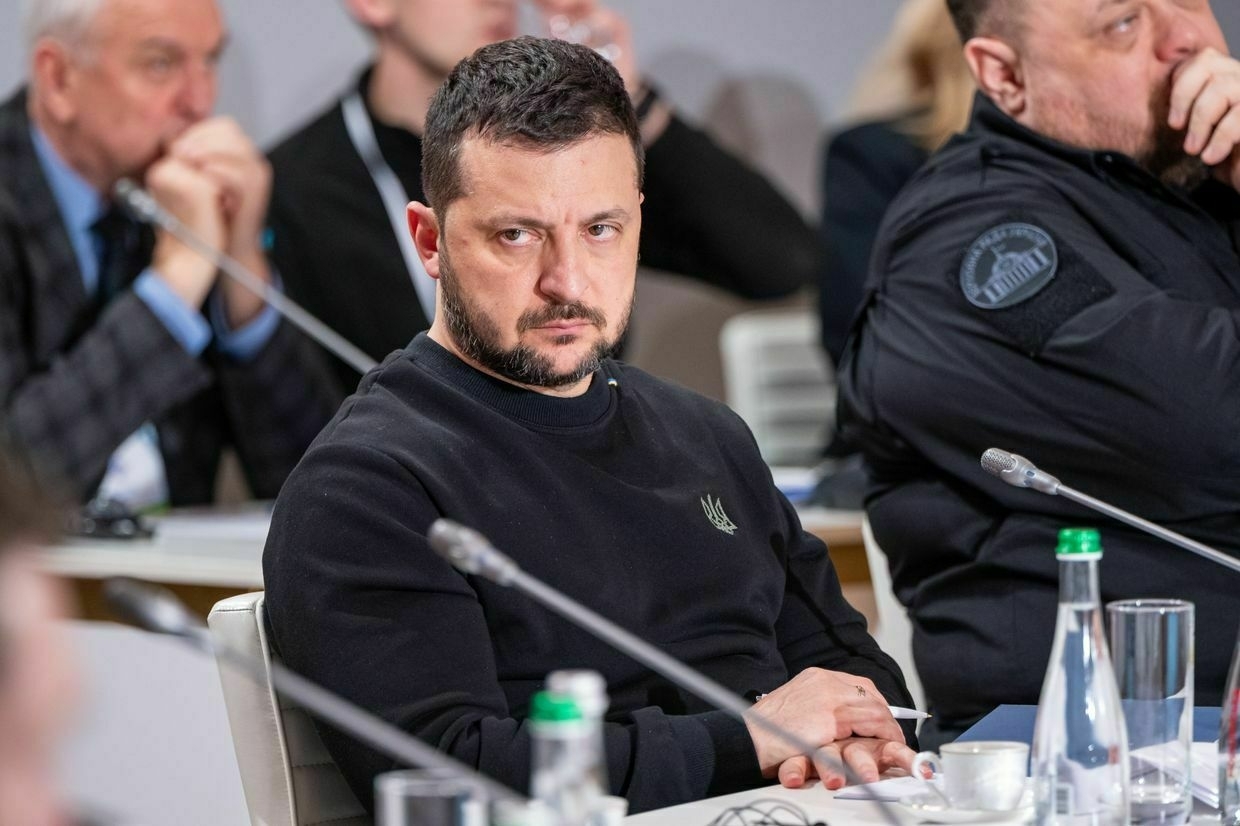
President Volodymyr Zelenskyy attends the Congress of Local and Regional Authorities in Lviv Oblast, Ukraine, on Dec. 15, 2023. (Stanislav Ivanov / Global Images Ukraine via Getty Images) Mariana Bezuhla, a controversial and outspoken lawmaker and formerly a member of Zelensky's Servant of the People party, said in January that the European Union and NATO "have become completely indifferent to the reform of Ukraine's security sector," including the SBU.
Another problem seen as a violation of Ukraine's obligations to its Western partners was the closure of the public register of officials' asset declarations following Russia's full-scale invasion in 2022. The Ukrainian authorities passed a law to allow officials not to file electronic asset declarations and shut down public access to all previous declarations.
The West supported restoring the asset declaration system. However, Ukraine's Western partners did not insist on making government officials' asset declarations public again, according to Yurchyshyn, Butko and a source from Ukraine's civil society.
Under domestic pressure, Zelensky signed a law in 2023 to restore the asset declaration system and make declarations public again.
Officials accused of using war as pretext for hiding ill-gotten wealthAs Ukrainian soldiers are defending their homeland on the front line, officials in the rear are accused of using the war as a pretext for hiding their wealth. They are able to do so because one of Ukraine’s main anti-corruption tools, the asset declaration system, has been effectively eliminated.The Kyiv IndependentOleg Sukhov
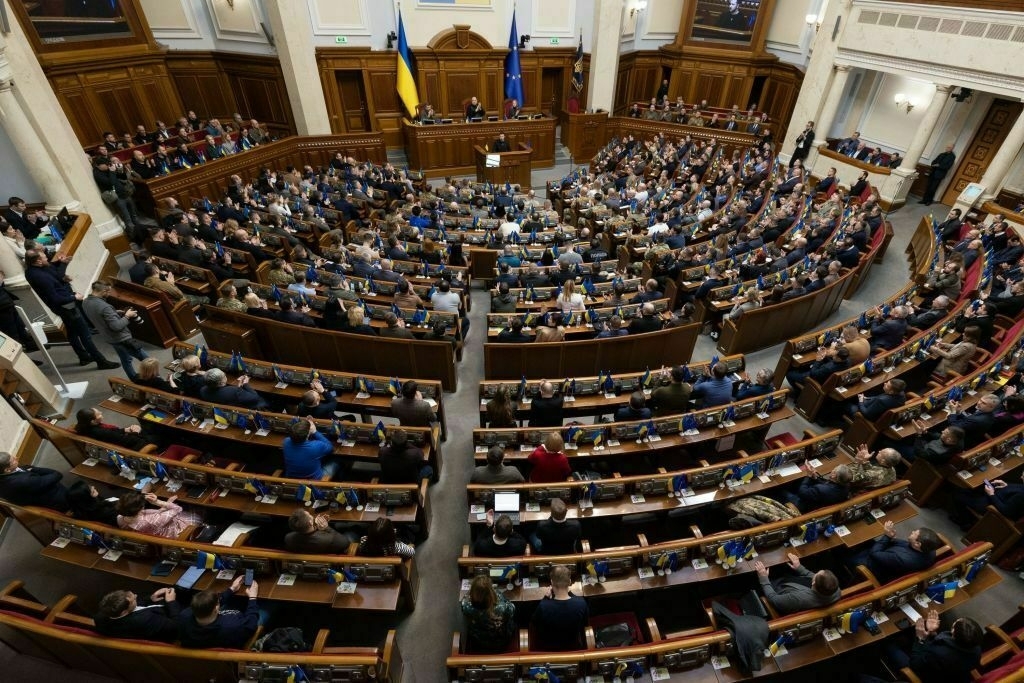
Defense procurement scandalReforms in the defense sector have also begun to lose momentum.
One of the key reforms concerns the Defense Procurement Agency (DPA), which was created in 2022 to make defense procurement more transparent and to sideline middlemen making fortunes on supplies to the military.
In January, the DPA's supervisory board extended the contract of its head, Maryna Bezrukova, but Defense Minister Rustem Umerov fired her nonetheless.
Umerov has been lambasted by anti-corruption activists for what they see as his efforts to destroy the agency's independence. He denied the accusations of wrongdoing.
On Jan. 27, G7 ambassadors called for a swift resolution of the Defense Procurement Agency dispute and urged uninterrupted continuation of weapons procurement.
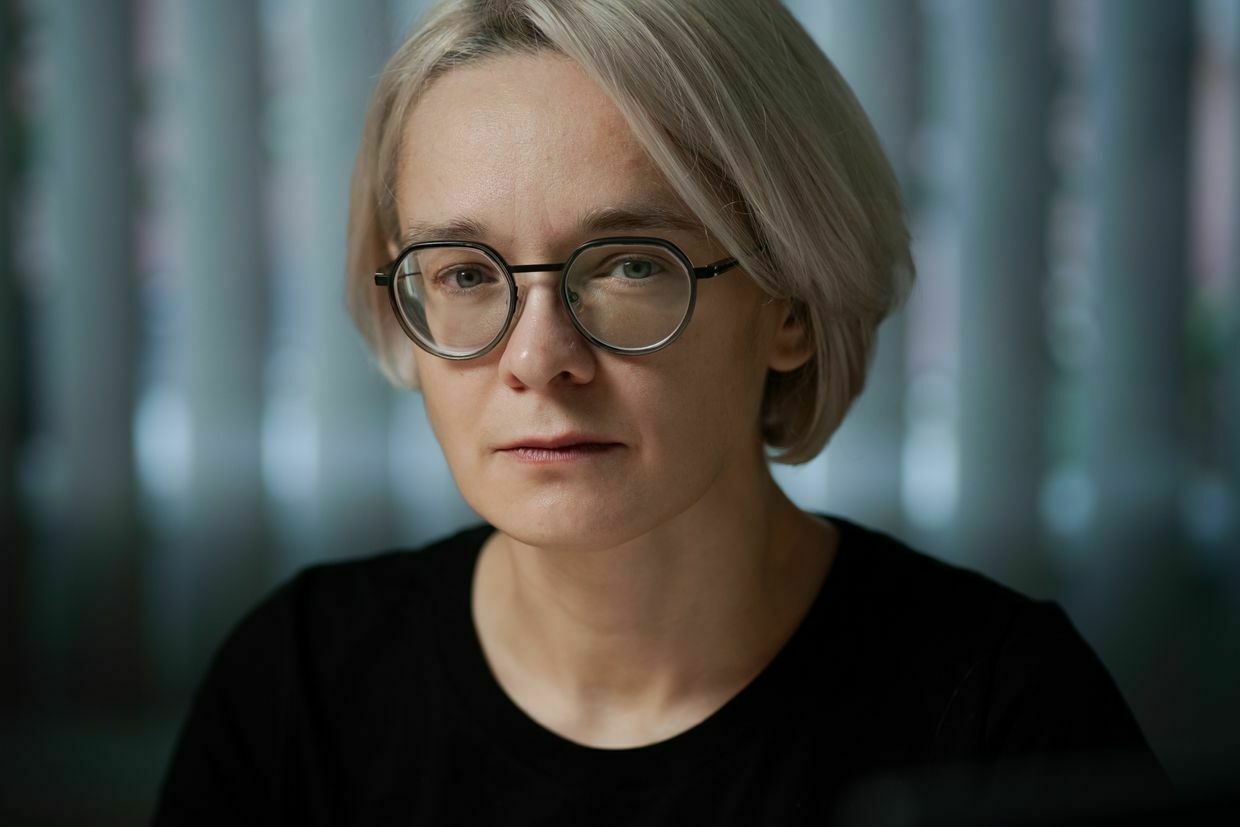
Maryna Bezrukova, the head of the Defense Procurement Agency in Kyiv, Ukraine, on June 19, 2024. (Danylo Pavlov / The Kyiv Independent) However, the West has issued no concrete calls for reinstating Bezrukova or restoring the DPA's independence.
The G7 statement is vague and can be interpreted in different ways, one of the civil society sources said.
It was an attempt to "stop this chaos and return to proper procedures," but Umerov may interpret it in the sense that he can appoint a new head of the agency and a new supervisory board, according to the source.
The source said that the West's soft approach allowed Umerov to turn his back on the agency's independence. Umerov appointed Arsen Zhumadilov as the new head of the Defense Procurement Agency (DPA) on March 6, bypassing the supervisory board.
"When it comes to the defense sector, international partners are even weaker because it's very difficult for them to dictate how Ukraine should fight," the source said.
The Kyiv IndependentYour support allows us to bring independent, locally-sourced news about Ukraine to the worldThe Kyiv Independent
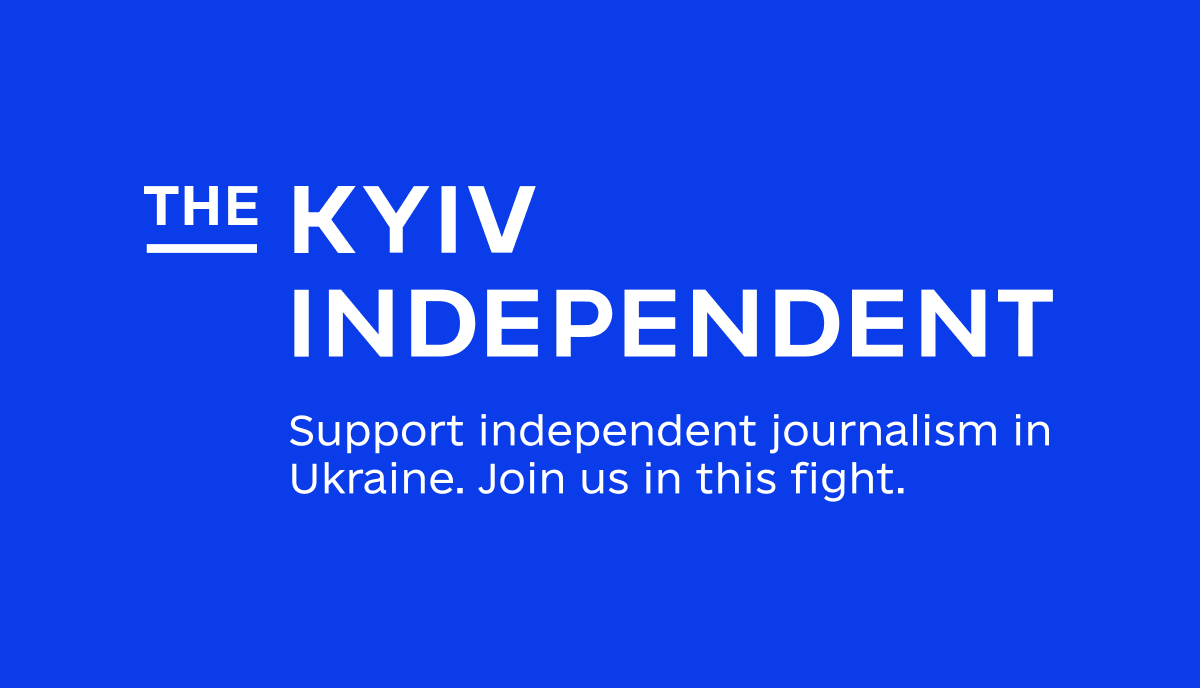 Defense Minister Umerov dismisses top official who stood up to himUkraine’s lengthy efforts to clean up its weapons procurement are in danger of being unwound as the Defense Ministry strangleholds the Defense Procurement Agency, say anti-corruption activists and lawmakers. Defense Minister Rustem Umerov announced on Jan. 24 that he would not renew the contract of Maryna Bezrukova, the head
Defense Minister Umerov dismisses top official who stood up to himUkraine’s lengthy efforts to clean up its weapons procurement are in danger of being unwound as the Defense Ministry strangleholds the Defense Procurement Agency, say anti-corruption activists and lawmakers. Defense Minister Rustem Umerov announced on Jan. 24 that he would not renew the contract of Maryna Bezrukova, the headThe Kyiv IndependentDominic Culverwell
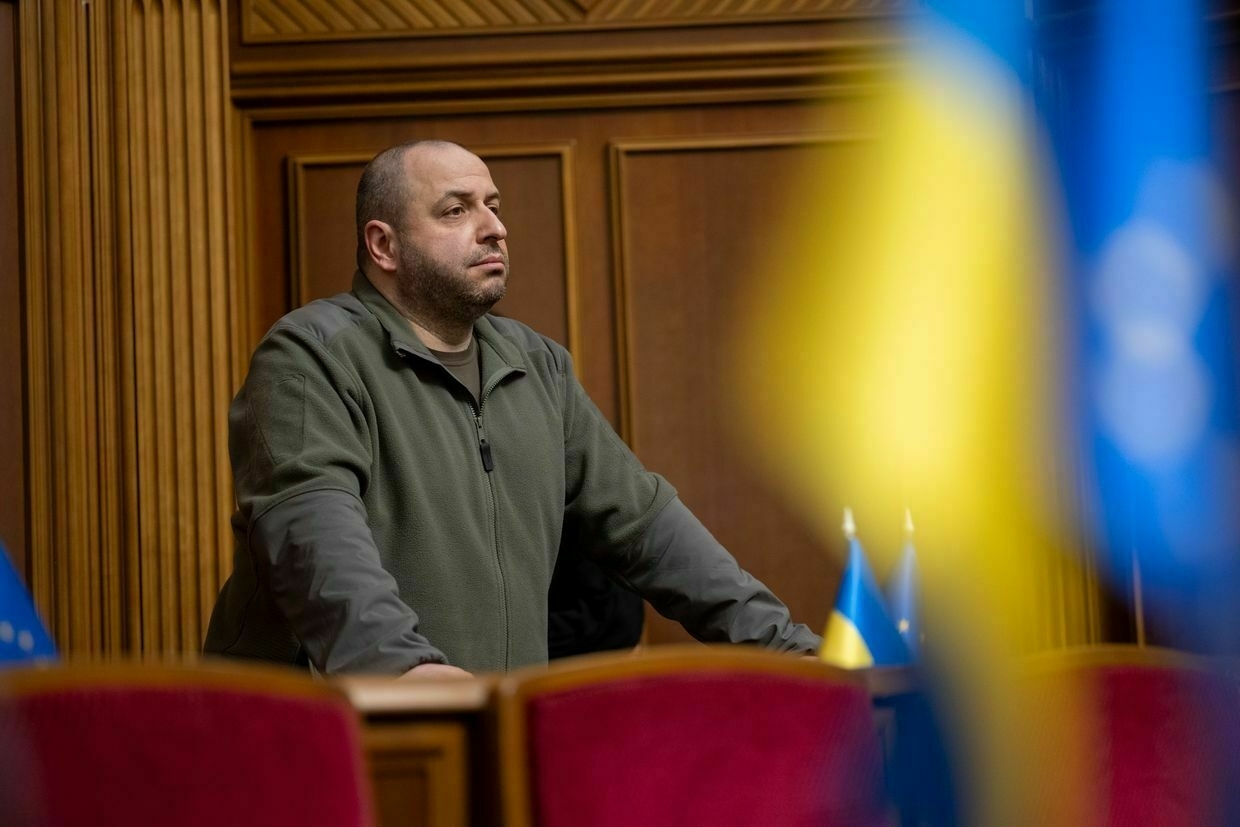
-
'Crushing' Russia with sanctions would jeopardize Ukraine peace talks, Rubio says
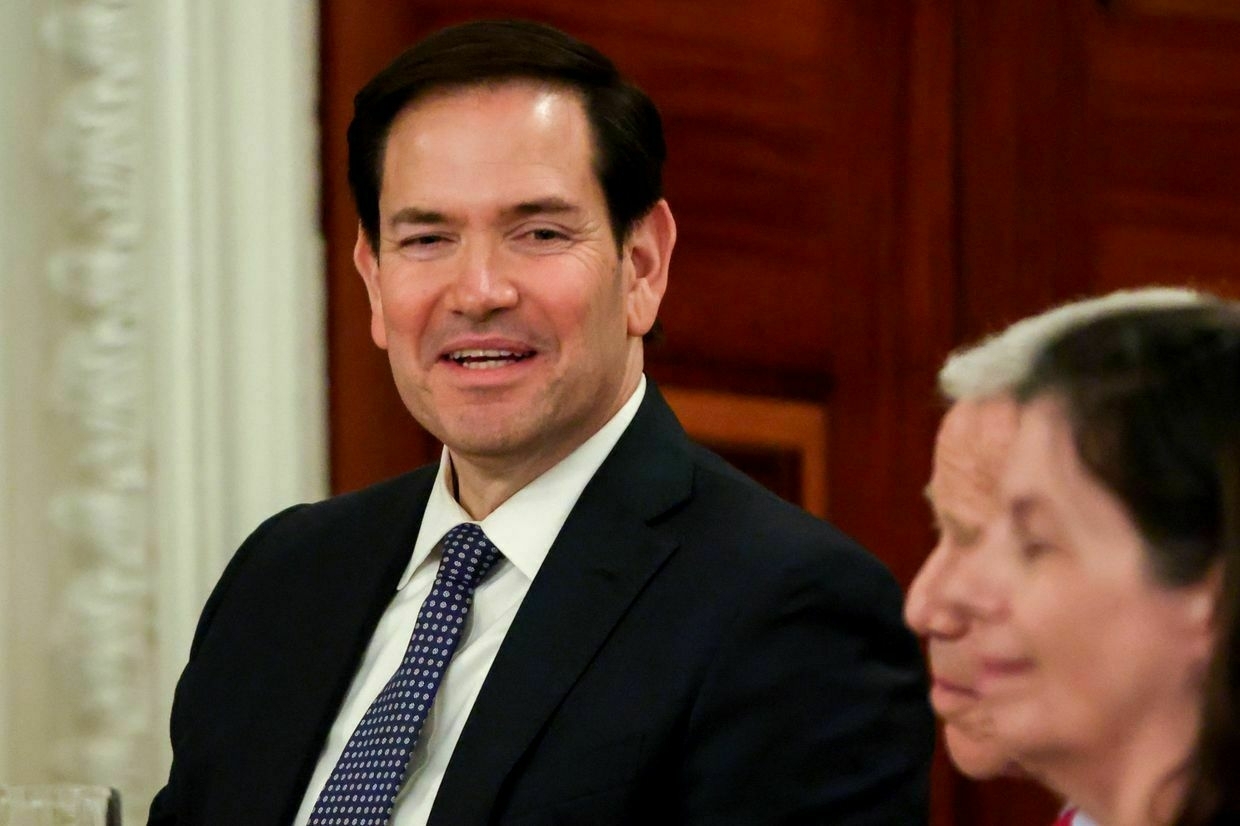
U.S. Secretary of State Marco Rubio said in an interview with Politico on June 25 that U.S. President Donald Trump will resist European pressure to escalate sanctions on Russia, arguing that doing so could close the door to potential peace negotiations with Moscow.
Speaking with Politico on the sidelines of the NATO summit in The Hague, Rubio said Trump wants to keep open a diplomatic channel with Russian President Vladimir Putin, despite growing frustration from European leaders and President Volodymyr Zelensky over Russia’s refusal to agree to a ceasefire.
“If we did what everybody here wants us to do, and that is come in and crush them with more sanctions, we probably lose our ability to talk to them about the ceasefire and then who’s talking to them?” Rubio said.
Rubio acknowledged that Russia appears committed to pursuing its objectives by force.
“Our sense of it is that the Russians are going to try to achieve on the battlefield what they’ve demanded at the negotiating table, which is certain territories, administrative lines, and the like,” he said. “We think it’s going to be a lot harder for them to achieve that than they think it’s going to be."
Rubio added that Trump “will know the right time and place” for additional sanctions, but emphasized that imposing them too soon could signal that the U.S. has given up on a negotiated resolution.
Previously, Trump said he had refrained from imposing new sanctions on Russia because he believed a peace deal with Moscow might be within reach, warning he did not want to jeopardize negotiations by acting prematurely.
Speaking after two rounds of peace talks in Istanbul between Moscow and Kyiv that led to no ceasefire, Trump on June 5 declined to say when additional sanctions on Russia might be imposed, only noting there is a deadline “in (his) brain."
“If he (Trump) does it, you’re almost admitting that this is not going to be negotiated anytime soon,” he said. “We’re going to continue to engage. In the sense that if there’s an opportunity for us to make a difference and get them to the table, we’re going to take it."
Zelensky and several European leaders are expected to ask Trump during meetings at the summit to increase economic pressure on Moscow.
It has been more than 100 days, since Ukraine agreed to a U.S.-backed complete ceasefire, while Russia continues to reject it. Moscow continues pushing maximalist demands while intensifying attacks across Ukrainian cities.
Investigation: How Russia prepares its strategic missile plant for ‘eternal war’Key findings: * Despite international sanctions, Russia’s strategic missile plant was able to import complex machinery to dramatically increase missile production. * The Kyiv Independent has identified the equipment supplied to the plant, as well as the supply chains, mostly from China. * We located the plant’s new premises, built to house theThe Kyiv IndependentAlisa Yurchenko
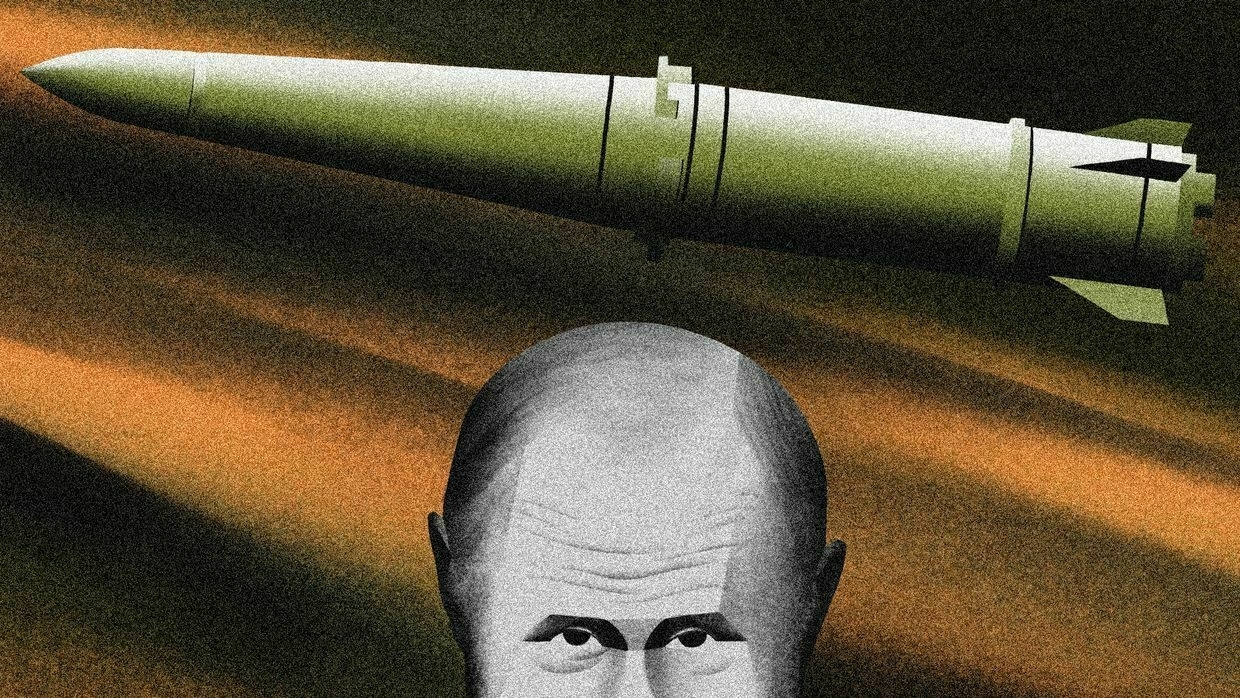
-
'Treasonous' — Trump, Witkoff slam intel leak undermining US strikes on Iran, insist nuclear targets 'obliterated'
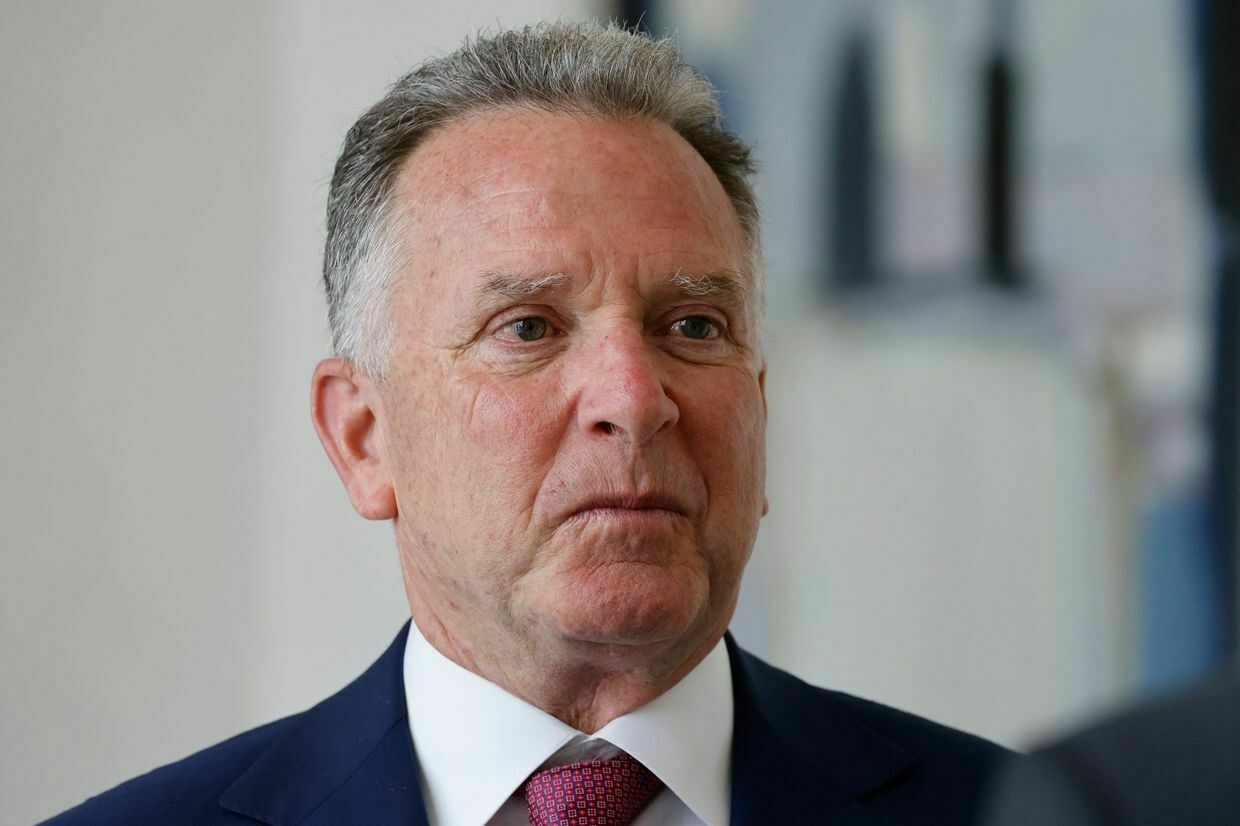
U.S. Special Envoy to the Middle East Steve Witkoff condemned on June 24 the leak of an intelligence assessment that undercuts U.S. President Donald Trump’s claims of having “obliterated” Iran’s nuclear program.
His remarks follow a leaked U.S. Defense Intelligence Agency (DIA) assessment, reported by CNN, which found that strikes on three major Iranian nuclear sites, Fordow, Natanz, and Isfahan, did not destroy the core of Tehran’s nuclear program. Instead, the intelligence suggests the attacks likely delayed Iran’s progress by “a few months.”
“It goes without saying that leaking that type of information, whatever the information, whatever side it comes out on, is outrageous. It’s treasonous,” Witkoff said during an appearance on Fox News. “It ought to be investigated, and whoever is responsible should be held accountable."
Witkoff, who served as Assistant to the U.S. president and led peace mission efforts during the recent conflict between Israel and Iran, defended Trump’s portrayal of the U.S.-led strikes as a decisive success.
“The objective was to eliminate enrichment in Iran… and he achieved that objective,” Witkoff said, adding that he personally reviewed damage assessments and saw “no doubt” that key nuclear infrastructure was destroyed.
The report leaked in media contradicts public statements from Trump and Defense Secretary Pete Hegseth, who had described the operation as delivering “total obliteration.” Trump, for his part, stood by the claim on June 24. “Those targets were obliterated,” he said. “That place is demolished."
According to the DIA assessment, though the strikes damaged above-ground infrastructure, most of the centrifuges and the enriched uranium stockpile reportedly remain intact. The assessment also noted that underground sections of the sites, where Iran’s most sensitive work is done, were largely unaffected. Two officials told CNN that Iran likely retains operational nuclear facilities that were not targeted.
Witkoff dismissed the report as “preposterous,” insisting that the Isfahan conversion facility, critical to Iran’s ability to weaponize enriched uranium, was “completely destroyed” by a 30,000-pound bunker buster bomb.
“Without conversion, you can’t begin or end enrichment,” he said. “They cannot weaponize, even if they’ve enriched to 90%."
Witkoff also claimed successful targeting of Fordow and Natanz, saying the U.S. dropped more than a dozen bunker busters on the sites that made the facilities inoperable.
The White House acknowledged the assessment’s existence but strongly dismissed it. “This alleged assessment is flat-out wrong and was classified as ‘top secret’ but was still leaked to CNN by an anonymous, low-level loser in the intelligence community,” press secretary Karoline Leavitt said.
“The leaking of this alleged assessment is a clear attempt to demean President Trump, and discredit the brave fighter pilots who conducted a perfectly executed mission to obliterate Iran’s nuclear program. Everyone knows what happens when you drop fourteen 30,000 pound bombs perfectly on their targets: total obliteration."
Trump, for his part, stood by his assessment of the mission’s success. “I think it’s been completely demolished,” he said on June 24. “Those pilots hit their targets. Those targets were obliterated, and the pilots should be given credit.” Asked if Iran could rebuild, Trump responded: “That place is under rock. That place is demolished."
While both Trump and Hegseth praised the strikes as decisive, others expressed caution. Chairman of the Joint Chiefs of Staff Dan Caine said it was “way too early” to determine whether Iran retained nuclear capabilities.
Trump says Putin called him to offer help with Iran“He (Vladimir Putin) said, can I help you with Iran? I said, ‘no, I don’t need help with Iran. I need help with you,’” Donald Trump said.The Kyiv IndependentKateryna Hodunova
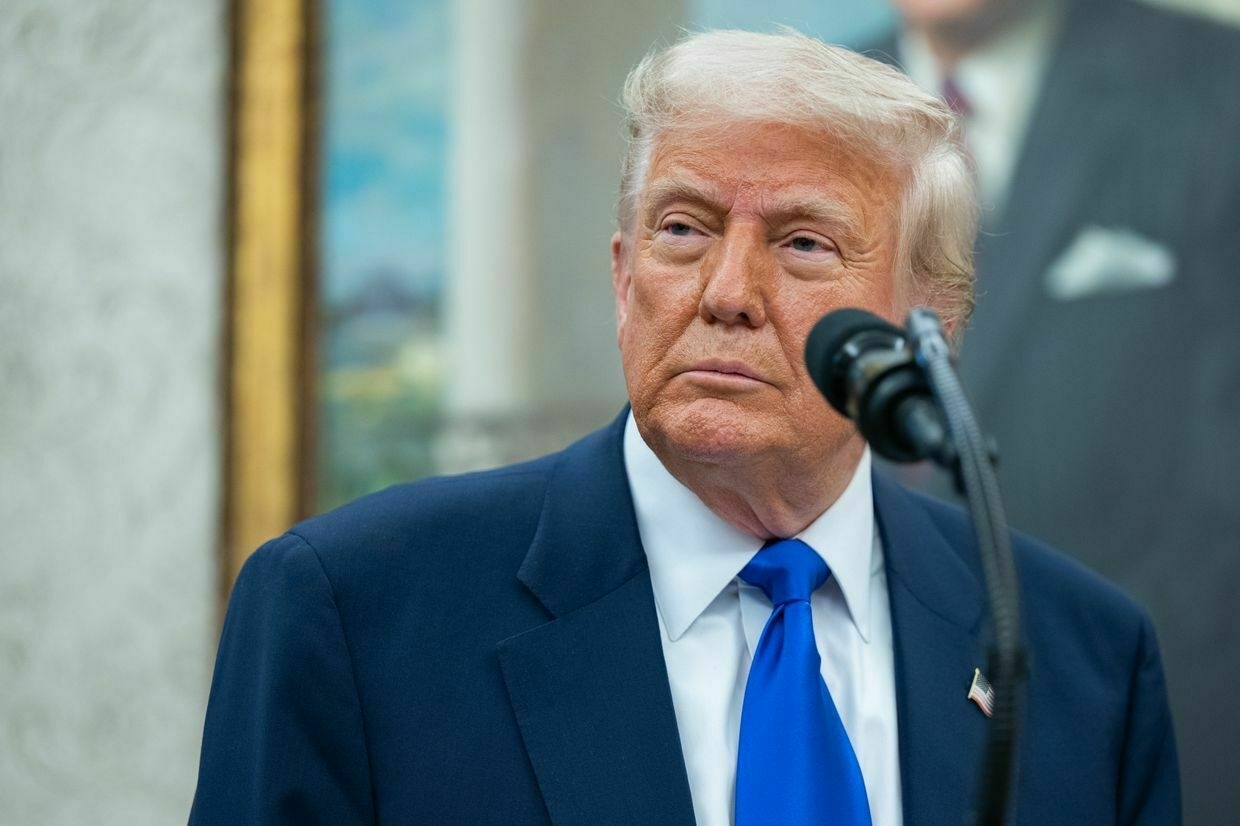
-
'You can count on us' — EU reiterates support for Ukraine at NATO summit
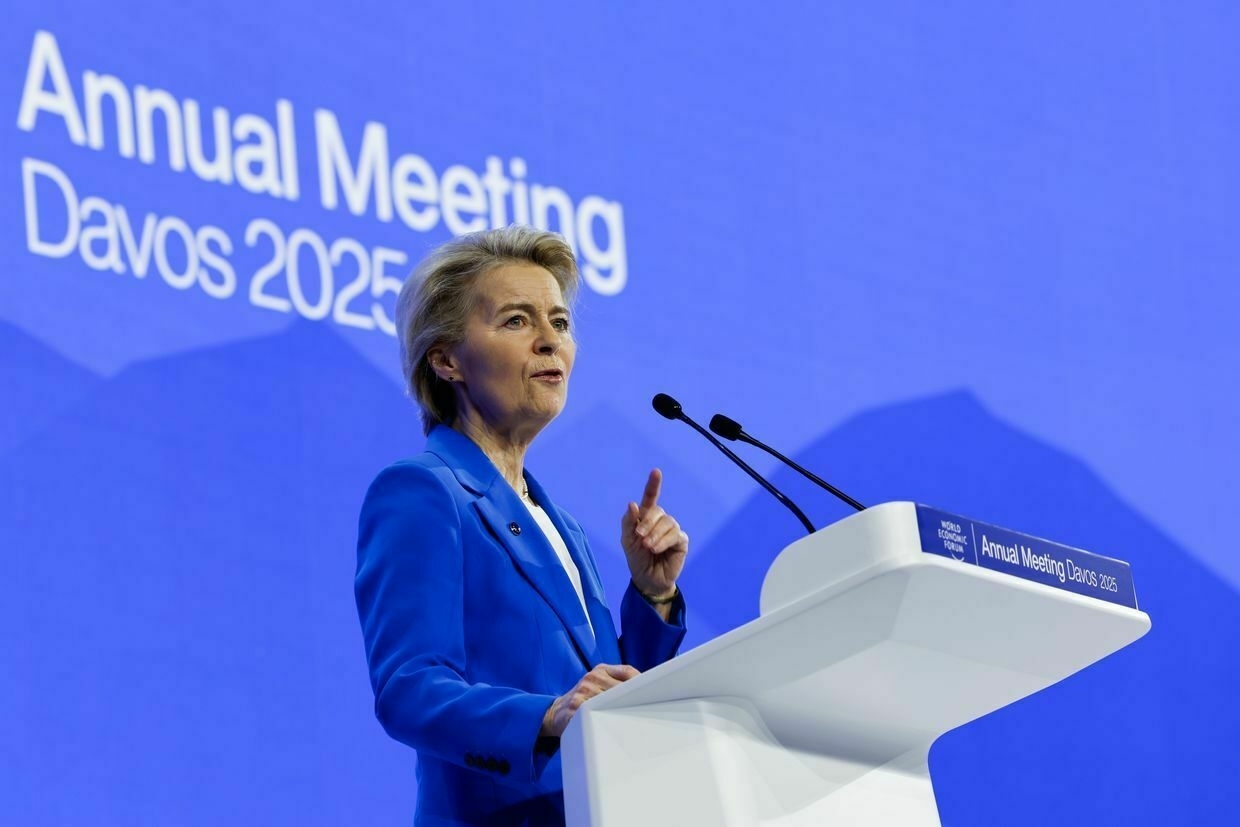
European Commission President Ursula von der Leyen reiterated the EU’s ongoing support for Ukraine at a NATO summit in The Hague on June 24.
“We have designed a funding program of 50 billion euros, we call it Safe, where member states, but also Ukraine and other partners, can take these loans to invest in the (Ukrainian) defense industry,” she said, addressing President Volodymyr Zelensky.
“We are integrating our defense industries as if Ukraine was in the EU. This is good for Ukraine. And just as good for Europe, as Ukraine is now home to extraordinary innovation,” von der Leyen later said in a post to social media.
NATO is holding a summit in The Hague from June 24-25 with world leaders, including Zelensky and U.S. President Donald Trump present.
"(M)y dear friend Volodymyr, you’re here among friends and we stand by Ukraine from the very first day on and you can count on us also for the future," von der Leyen said.
The leader described the EU’s 18th sanctions package as a “biting one” to apply pressure on Moscow and Russian President Vladimir Putin.
“Secondly, of course, there’s constant financial support to Ukraine because we know you’re fighting a war that is also protecting our values and our principles, and thirdly, indeed, we have to put pressure on President Putin (so) that he comes to the negotiation table,” von der Leyen said.
She noted that members of the Group of Seven (G7) will also be implementing additional sanctions against Russia.
“All this shows you are among friends, you can count on us, we stand by your side,” von der Leyen said.
The White House has confirmed that Trump and Zelensky will hold a meeting at the NATO summit.
Investigation: How Russia prepares its strategic missile plant for ‘eternal war’Key findings: * Despite international sanctions, Russia’s strategic missile plant was able to import complex machinery to dramatically increase missile production. * The Kyiv Independent has identified the equipment supplied to the plant, as well as the supply chains, mostly from China. * We located the plant’s new premises, built to house theThe Kyiv IndependentAlisa Yurchenko
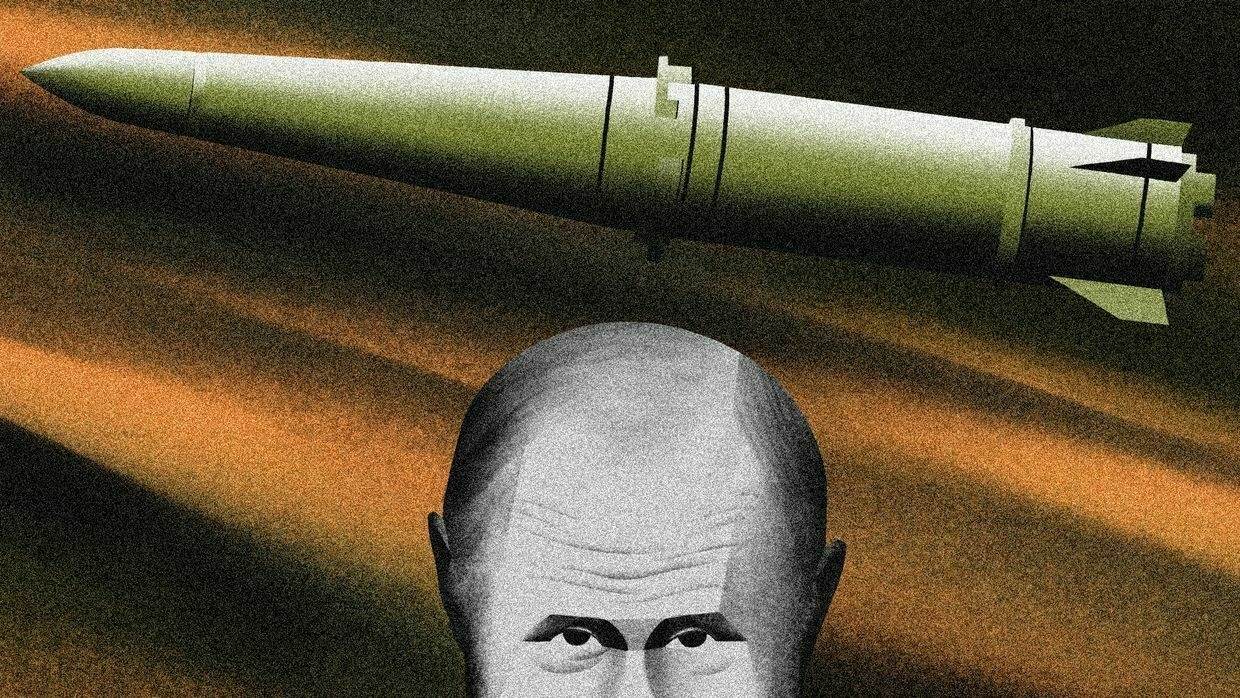
-
Lithuania signs memorandum with Northrop Grumman, Nammo amid Russian threat to regional security
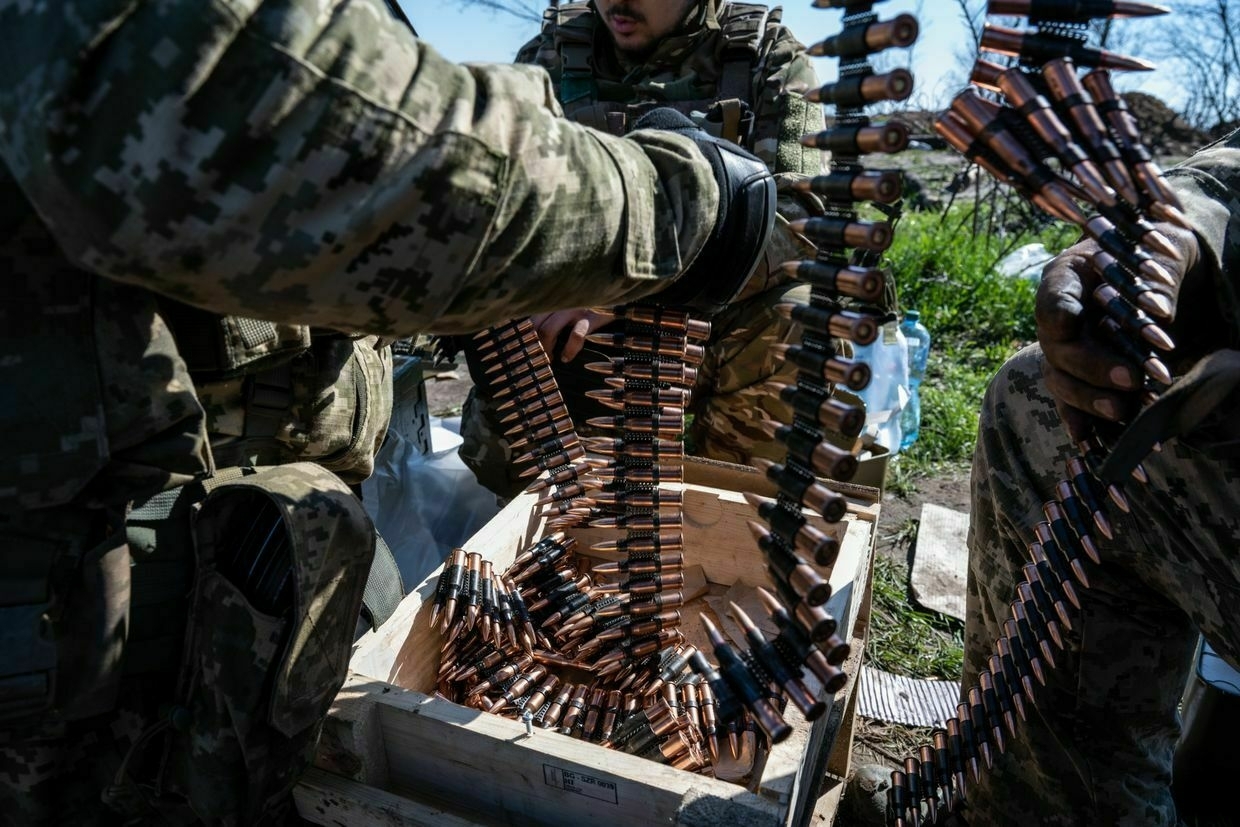
Lithuania has signed a memorandum with American defense firm Northrop Grumman and Norwegian Nammo to secure the production of ammunition amid Russia’s war against Ukraine, the Lithuanian Defense Ministry announced on June 24.
“By strengthening our national defense industry, we are investing in both technological capabilities and Lithuania’s resilience to crises. This Memorandum of Understanding will allow us to better equip our armed forces and help Lithuania become an important link in international supply chains,” Lithuanian Vice Minister of National Defense Loreta Maskalioviene said.
“The investment and expertise of our allies… will significantly contribute to strengthening of the national defense industry and security not only in Lithuania, but also in the entire region, including Ukraine. The development of the defense industry and investment in production must come without delay,” Lithuanian Finance Minister Rimantas Sadzius said.
Russia’s full-scale war against Ukraine has sparked concern in Europe that Russia could attack NATO’s eastern flank, including Poland, the Baltic countries, and Finland.
Ukrainian intelligence has evidence that Russia is preparing new military operations in Europe, President Volodymyr Zelensky said on June 22.
The partnership will be implemented at the state-owned Giraite Armament Factory, the announcement said, adding that the factory is set to be integrated into Northrop Grumman’s international supply chains.
Northrop Grumman will supply ammunition produced in the Lithuanian defense factory to the international market.
Nammo, as a subcontractor, will provide Northrop Grumman with the 35 mm ammunition production technology.
“It will enhance national strategic autonomy in defense and deepen partnerships with NATO allies, the United States, and Norway. The planned production of ammunition is of critical importance to the Lithuanian Armed Forces, our allies, and Ukraine,” Lithuanian Defense Minister Dovile Sakaliene said.
The memorandum will initiate negotiations for the production of medium caliber ammunition, ranging in size from 20-50 mm.
The Giraite Armament Factory will be provided with 35 mm ammunition production technology from the two defense firms, the announcement said.
Sakaliene noted that the new partnership will ensure an uninterrupted supply of ammunition to Lithuania’s Armed Forces.
NATO is holding a summit in The Hague from June 24-25 with world leaders, including Zelensky and U.S. President Donald Trump present.
The White House has confirmed that Trump and Zelensky will hold a meeting at the NATO summit.
‘Like any technology, it’s a race’ — UK’s largest ammo maker rebooting chemistry to break NATO’s dependence on explosive importsRussia’s war in Ukraine has drained Western ammunition stocks. Despite years of claimed weapons ramp-ups, NATO’s arms manufacturing is still not refilling those stocks apace, let alone making it to Ukraine in needed mass. The West has come to recognize that these shortages are due to the offshoringThe Kyiv IndependentKollen Post
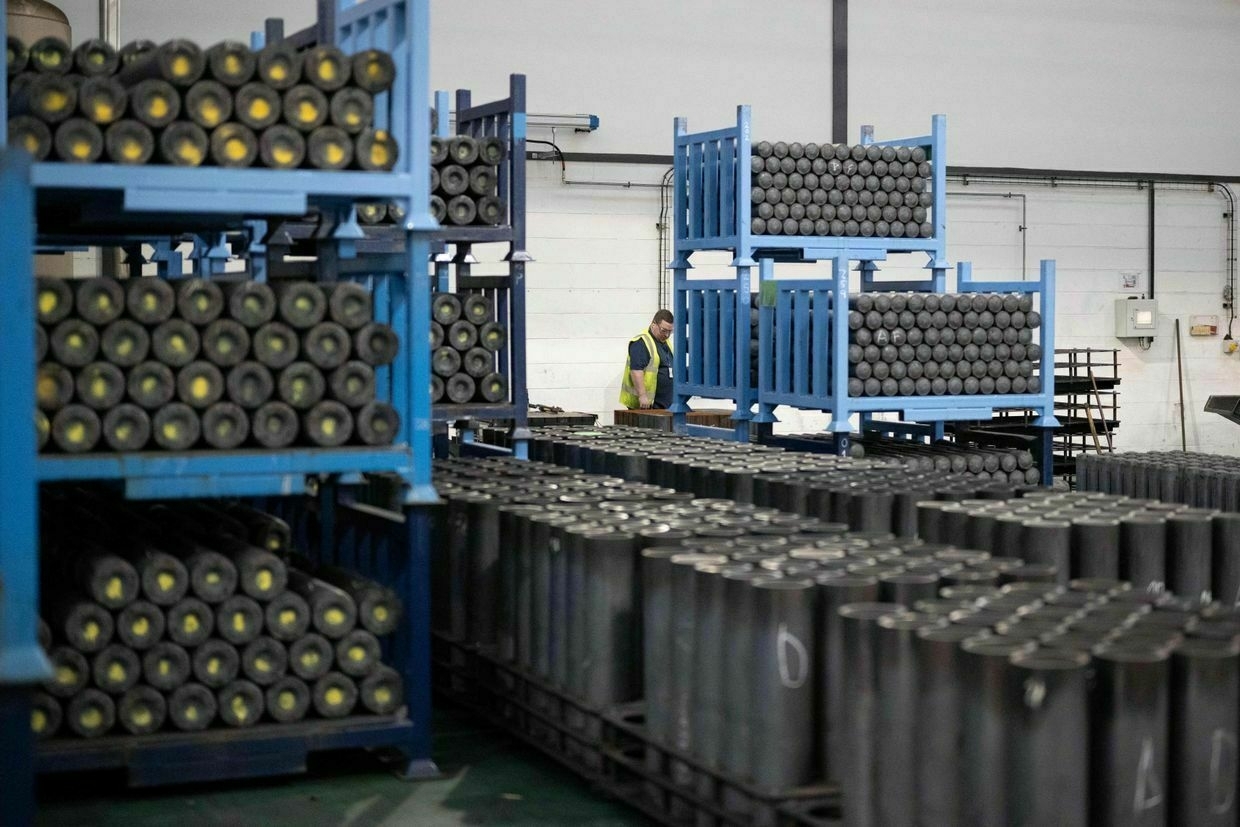
-
Strikes didn’t destroy Iran’s nuclear sites, US intel finds, contradicting Trump, CNN reports
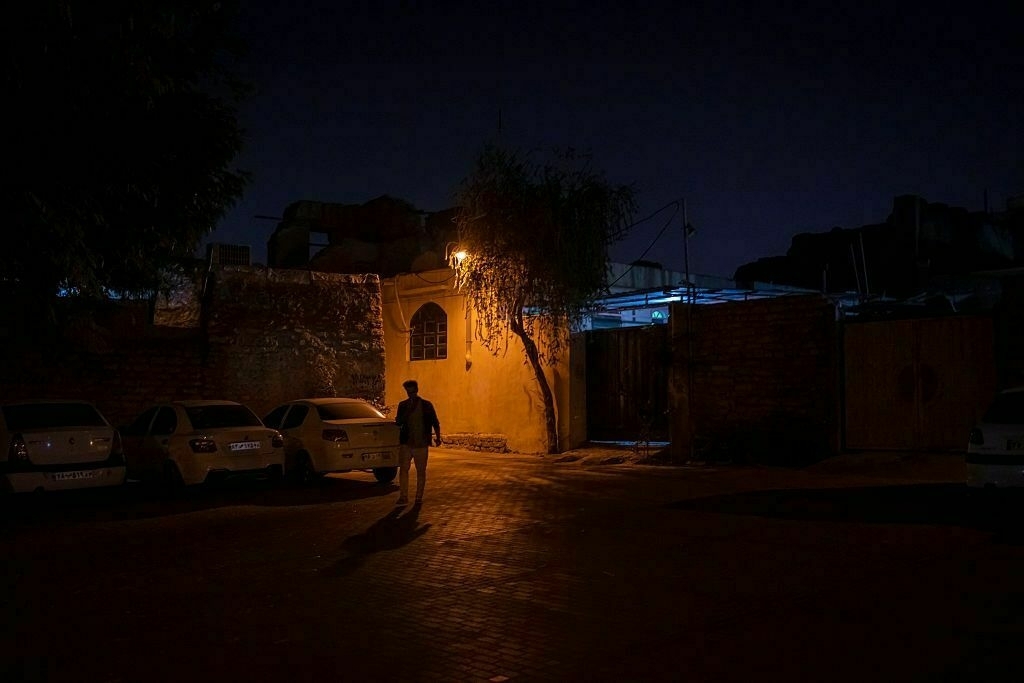
Recent U.S. strikes on three Iranian nuclear facilities did not eliminate the core components of Tehran’s nuclear program and likely delayed it by only a few months, according to an early assessment by the U.S. Defense Intelligence Agency (DIA), CNN reported on June 24, citing four sources familiar with the findings.
The analysis, based on a battle damage report from U.S. Central Command, contradicts public statements by President Donald Trump and Defense Secretary Pete Hegseth, who claimed the operation had “obliterated” Iran’s nuclear capabilities.
“So the (DIA) assessment is that the U.S. set them back maybe a few months, tops,” one source told CNN, adding that Iran’s stockpile of enriched uranium was not destroyed and that most centrifuges remain “intact.”
The White House acknowledged the assessment’s existence but strongly dismissed it. “This alleged assessment is flat-out wrong and was classified as ‘top secret’ but was still leaked to CNN by an anonymous, low-level loser in the intelligence community,” press secretary Karoline Leavitt said. “The leaking of this alleged assessment is a clear attempt to demean President Trump, and discredit the brave fighter pilots who conducted a perfectly executed mission to obliterate Iran’s nuclear program. Everyone knows what happens when you drop fourteen 30,000 pound bombs perfectly on their targets: total obliteration.”
Trump, for his part, stood by his assessment of the mission’s success. “I think it’s been completely demolished,” he said on Tuesday. “Those pilots hit their targets. Those targets were obliterated, and the pilots should be given credit.” Asked if Iran could rebuild, Trump responded: “That place is under rock. That place is demolished.”
While both Trump and Hegseth praised the strikes as decisive, others expressed caution. Chairman of the Joint Chiefs of Staff Dan Caine said it was “way too early” to determine whether Iran retained nuclear capabilities.
Republican Rep. Michael McCaul, former chair of the House Foreign Affairs Committee, also avoided endorsing the president’s characterization. “I’ve been briefed on this plan in the past, and it was never meant to completely destroy the nuclear facilities, but rather cause significant damage,” McCaul told CNN. “But it was always known to be a temporary setback.”
The DIA’s assessment reportedly found that damage at the Fordow, Natanz, and Isfahan sites was mostly limited to aboveground infrastructure, such as power systems and uranium metal processing buildings. The underground facilities—where Iran’s most sensitive nuclear work takes place—were largely unaffected, the sources said.
According to CNN, Israel had been carrying out its own strikes on Iranian nuclear facilities prior to the U.S. operation, but relied on U.S. B-2 bombers equipped with 30,000-pound “bunker buster” bombs to finish the job. Despite over a dozen bombs being dropped on Fordow and Natanz, the sites’ key components remain intact, the sources said.
The U.S. also reportedly used Tomahawk missiles launched from a submarine to target Isfahan, rather than deploying bunker busters. A source said this was due to doubts over whether the bombs could penetrate Isfahan’s deep underground levels, which are believed to be even more fortified than Fordow.
Two sources also told CNN that Iran likely retains undisclosed nuclear facilities that were not targeted and remain operational.
Meanwhile, classified briefings for lawmakers on the strikes were postponed. The all-Senate briefing was rescheduled for Thursday, and the House briefing’s new date remains unclear.
More empty threats from Washington, more deadly bombs from RussiaThe ongoing and escalating slaughter of Ukrainian civilians depends on two preconditions: Moscow’s determination to erase Ukraine, and the tacit permission it receives from America and Europe. On Monday, a Russian missile tore through a residential building in Kyiv, leaving at least six civilians dead and over a dozenThe Kyiv IndependentAndrew Chakhoyan
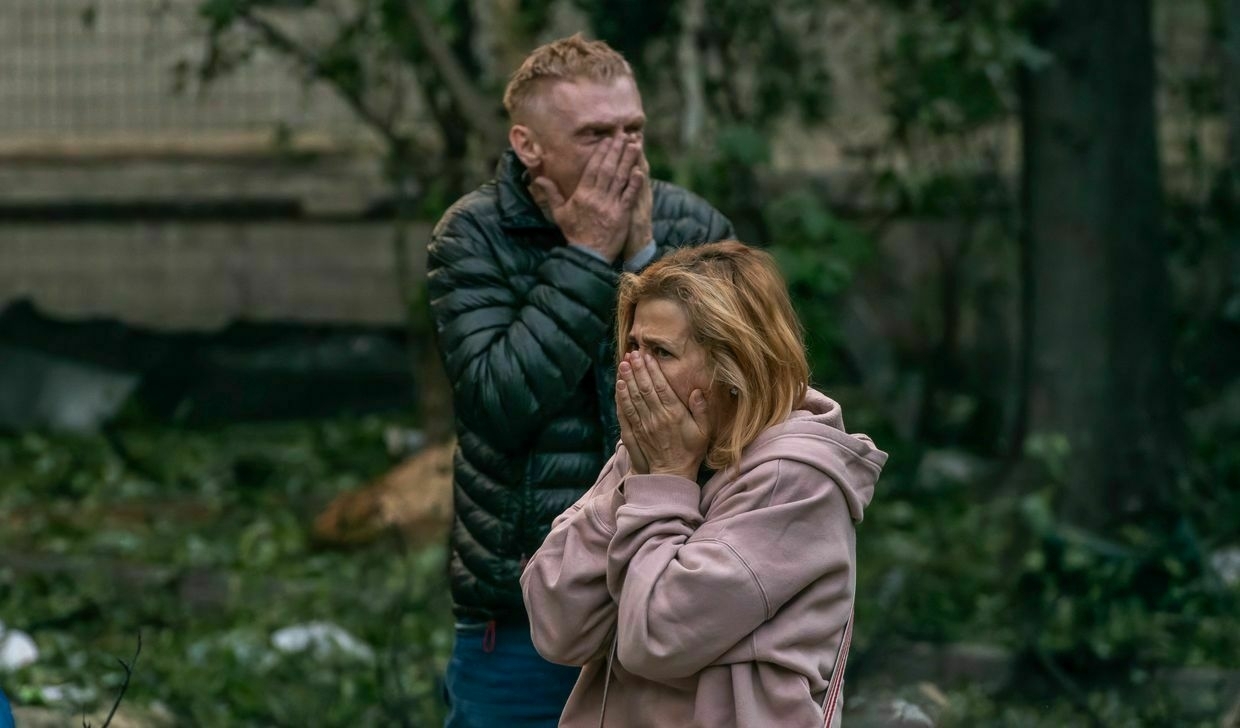
-
Trump casts doubt on NATO defense pledge as alliance confronts Russian threat
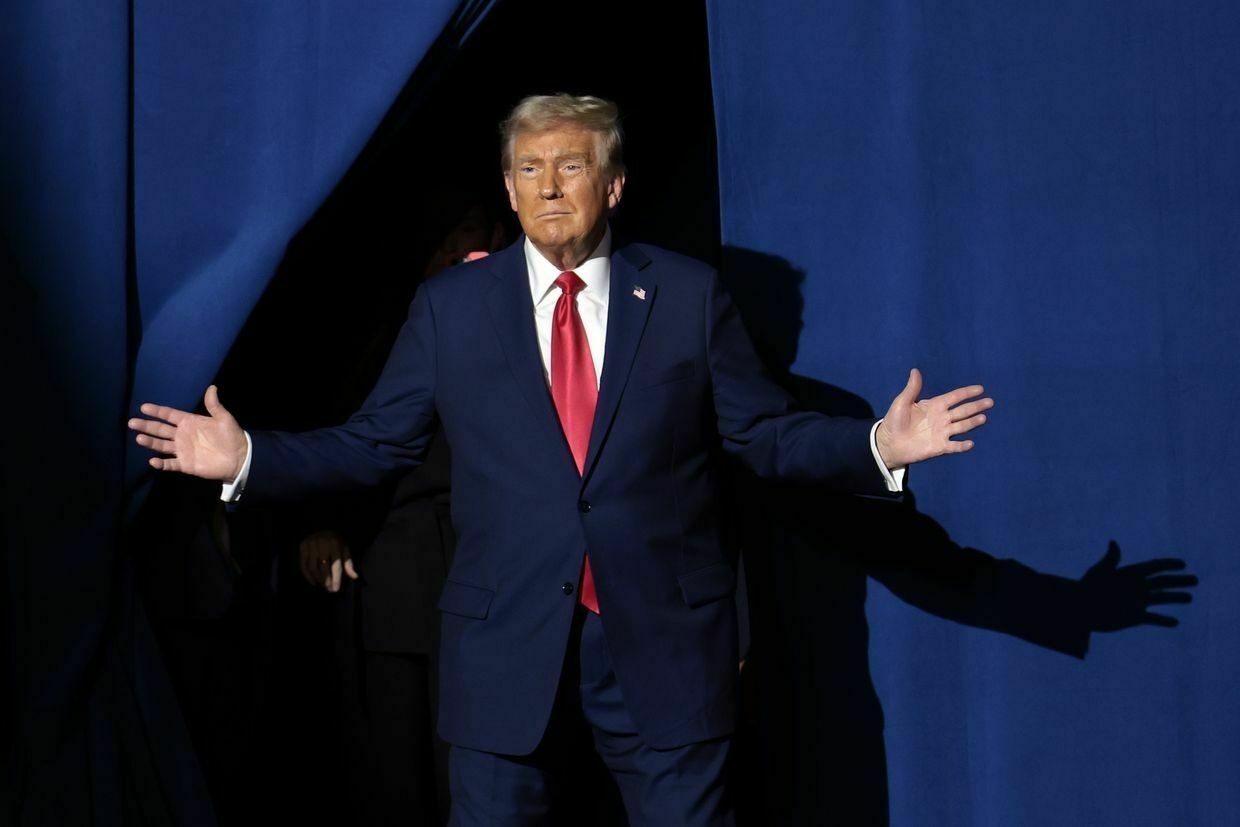
President Donald Trump refused to give a clear commitment to NATO’s Article 5 — the alliance’s collective defense clause — as he departed for a pivotal summit in The Hague, raising fresh concerns about his stance on one of NATO’s core principles.
When pressed by reporters aboard Air Force One on whether he would uphold the mutual defense obligation, Trump replied, “It depends on your definition of Article 5,” adding, “There’s numerous definitions of Article 5. You know that, right? But I’m committed to being their friends, you know, I’ve become friends with many of those leaders, and I’m committed to helping them."
Although Article 5 is central to NATO’s security framework, Trump has previously expressed skepticism about honoring it, often criticizing member states for not contributing enough to shared defense efforts.
Asked to elaborate, he said, “I’m committed to saving lives. I care about life and safety.” He added that he would explain his position in full once at the summit: “I’ll give you an exact definition when I get there — I just don’t want to do it from the back of a plane."
Trump’s remarks come as NATO faces what its leadership describes as its most significant threat in decades.
At a press briefing on June 23, NATO Secretary General Mark Rutte said Russia remains the primary danger to the alliance, citing its growing alignment with China, North Korea, Iran, and Belarus.
“Moscow continues to wage war against Ukraine, with support of North Korea, Iran, and China, as well as Belarus,” Rutte said.
He added that NATO leaders plan to adopt a “historic” defense investment plan at the June 24–25 summit in The Hague, including a new 5% of GDP benchmark for defense spending and stronger backing for Ukraine.
“All leaders will take bold decisions to strengthen our collective defense, making NATO a stronger, fairer, and more lethal alliance,” Rutte said. “This is a leap that is ambitious, historic, and fundamental to securing our future.”
While at the summit, Trump is also set to meet President Volodymyr Zelensky, the White House confirmed on June 24.
Their last meeting was in April at Pope Francis' funeral, amid concerns over the U.S. role in peace talks between Kyiv and Moscow. Details of the June 25 meeting are still being finalized, but the talks are expected in the “early afternoon,” a source told AFP.
Investigation: How Russia prepares its strategic missile plant for ‘eternal war’Key findings: * Despite international sanctions, Russia’s strategic missile plant was able to import complex machinery to dramatically increase missile production. * The Kyiv Independent has identified the equipment supplied to the plant, as well as the supply chains, mostly from China. * We located the plant’s new premises, built to house theThe Kyiv IndependentAlisa Yurchenko
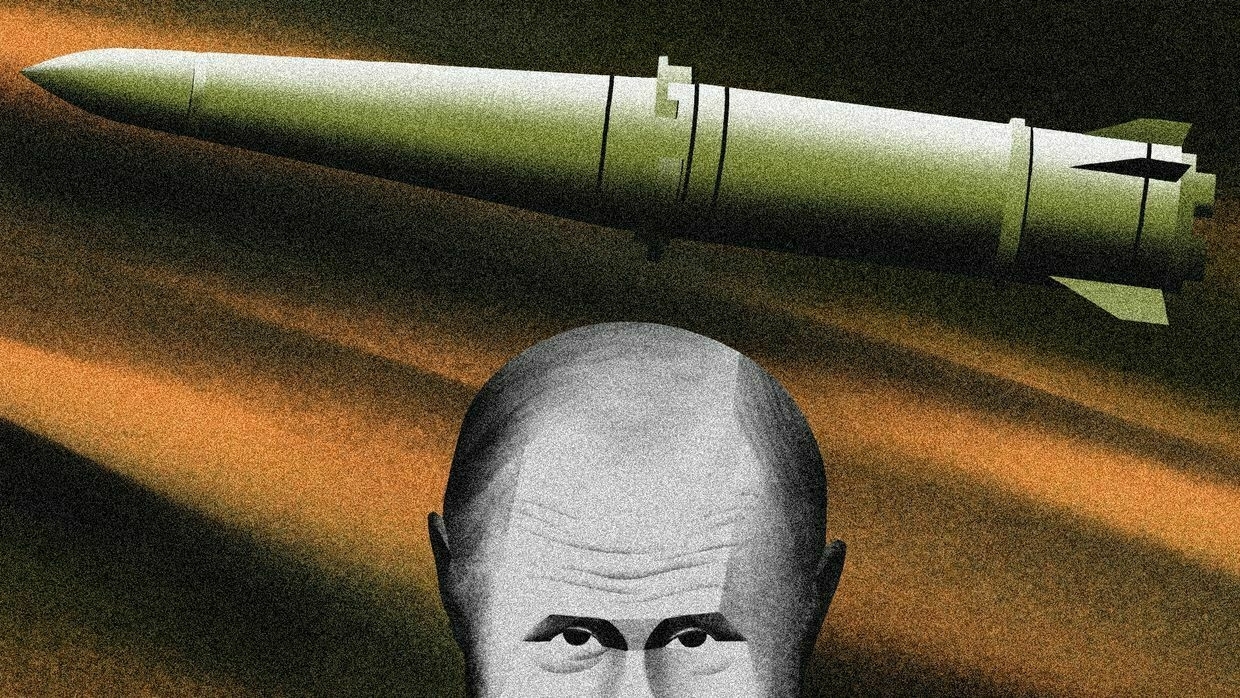
-
Ukraine war latest: Russian attack on Dnipro kills at least 17, injures almost 280
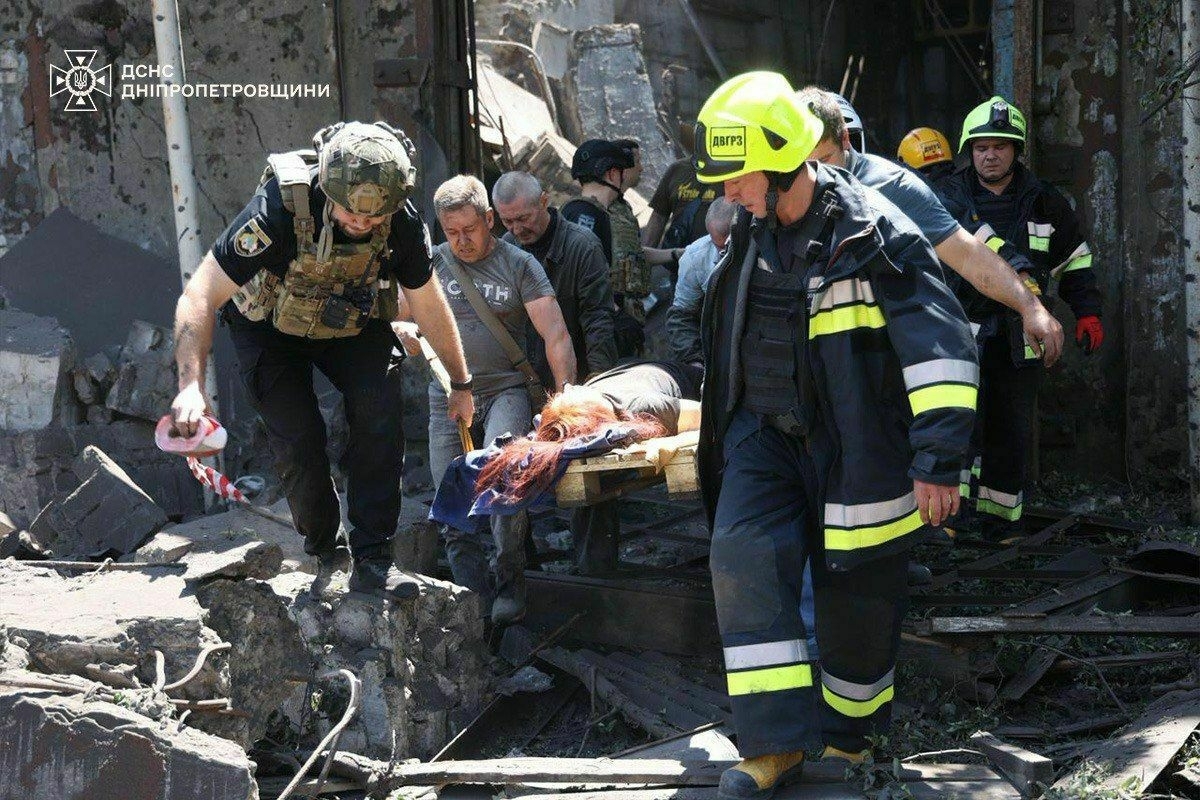
Key developments on June 24:
- ‘Dead and wounded everywhere’ — Russian attack on Dnipro kills at least 17, injures almost 280
- Council of Europe, Ukraine to sign accord on June 25 to set up Russian aggression tribunal
- Ukraine can produce 8 million drones annually but needs funding, Zelensky says at NATO summit
- Trump to meet Zelensky during NATO summit, White House confirms
- UK to fund joint drone production with Ukraine
Russia launched a deadly missile attack on the Ukrainian city of Dnipro on June 24, striking civilian infrastructure and a passenger train, killing at least 17 people and injuring scores of others, local officials reported.
Dnipropetrovsk Oblast Governor Serhii Lysak said the morning strike ignited a large fire and also damaged a dormitory, a gymnasium, and an administrative building in the city.
The Russian military also struck the nearby town of Samarske, Lysak said. Casualties were reported in both locations.
“Unfortunately, there are dead and wounded everywhere,” he said.
In Samarske, two people were killed, and 14 injured. Eight were hospitalized, with half of them in critical condition.
“As of now, more than 160 people are known to have been injured. Unfortunately, 11 people have died,” President Volodymyr Zelensky said in a post on social media, adding: “The rubble is still being cleared, so the death toll may, unfortunately, increase."
Around 8:30 p.m. local time, the death toll rose to 17, while the number of wounded increased to 279, including 27 children, Lysak reported.
Almost a hundred of the victims remain in hospital, according to Lysak.
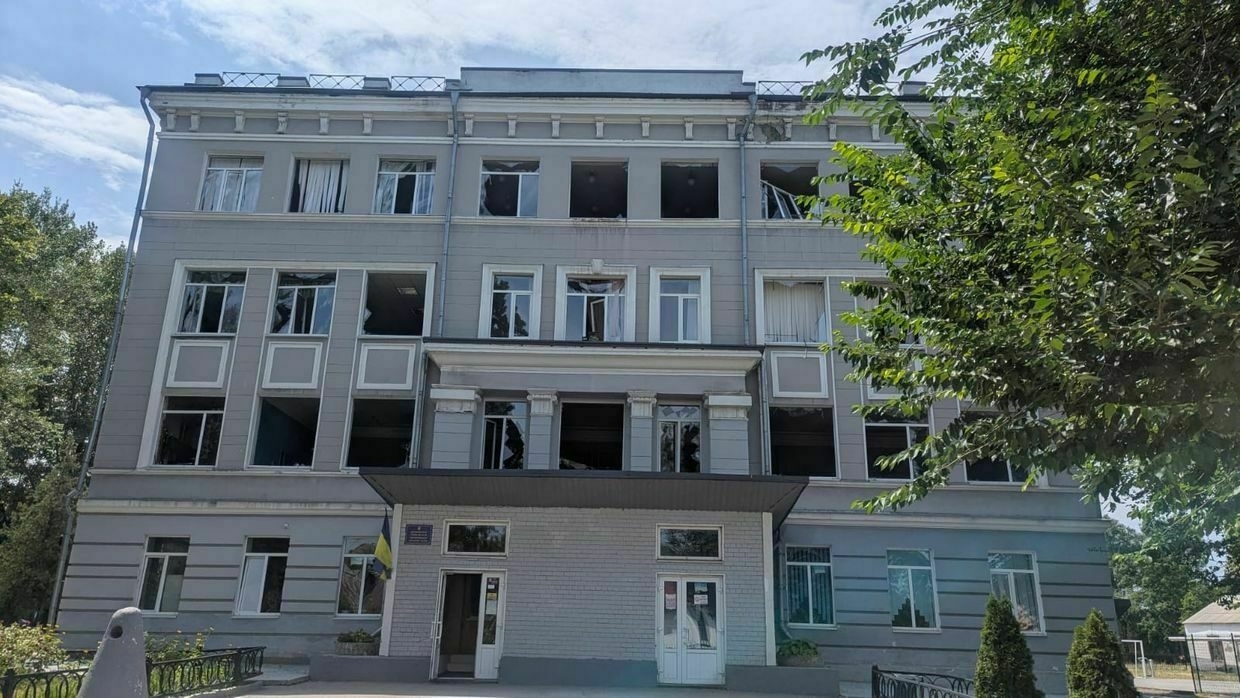
An school in Dnipro that was damaged in Russia’s ballistic missile attack on June 24, 2025. (Dnipro.media) 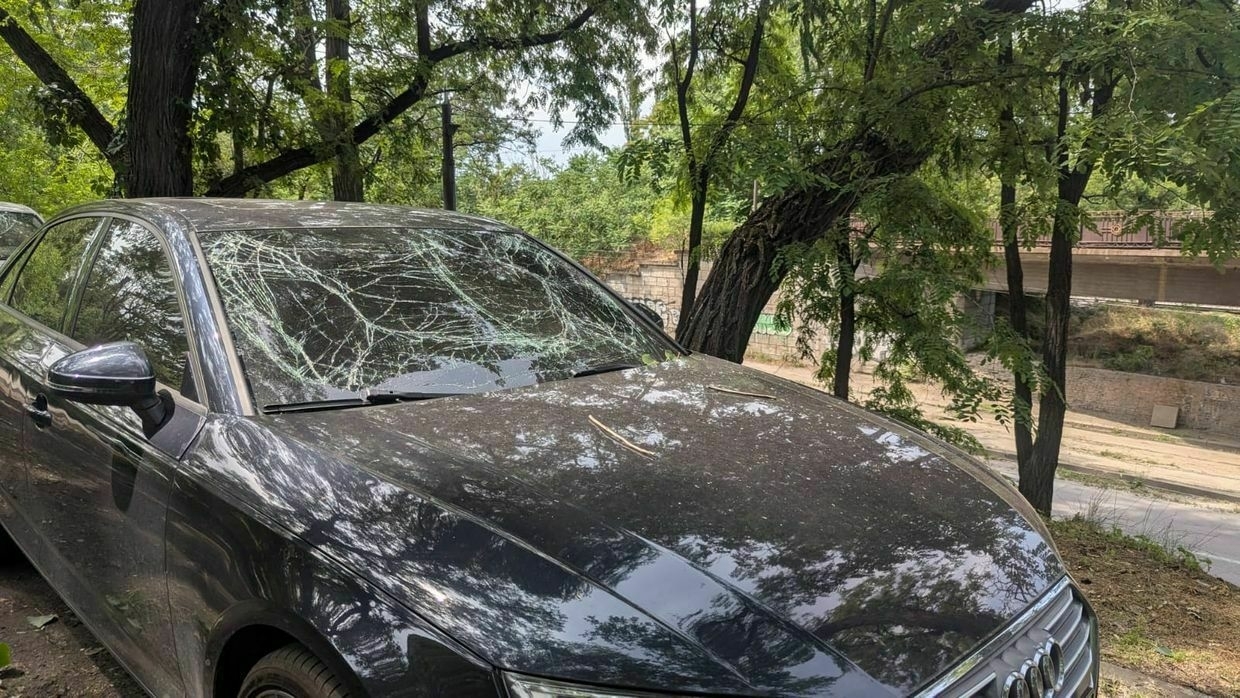
Multiple cars got damaged in Dnipro during Russia’s ballistic missile attack on June 24, 2025. (Dnipro.media) 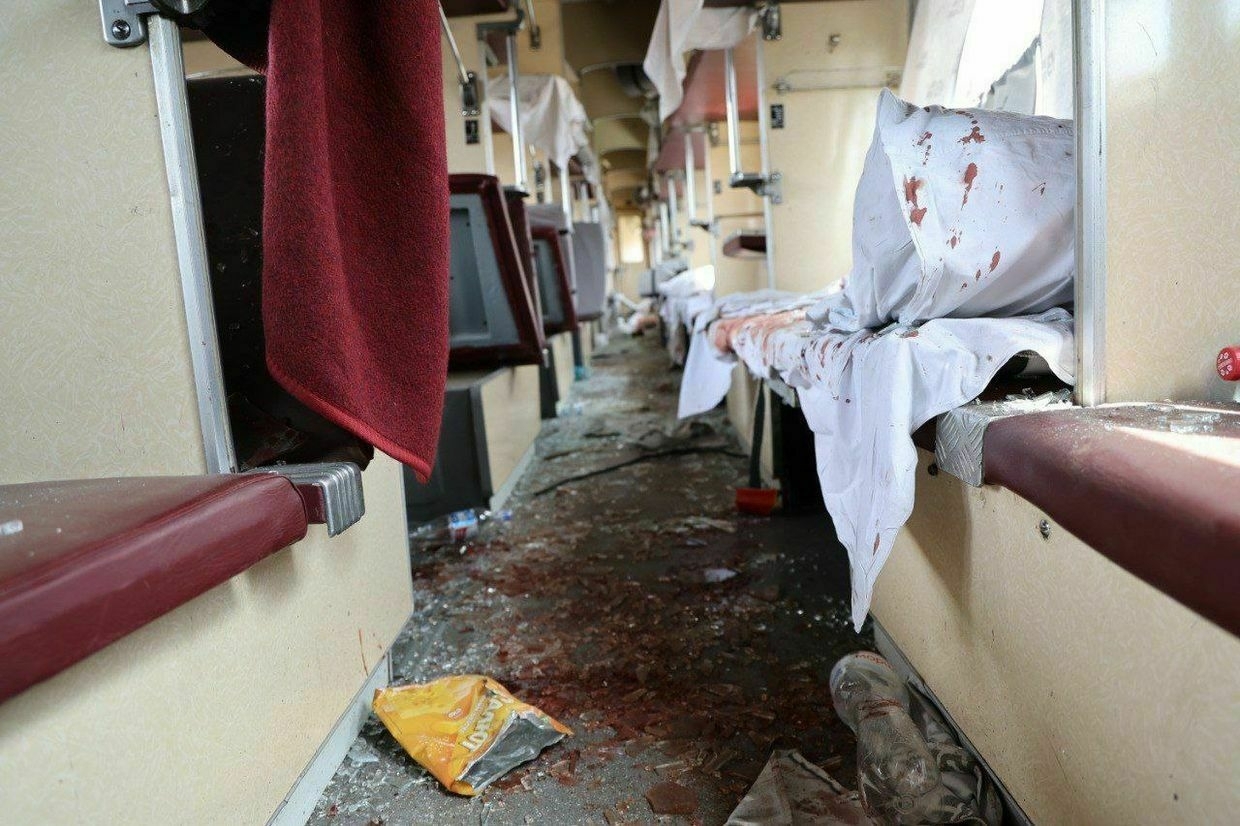
The aftermath of a Russian ballistic missile attack Dnipro on June 24, 2025, that damaged a passenger train (Serhii Lysak/Telegram). Ukraine’s national railway company, Ukrzaliznytsia, said that a train traveling from Odesa to Zaporizhzhia was damaged in the attack.
“Ukrzaliznytsia is preparing a replacement train in Dnipro to evacuate passengers to Zaporizhzhia,” the company said in a statement.
In an update, Ukrzaliznytsia said no passengers or railway workers were killed in the attack, though several people sustained injuries and are receiving medical care.
The attack came as NATO leaders convened for a high-level summit in The Hague. NATO Secretary General Mark Rutte warned on June 23 that Russia remains the alliance’s most immediate and long-term threat.
Investigation: How Russia prepares its strategic missile plant for ‘eternal war’Key findings: * Despite international sanctions, Russia’s strategic missile plant was able to import complex machinery to dramatically increase missile production. * The Kyiv Independent has identified the equipment supplied to the plant, as well as the supply chains, mostly from China. * We located the plant’s new premises, built to house theThe Kyiv IndependentAlisa Yurchenko
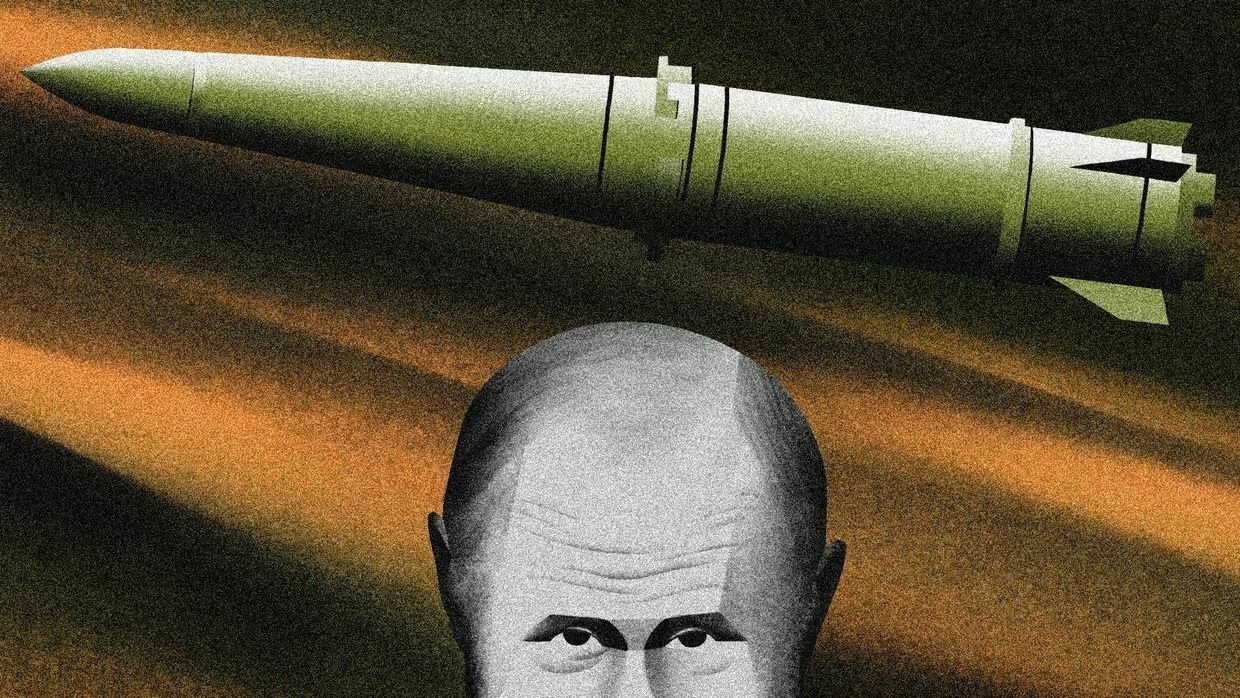
Council of Europe, Ukraine to sign accord on June 25 to set up Russian aggression tribunalThe Council of Europe and Ukraine will sign an agreement on June 25 to set up a special tribunal for the crime of Russian aggression, Yevheniya Kravchuk, a member of Ukraine’s delegation to the Parliamentary Assembly of the Council of Europe (PACE), said on June 24.
The move marks a milestone in international efforts to hold President Vladimir Putin and other top Russian officials accountable for launching the full-scale war against Ukraine.
“What seemed like a dream of justice will soon become a reality. Ukraine, together with the Council of Europe, will sign an agreement that will bring Russia to justice,” Kravchuk wrote on Facebook.
Ukrainian Deputy Prime Minister Olha Stefanishyna stressed that the special tribunal will have jurisdiction over the Russian president, prime minister, foreign minister, and other top officials.
"It is not a matter of debate anymore, only a matter of time. Some will get into the hands of justice sooner, some later, but they will all be held accountable. There are no exceptions," Stefanishyna told the Kyiv Independent. "It's critical to restore the international rule of law and prevent future acts of aggression."
The tribunal's jurisdiction covers all aspects of the crime of aggression, including the planning, preparation, initiation, or execution of acts of aggression, according to Stefanishyna.
"The tribunal's design makes it clear that the official status of the accused at the time of the crime does not exempt them from responsibility," she said. "Functional immunity does not apply here; high-ranking officials can be prosecuted even while holding office. The statute provides rules for conducting proceedings if the accused is absent."
The tribunal will be authorized to cooperate with the International Criminal Court (ICC) to ensure jurisdictional effectiveness and share information, Stefanishyna added.
President Volodymyr Zelensky has long advocated for the tribunal to ensure that Putin and other senior Russian officials face justice for launching the invasion three years ago.
Ukrainian prosecutors have documented thousands of war crimes committed by Russian forces, including attacks on civilians, cultural and medical sites, and acts of torture and deportation.
While war crimes, crimes against humanity, and genocide can be prosecuted against individuals at any level, the crime of aggression applies exclusively to state leaders responsible for planning and waging a war.
The ICC has already issued arrest warrants for Putin and Maria Lvova-Belova, the Russian official overseeing the forced deportation of Ukrainian children to Russia.
Ukraine can produce 8 million drones annually but needs funding, Zelensky saysPresident Volodymyr Zelensky said during NATO summit on June 24 that Ukraine has the capacity to produce over 8 million drones of various types each year, but lacks the financial backing to reach that potential, a shortfall he said must be urgently addressed to defeat Russia's growing military network.
"Our defense production potential has surpassed $35 billion," Zelensky said during a speech at the NATO Defense Industry Forum in The Hague. "This includes nearly 1,000 types of products... but around 40% of this potential lacks proper funding. For example, we can produce over 8 million drones of different types each year, but the financing allows for far fewer."
Zelensky urged allies to scale up investments in joint weapons production, including drone technologies, artillery, and interceptors. He argued that Ukraine's defense capabilities are not only key to defending its own territory, but essential to strengthening NATO's long-term security.
"We must lead in the drone race, both in strike drones and interceptors," he said. "Please increase your investments in Ukraine and joint weapons production. All the weapons we produce become part of a new, stronger European defense and security system."
The Ukrainian president emphasized that Russia is not acting alone, but as part of a broader network of state and non-state actors, including North Korea, Iran, and Chinese companies, which support its war effort against Ukraine and pose a long-term threat to Europe.
More empty threats from Washington, more deadly bombs from RussiaThe ongoing and escalating slaughter of Ukrainian civilians depends on two preconditions: Moscow’s determination to erase Ukraine, and the tacit permission it receives from America and Europe. On Monday, a Russian missile tore through a residential building in Kyiv, leaving at least six civilians dead and over a dozenThe Kyiv IndependentAndrew Chakhoyan
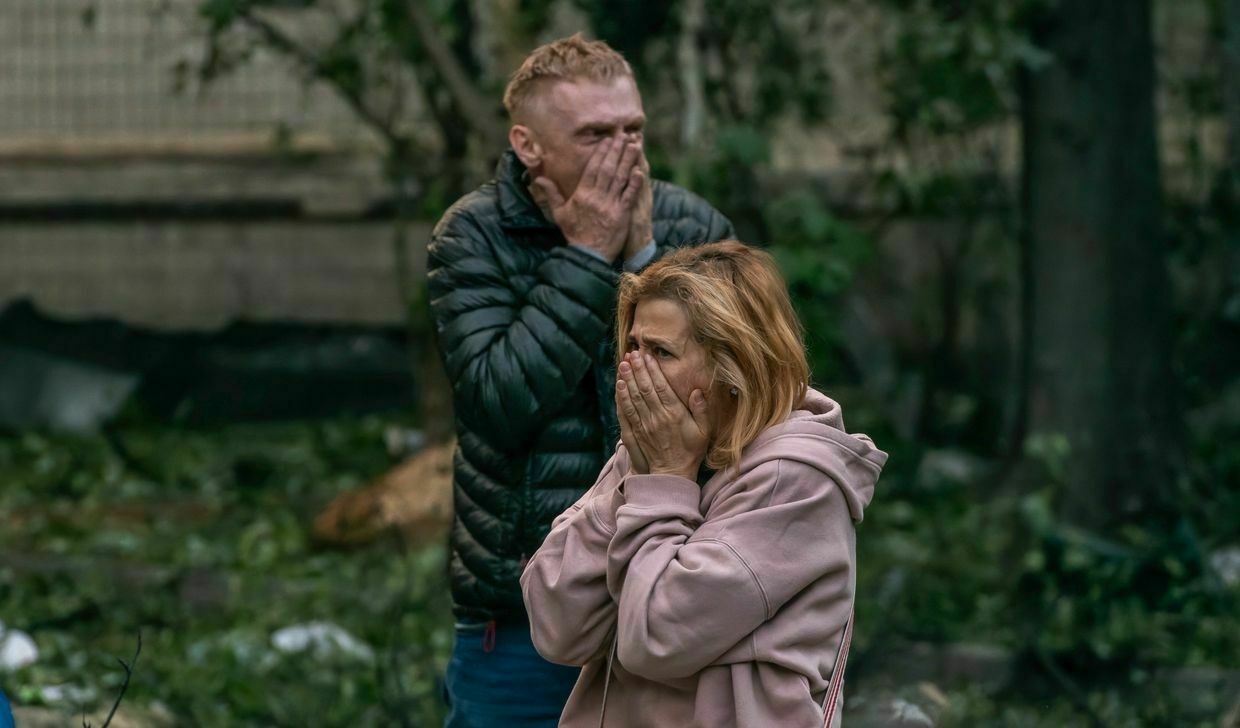
"The source of this war and the long-term threat to Europe is Russia," Zelensky said. "But in reality, we are not just facing Russia alone. We are facing a network of state and non-state actors."
Zelensky also called on NATO members to increase defense spending to 5% of GDP and to dedicate at least 0.25% of GDP to support Ukraine's military needs directly. He thanked countries such as Germany, Norway, Sweden, and the Netherlands for their elevated commitments, but urged others to follow suit.
Zelensky warned that Russia is planning "new military operations on NATO territory" and that the war in Ukraine must be stopped now to prevent broader European conflict.
"There are no signs that Putin wants to stop this war," Zelensky said. "So long as he kills, he lives. And our intelligence confirms this."
He also appealed for a crackdown on the supply chains that allow Russia to sustain its weapons manufacturing, referring to Western-origin components found in Russian missiles, drones, and armored vehicles.
"It's not just China, also Taiwan. Some of these parts come from European countries and from the United States," Zelensky said. "Every single tool delivered to Russia's defense sector helps prolong the war and is a crime against peace."
Zelensky's speech comes as NATO leaders gather in The Hague for a high-level summit on June 24-25. NATO leaders are expected to discuss raising the alliance's defensespending target to 5% of the GDP, a proposal the U.S. has championed but from which it considers itself exempt.
Amid relentless Russian strikes, Ukraine’s businesses rebuild aloneIt took firefighters two days to extinguish the flames at Oleksiy Tarnopolskiy’s warehouse in Kyiv after a Russian attack on June 10. Nothing inside could be saved from his tea and coffee business. Tarnopolskiy arrived on site to an “apocalyptic” scene at 5 a.m., one hour after a RussianThe Kyiv IndependentDominic Culverwell
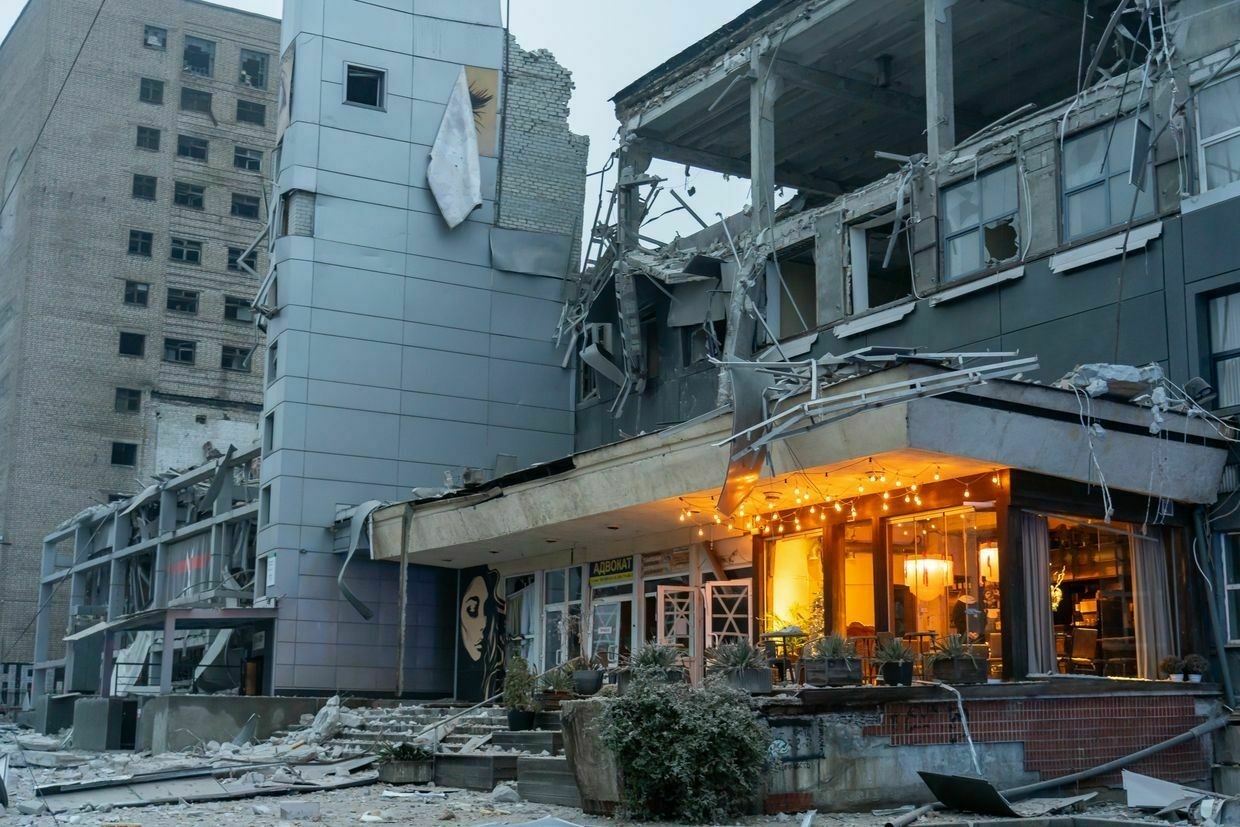
Trump to meet Zelensky during NATO summit, White House confirmsU.S. President Donald Trump will meet his Ukrainian counterpart Volodymyr Zelensky during a NATO summit in The Hague, the White House confirmed on June 24.
The last time Zelensky and Trump met was in April on the sidelines of Pope Francis' funeral amid concerns that Washington would withdraw from mediating peace talks between Kyiv and Moscow.
The White House did not provide any further details about the meeting between the two leaders.
The talks between Zelensky and Trump were scheduled for the "early afternoon" on June 25, the source told AFP, adding that "the teams are finalizing the details" of the meeting.
Trump and Zelensky are expected to discuss Ukraine's "purchase of a defense package, a large part of which consists of air defense systems," according to the source.
The discussion will also focus on "sanctions against Russia, and a price cap on oil," the source added.
Earlier, Trump said that he "would probably meet" Zelensky in The Hague after the two presidents did not manage to talk during the G7 summit in Canada earlier in June, AFP reported on June 24.
When asked what he would say to Zelensky, Trump replied: "I'll say: 'How are you?' He's (Zelensky) in a tough spot, he shouldn't have been there at all".
Zelensky also said in an interview with Sky News that he planned to meet Trump in The Hague. Asked whether the meeting would be a formal discussion or an informal encounter, Zelensky said it was a matter of scheduling: "They are talking about timing. It's timing."
Zelensky expressed hope that Trump's approach to Russia is tactical, intended to pressure Putin into peace negotiations. "I would like this approach to be only a way to force Putin to the negotiating table and to end the war. And let us hope so," he said.
Zelensky was scheduled to meet Trump at the Group of Seven (G7) summit, held June 15-17. However, the U.S. president left the multilateral event early due to the renewed conflict between Israel and Iran.
Zelensky also left the summit early, citing Russia's mass drone and missile attack on Kyiv.
UK to fund joint drone production with UkraineUkraine and the United Kingdom have reached an agreement to jointly produce drones, Defense Minister Rustem Umerov announced on June 24.
Britain will finance the procurement of Ukrainian-designed drones manufactured in the UK, he added.
The deal comes as Ukraine has rapidly developed its drone capabilities since 2022, evolving from modifying commercial aircraft to producing military UAVs, attack drones, and reconnaissance systems at scale.
The agreement was reached between President Volodymyr Zelensky and British Prime Minister Keir Starmer, Umerov said.
Under the three-year program, the UK will finance the procurement of a wide range of Ukrainian drones to be produced by British defense companies.
"This will enable British defense companies to rapidly design and produce state-of-the-art drones on a large scale," Umerov wrote on Facebook.
According to Umerov, all production will be directed to meet the needs of Ukraine's Defense Forces. After the war ends, the UK and Ukraine will share the produced drones between themselves.
The initiative will support the scaling of advanced technologies, increased drone production, and the integration of Ukrainian and British defense industries, Ukraine's defense minister wrote.
Ukraine has ramped up domestic drone production over the recent years of its war with Russia, as well as the development of new missiles.
Various aerial, naval, and ground drones have been developed and often successfully used for reconnaissance, combat, and other tasks throughout the full-scale war with Russia.
In January 2025, Umerov announced that the United Kingdom would finance the production of air defense systems and long-range weapons in Ukraine.
Note from the author:
Ukraine War Latest is put together by the Kyiv Independent news desk team, who keep you informed 24 hours a day, seven days a week. If you value our work and want to ensure we have the resources to continue, join the Kyiv Independent community.
‘Like any technology, it’s a race’ — UK’s largest ammo maker rebooting chemistry to break NATO’s dependence on explosive importsRussia’s war in Ukraine has drained Western ammunition stocks. Despite years of claimed weapons ramp-ups, NATO’s arms manufacturing is still not refilling those stocks apace, let alone making it to Ukraine in needed mass. The West has come to recognize that these shortages are due to the offshoringThe Kyiv IndependentKollen Post
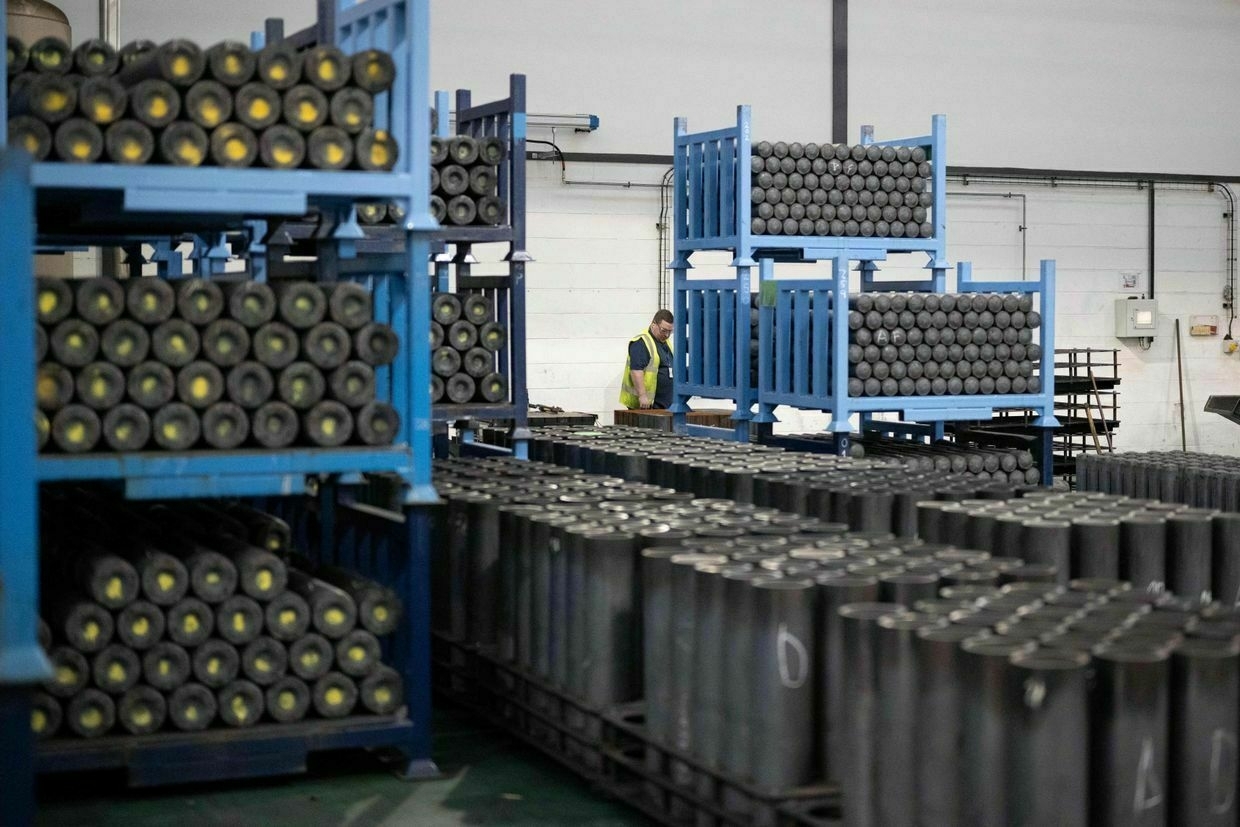
-
Ukraine evacuates 31 citizens, including 14 children, from Iran
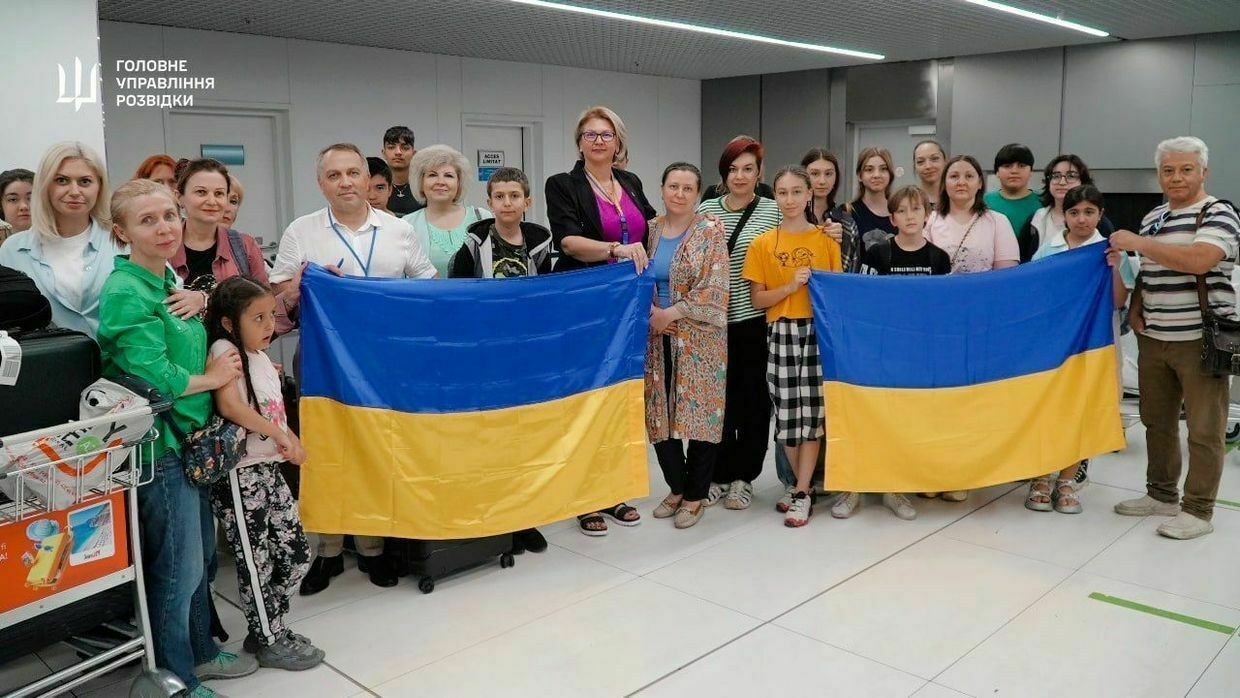
Ukraine’s military intelligence agency (HUR) and the Foreign Ministry have evacuated 31 Ukrainian citizens from Iran on the instructions of President Volodymyr Zelensky, the agency said on June 24.
The news follows a war between Iran and Israel that began on June 13. The countries reached a ceasefire deal on June 24.
Israel and Iran attacked each other hours after the ceasefire was announced. Despite the initial violations, the agreement appears to be holding now.
Ukraine evacuated 14 children, 12 women, and five men, according to HUR.
The evacuation was carried out through Azerbaijan and Moldova to Kyiv, the statement read.
“We felt completely unprotected all the time in Tehran because there were no air raid alerts. In addition, the Internet was down, and we had no idea what was happening,” Varvara from Kyiv Oblast, who was evacuated from Iran, told HUR’s press service.
Earlier, Ukraine evacuated 176 people from Israel, including 133 Ukrainian citizens. The evacuation from Iran is the final stage of a joint operation by HUR and the Foreign Ministry to rescue Ukrainian citizens from high-risk areas, according to the agency’s statement.
Tensions between Iran and Israel had already been rising after Iran launched missile strikes on Tel Aviv and other Israeli cities on June 13, killing multiple civilians, including five Ukrainian nationals. The attack came in retaliation for Israeli military action.
On June 24, Trump announced that a ceasefire between Iran and Israel had come into effect, following the U.S. strikes on Iranian nuclear facilities and a retaliatory Iranian attack on a U.S. military base in Qatar.
Investigation: How Russia prepares its strategic missile plant for ‘eternal war’Key findings: * Despite international sanctions, Russia’s strategic missile plant was able to import complex machinery to dramatically increase missile production. * The Kyiv Independent has identified the equipment supplied to the plant, as well as the supply chains, mostly from China. * We located the plant’s new premises, built to house theThe Kyiv IndependentAlisa Yurchenko
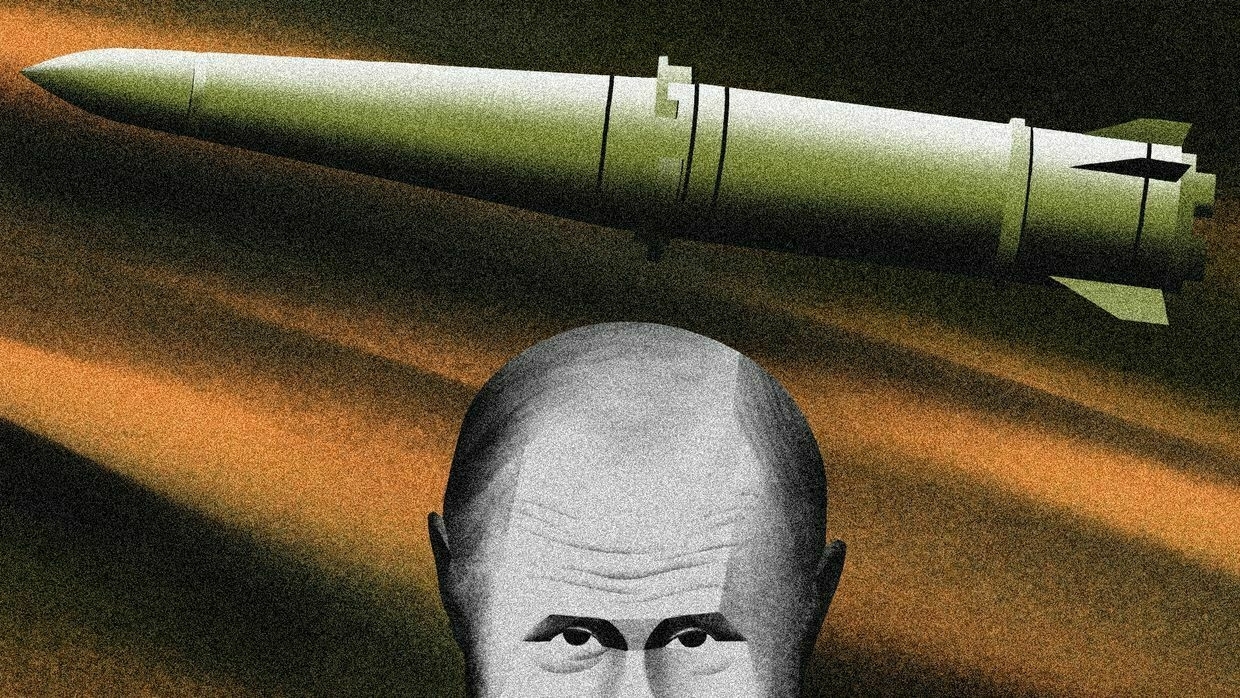
-
More empty threats from Washington, more deadly bombs from Russia
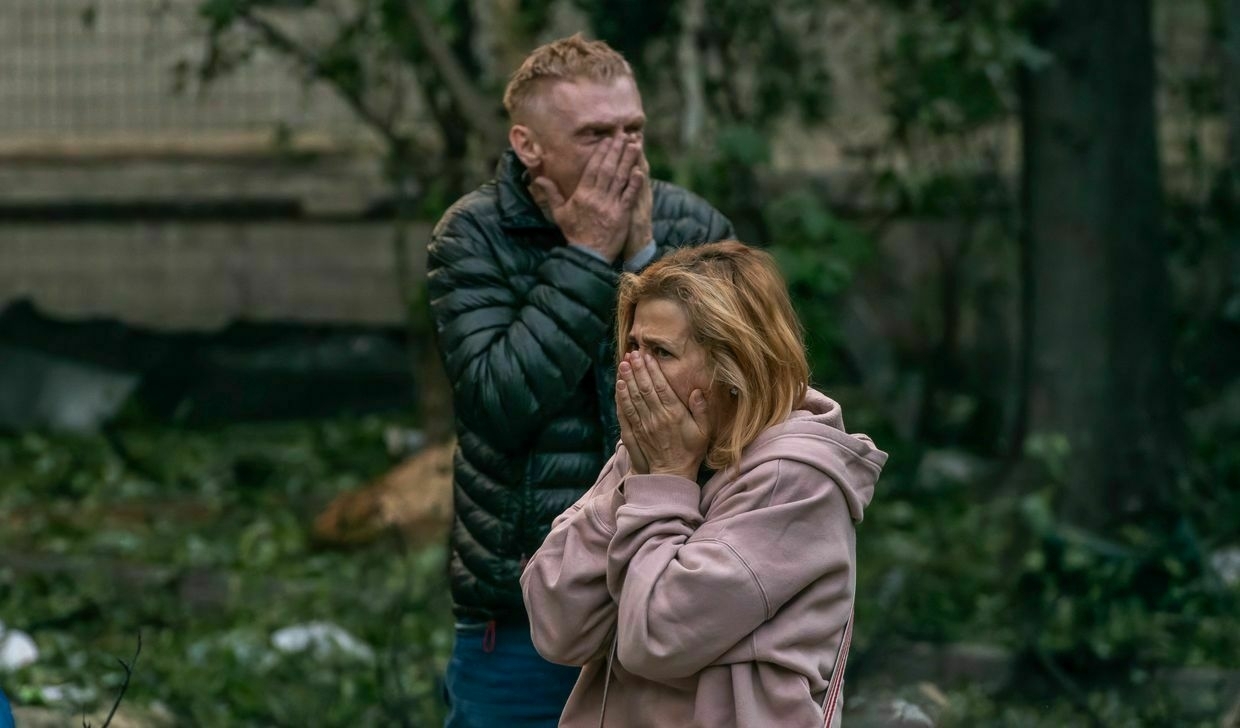
The ongoing and escalating slaughter of Ukrainian civilians depends on two preconditions: Moscow’s determination to erase Ukraine, and the tacit permission it receives from America and Europe.
On Monday, a Russian missile tore through a residential building in Kyiv, leaving at least six civilians dead and over a dozen wounded — including women and children pulled from the rubble in the early hours. “This is what happens when the U.S. withholds air defenses because it doesn’t want to upset the killers in the Kremlin,” remarked Yaroslav Trofimov, Ukrainian-born American journalist, in a post on X.
Russia commits these war crimes, but the dithering of the Free World has let murderous aggression go unpunished for decades. The cost of empty threats from Washington, Berlin, and Paris is measured in lives lost in Kyiv, Kharkiv, and Odesa. If that doesn’t weigh on our collective Western conscience, then we’re not just deluded. We’re complicit.
“While all eyes are on the Middle East, people are dying in Kyiv as Russia bombs Ukraine every day,” EU’s chief diplomat, Kaja Kallas, grimly observed. Between Israel’s first strike on Tehran’s military leadership and American B-2 bombers dropping bunker busters on nuclear sites, Moscow hit Kyiv with its deadliest attack since 2022 — 472 aerial weapons overnight, including nearly 280 Shahed drones. Thirty civilians were killed. One hundred seventy-two injured.
A recent UN report finds that “97% of civilian casualties occurred in areas under the control of the Government of Ukraine.” That’s diplomatic-speak for: Russia targets civilians deliberately, systematically, and relentlessly. No thoughts or prayers will bring back 4-month-old Tymofii Haidarzhi, who never got to say his first word.
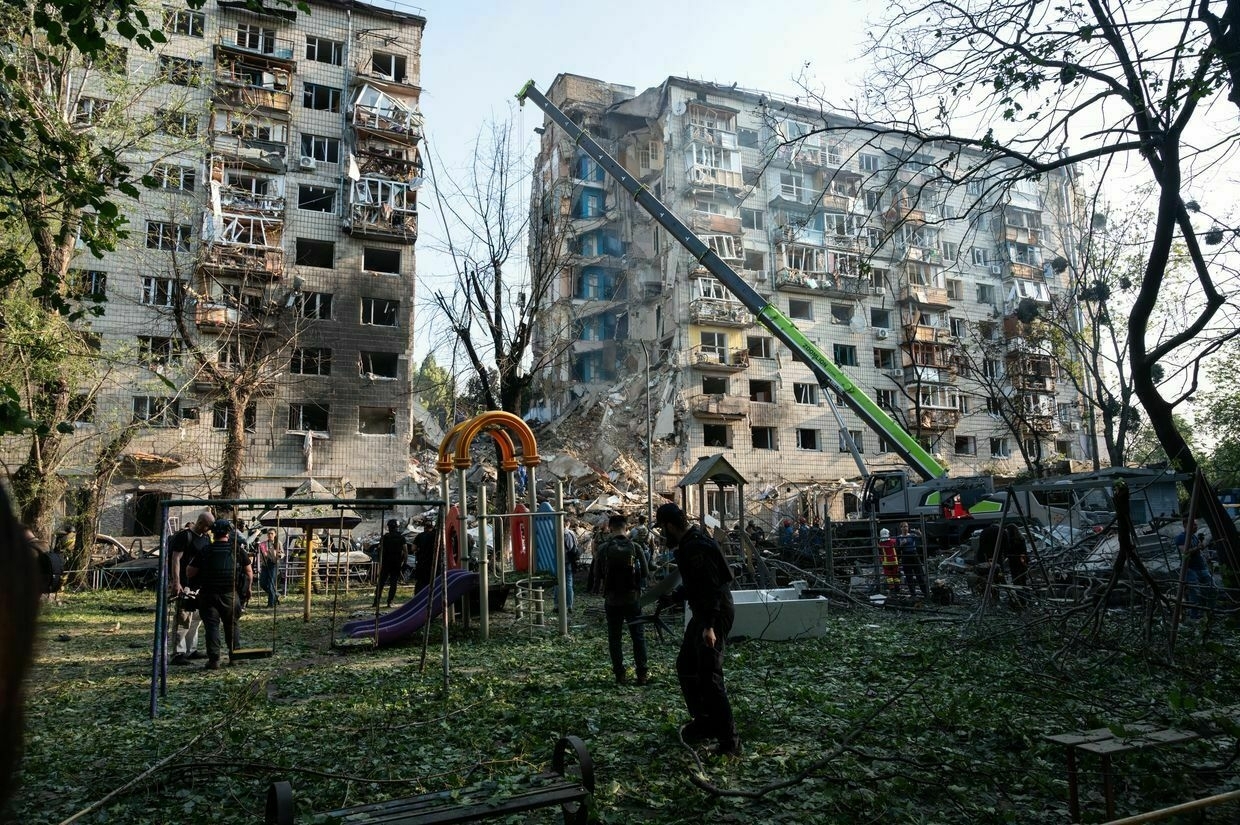
A view of a residential building damaged by a Russian attack in Kyiv, Ukraine, on June 17, 2025. (Danylo Antoniuk / Anadolu via Getty Images) 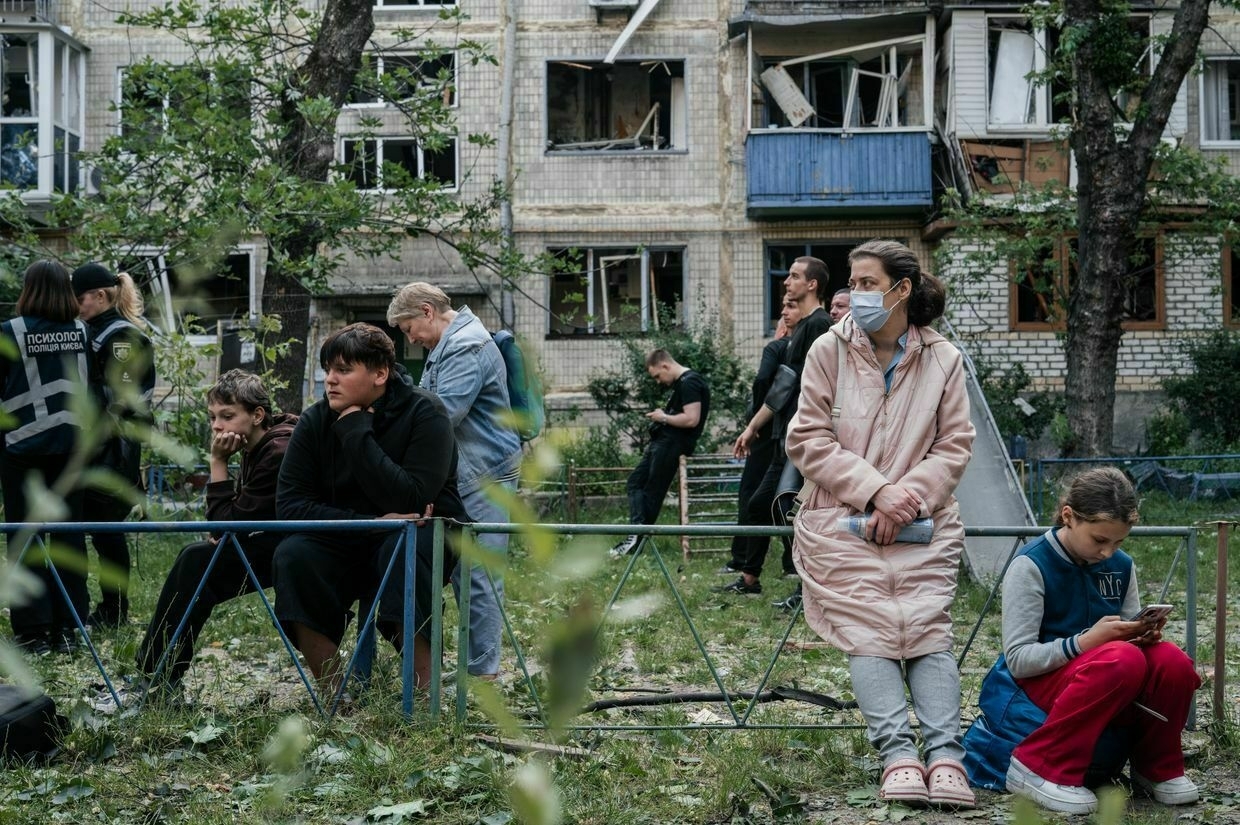
Residents evacuate a damaged apartment building after an overnight drone and missile attack in Kyiv, Ukraine, on June 17, 2025. (Vlada Liberova / Libkos / Getty Images) When America flinches — issuing threats to Moscow it won’t enforce and promises to Ukraine it won’t keep — this kind of weakness destroys all prospects of peace and prolongs the carnage and stains our national honor. “Vladimir, stop,” said Donald Trump in April: words of steel followed by deeds of mush.
Even those who like to hide under the rock of “not our war” must understand that this isn’t just repeated incoherence — it’s the erosion of American credibility at lightspeed. And when our enemies no longer believe our words, they stop respecting American power.
The U.S. president signaled frustration with Russia’s war-making on April 24th — then promptly declined to support congressional secondary sanctions. Reports suggest the administration is quietly trying to dilute a bipartisan bill meant to choke off Russia’s oil profits and has now blocked European efforts to tighten the G7 price cap.
Russia targets civilians deliberately, systematically, and relentlessly.
Then came the infamous "two weeks" deadlines. On April 24th, May 19th, and again on May 28th, Trump repeated the same hollow threat. Peter Dickinson rightly called "two weeks" a shorthand for "too weak."
And astonishingly, just 14 days after the latest ultimatum, instead of delivering consequences to Moscow, Trump’s Defense Secretary, Pete Hegseth, revealed the plans to slash U.S. military aid to Ukraine in the next defense budget. Fear us — or else we’ll retreat. Is that really the message America wants to send?
To add insult to injury, on June 12th, the State Department issued a tone-deaf press release celebrating "Russia Day." While Ukrainians buried their dead, Washington congratulated the country doing the killing. At the G7, Trump was effectively lobbying for Putin’s rehabilitation — lamenting Russia’s expulsion from the G8, as if the invasion of a sovereign neighbor were a minor diplomatic hiccup. One could almost hear the laughter — and the champagne corks popping— in the Kremlin.
This isn’t about party. It's about a pattern. In 2012, President Obama drew a bright red line in Syria. Assad crossed it, and America blinked. But let’s be honest, this era-defining foreign policy misstep didn’t happen in a vacuum. In 2008, Russian tanks rolled across a sovereign border and occupied Georgian territory. The White House responded with handwringing and hollow statements — completely incommensurate with the gravity of the moment. A territory was effectively annexed, and the precedent was set. Moscow learned that every act of overt aggression would be met with deep concern, not deep strikes. In 2014, Russia’s war on Ukraine began.
Thankfully, there’s another model of pairing rhetoric with resolve instead of regret. Ronald Reagan didn’t bluff. He followed through — methodically, consistently, and with purpose.
He called the Soviet Union an "evil empire"— not as a slogan, but as a signal. Then he rebuilt America’s military, strengthened our alliances, and confronted Soviet aggression wherever it appeared — from Poland to Afghanistan to Libya. Reagan didn’t posture. He didn’t just issue threats—he made them real. And he understood a lesson today’s leaders seem to have forgotten: deterrence is capability plus credibility.
That’s the difference. Peace through strength isn’t a bumper sticker. It’s a doctrine grounded in history. And when powerful nations abandon it, the inevitable result is dishonor through weakness. The next time the U.S. president draws a red line or tweets a threat, it had better mean something.
‘Dead and wounded everywhere’ — at least 160 casualties as Russia strikes Dnipro with ballistic missiles, hits civilian trainRussia launched a deadly missile attack on the Ukrainian city of Dnipro on June 24, striking civilian infrastructure and a passenger train, local officials reported.The Kyiv IndependentAnna Fratsyvir
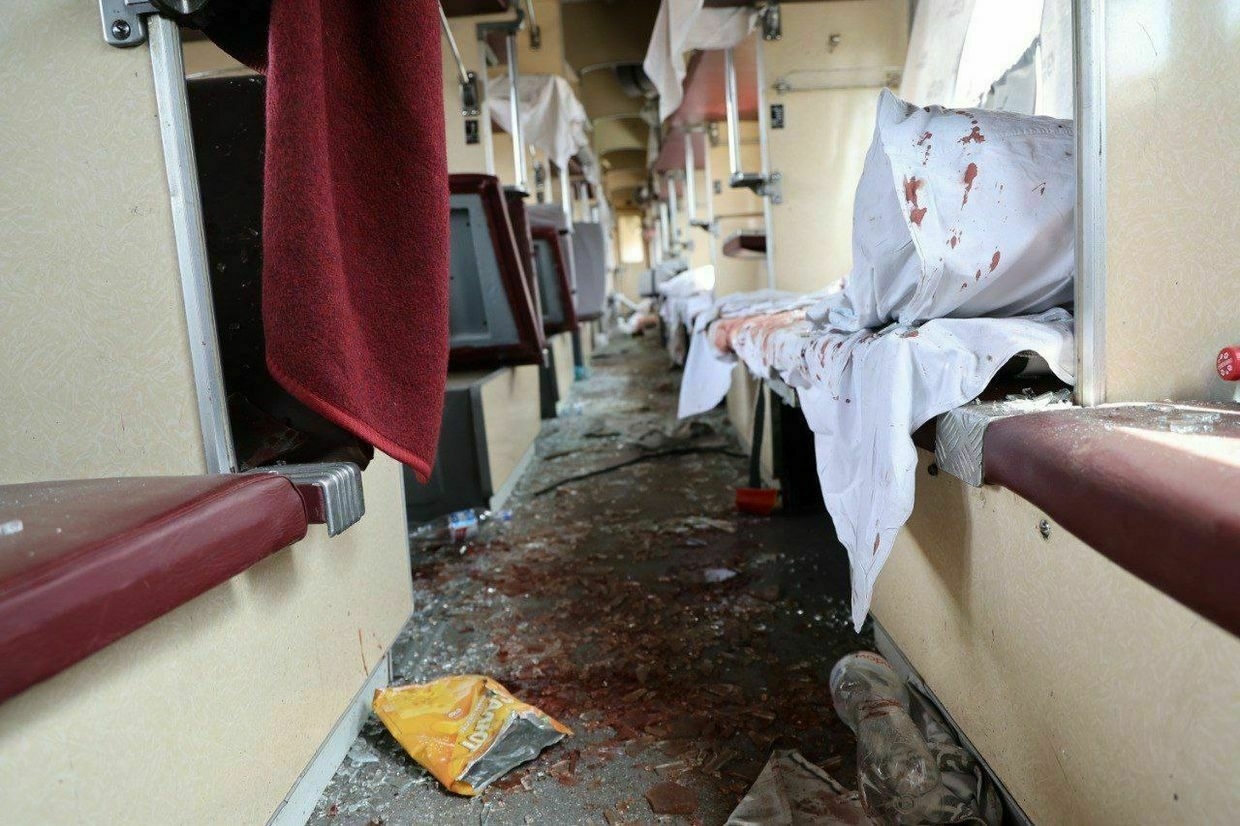
-
Trump says Putin called him to offer help with Iran
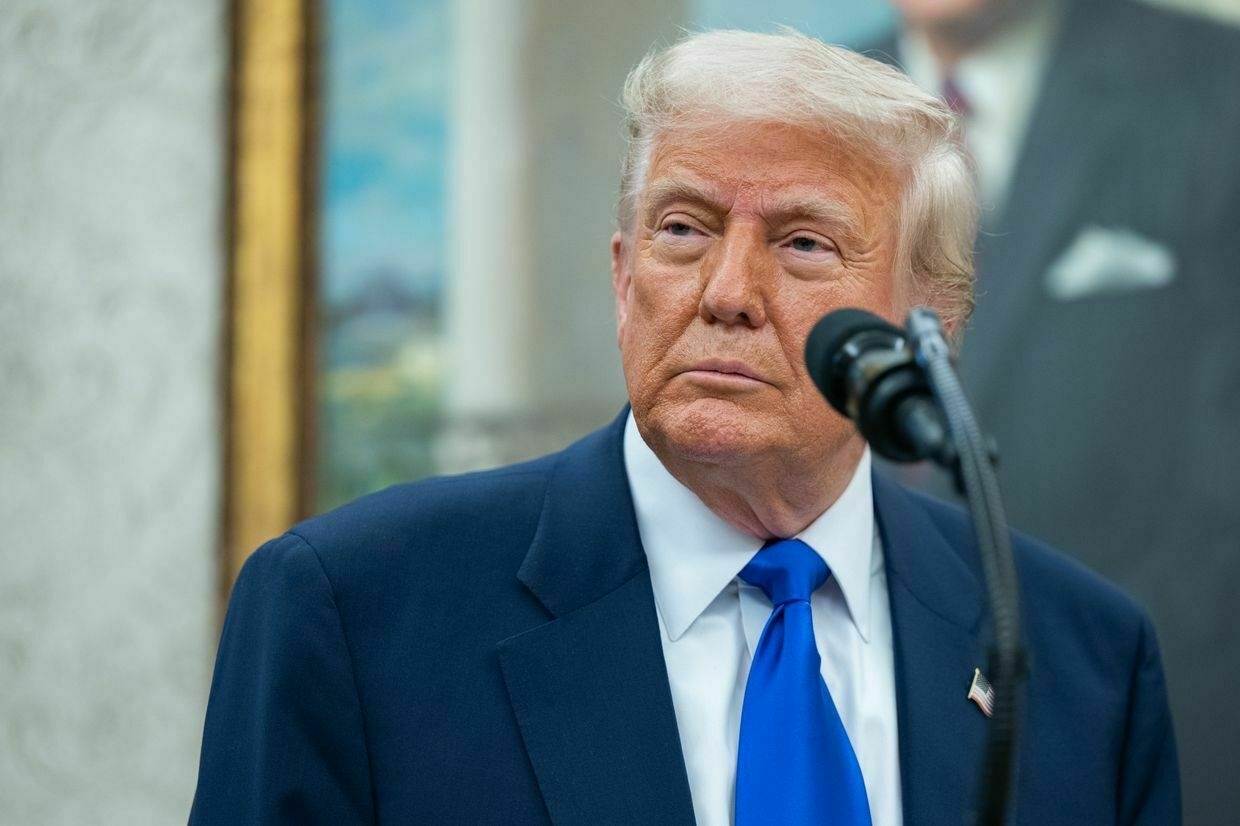
U.S. President Donald Trump said on June 24 that his Russian counterpart Vladimir Putin had called him and offered to help resolve the conflict between Iran and Israel, Fox News reported.
“As you know, Vladimir called me up. He said, can I help you with Iran? I said, ‘no, I don’t need help with Iran. I need help with you.’ And I hope we’re going to be getting a deal done with Russia, which is a shame. Six thousand soldiers died last week,” Trump told journalists while heading to a NATO summit.
Trump’s remarks come as The Hague hosts the NATO summit on June 24-25, at which the American leader is expected to meet Ukraine’s President Volodymyr Zelensky.
Trump added he would like “to see a deal with Russia,” which recently launched a new summer offensive against Ukraine, disregarding calls by Kyiv and its Western partners for an unconditional ceasefire.
The U.S. president did not provide further details on a potential deal with Russia.
Russia has deepened military and political ties with Tehran since and Iran has supplied Moscow with thousands of Shahed-type attack drones used in routine strikes on Ukrainian cities, as well as short-range ballistic missiles.
Russia and Iran have cooperated to develop their own nuclear programs as both countries face Western sanctions. Russia supplied Iran with the Middle East’s first nuclear power plant despite objections from the West.
Tensions between Iran and Israel had already been rising after Iran launched missile strikes on Tel Aviv and other Israeli cities on June 13, killing multiple civilians, including five Ukrainian nationals. The attack came in retaliation for Israeli military action.
Following several days of escalating conflict, Trump announced a ceasefire between Israel and Iran, but it was violated within hours of the American president’s statement.
‘Dead and wounded everywhere’ — at least 160 casualties as Russia strikes Dnipro with ballistic missiles, hits civilian trainRussia launched a deadly missile attack on the Ukrainian city of Dnipro on June 24, striking civilian infrastructure and a passenger train, local officials reported.The Kyiv IndependentAnna Fratsyvir
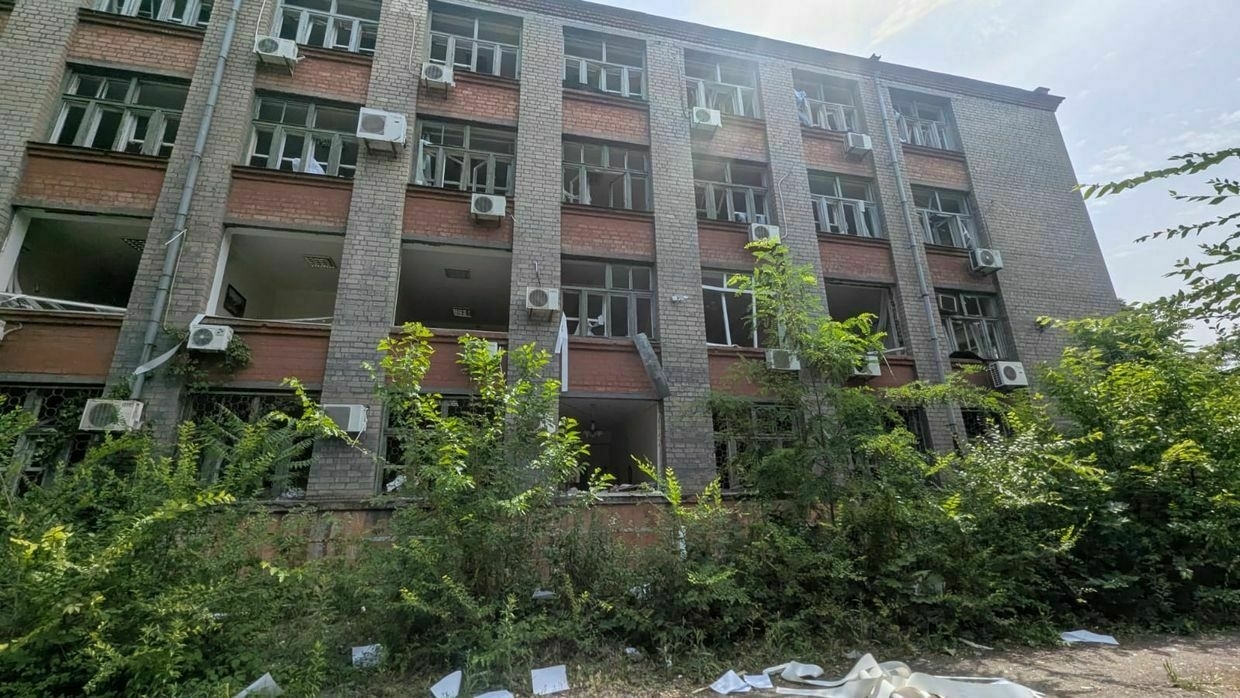
-
Ukraine can produce 8 million drones annually but needs funding, Zelensky says at NATO summit
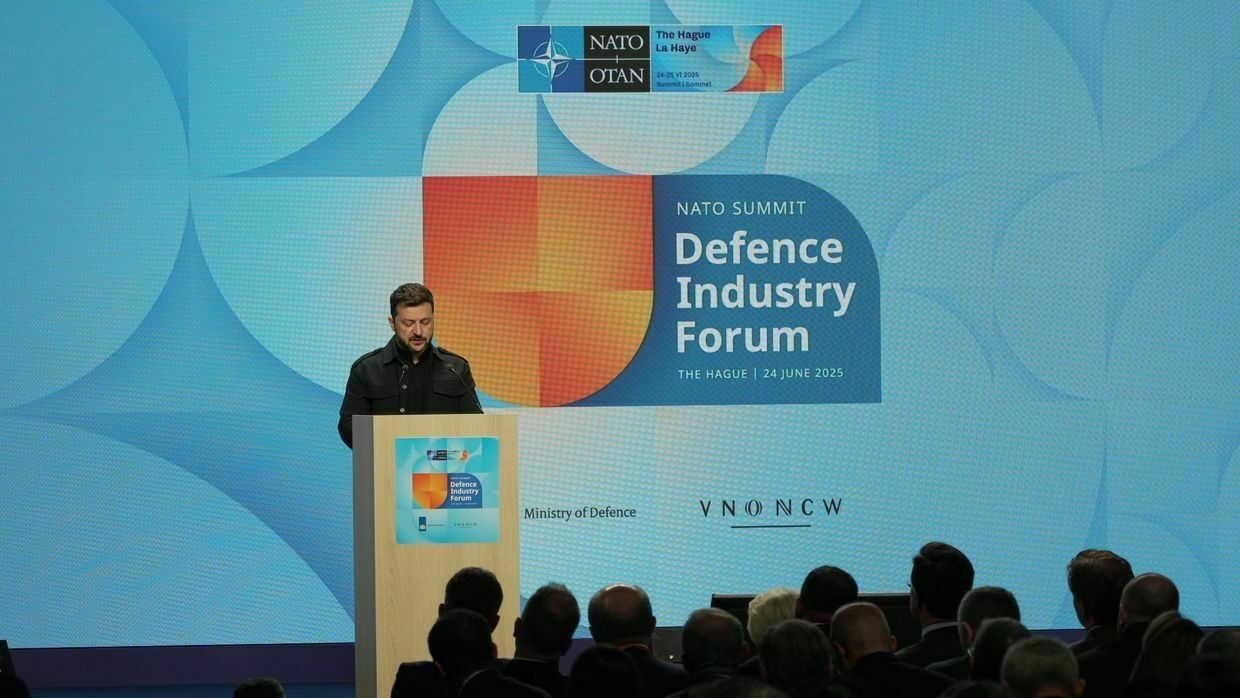
President Volodymyr Zelensky said during NATO summit on June 24 that Ukraine has the capacity to produce over 8 million drones of various types each year, but lacks the financial backing to reach that potential, a shortfall he said must be urgently addressed to defeat Russia’s growing military network.
“Our defense production potential has surpassed $35 billion,” Zelensky said during a speech at the NATO Defense Industry Forum in The Hague. “This includes nearly 1,000 types of products… but around 40% of this potential lacks proper funding. For example, we can produce over 8 million drones of different types each year, but the financing allows for far fewer."
Zelensky urged allies to scale up investments in joint weapons production, including drone technologies, artillery, and interceptors. He argued that Ukraine’s defense capabilities are not only key to defending its own territory, but essential to strengthening NATO’s long-term security.
“We must lead in the drone race, both in strike drones and interceptors,” he said. “Please increase your investments in Ukraine and joint weapons production. All the weapons we produce become part of a new, stronger European defense and security system."
Why can’t the West match Russia’s ammunition production?Editor’s Note: This article has been updated to reflect new details of BAE Systems’ new chemical process that the company confirmed to the Kyiv Independent after initial publication. The West is failing to catch up to Russia’s production of the most basic unit of war for the past half-millennium — gunpowder.The Kyiv IndependentKollen Post
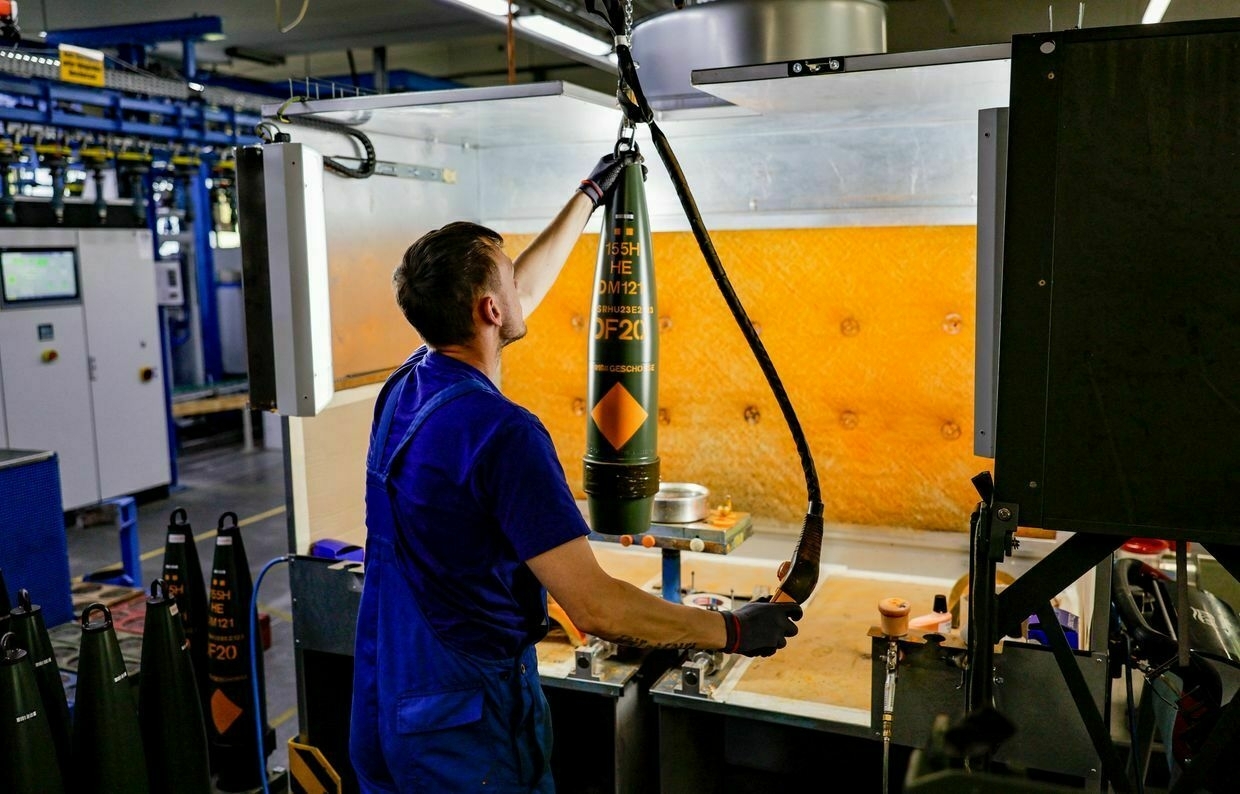
The Ukrainian president emphasized that Russia is not acting alone, but as part of a broader network of state and non-state actors, including North Korea, Iran, and Chinese companies, which support its war effort against Ukraine and pose a long-term threat to Europe.
“The source of this war and the long-term threat to Europe is Russia,” Zelensky said. “But in reality, we are not just facing Russia alone. We are facing a network of state and non-state actors."
Zelensky also called on NATO members to increase defense spending to 5% of GDP and to dedicate at least 0.25% of GDP to support Ukraine’s military needs directly. He thanked countries such as Germany, Norway, Sweden, and the Netherlands for their elevated commitments, but urged others to follow suit.
Zelensky warned that Russia is planning “new military operations on NATO territory” and that the war in Ukraine must be stopped now to prevent broader European conflict.
“There are no signs that Putin wants to stop this war,” Zelensky said. “So long as he kills, he lives. And our intelligence confirms this."
He also appealed for a crackdown on the supply chains that allow Russia to sustain its weapons manufacturing, referring to Western-origin components found in Russian missiles, drones, and armored vehicles.
“It’s not just China, also Taiwan. Some of these parts come from European countries and from the United States,” Zelensky said. “Every single tool delivered to Russia’s defense sector helps prolong the war and is a crime against peace."
Zelensky’s speech comes as NATO leaders gather in The Hague for a high-level summit on June 24-25. NATO leaders are expected to discuss raising the alliance’s defensespending target to 5% of the GDP, a proposal the U.S. has championed but from which it considers itself exempt.
Zelensky is expected to meet U.S. President Donald Trump during the summit.
Zelensky plans to meet Trump at NATO summit in The HagueUpon arrival in The Hague on June 24, Andriy Yermak, head of Ukraine’s presidential office, said he held a “substantive” discussion with U.S. Secretary of State Marco Rubio about the upcoming Zelensky-Trump meeting.The Kyiv IndependentAnna Fratsyvir
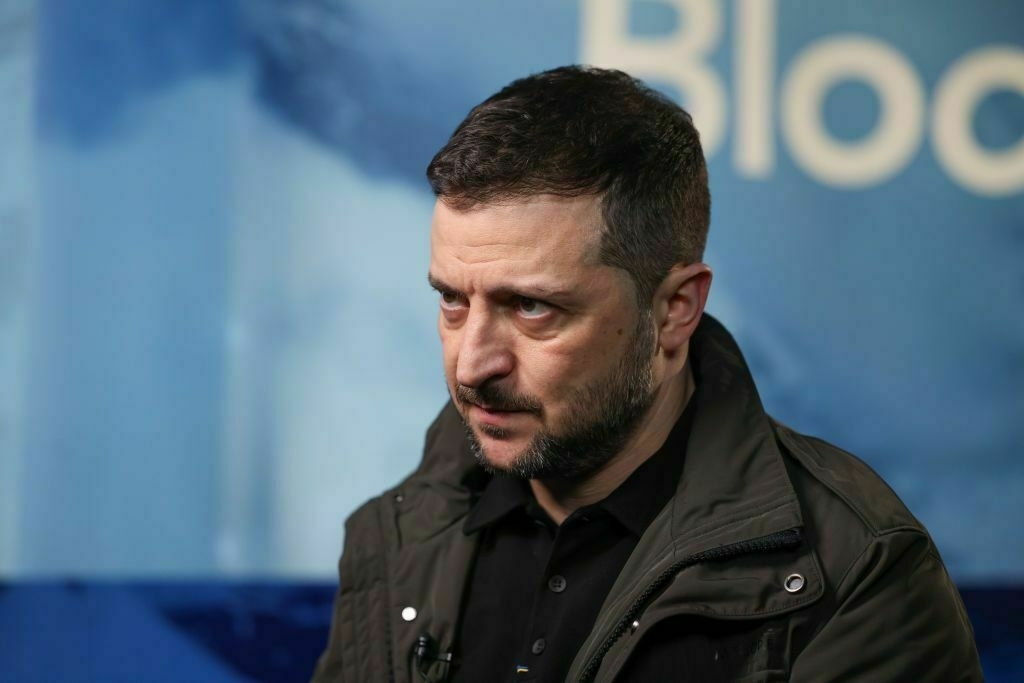
-
Israel reportedly strikes Iran despite Trump's call for calm after announced ceasefire
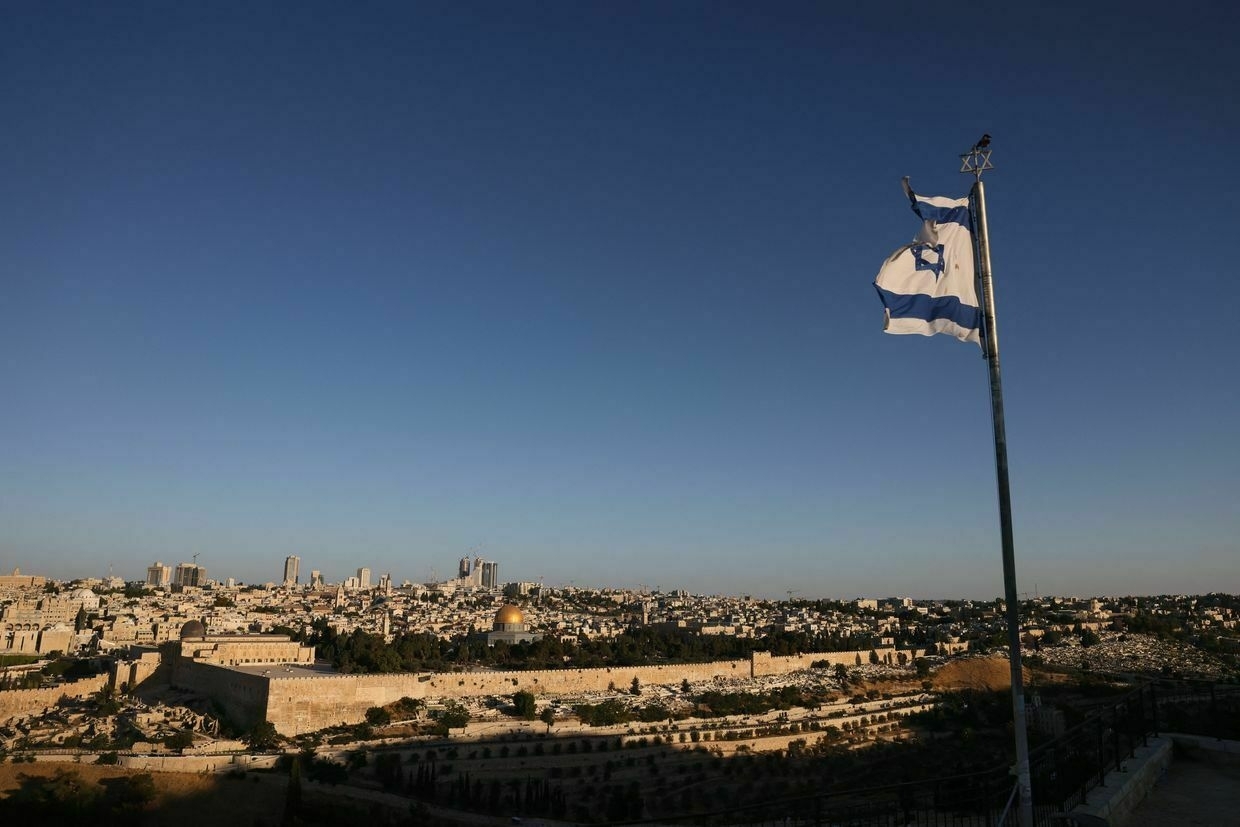
Editor’s note: This is a developing story and is being updated.
Israel launched airstrikes on Iranian territory on June 24, defying U.S. President Donald Trump’s call for calm just few hours after he announced a ceasefire between the two countries, according to the Times of Israel.The attack comes less than an hour after Trump told reporters that “Israel needs to calm down” as he criticized both countries for undermining the ceasefire he says he brokered.
“We basically have two countries that have been fighting so long and so hard that they don’t know what the f*ck they’re doing,” Trump said on June 24.
Hours after Trump said the ceasefire came into effect, Israel accused Tehran of launching missiles toward its territory — an allegation Iran denied.
Following Iran’s alleged missile strike, Trump and Israeli Prime Minister Benjamin Netanyahu reportedly spoke on the phone and agreed that Israel would carry out a limited response. The air force strike targeted a single “symbolic” radar installation.
Ahead of Israel’s strike, Trump wrote on Truth Social that all of the Israeli planes “turn around and head home, while doing a friendly ‘Plane Wave” to Iran."
According to the Times of Israel, Israeli officials said Trump was still sending messages promising that Israel would not attack Iran “after he knew we would attack,” a senior official told the Kan public broadcaster.
Why can’t the West match Russia’s ammunition production?Editor’s Note: This article has been updated to reflect new details of BAE Systems’ new chemical process that the company confirmed to the Kyiv Independent after initial publication. The West is failing to catch up to Russia’s production of the most basic unit of war for the past half-millennium — gunpowder.The Kyiv IndependentKollen Post
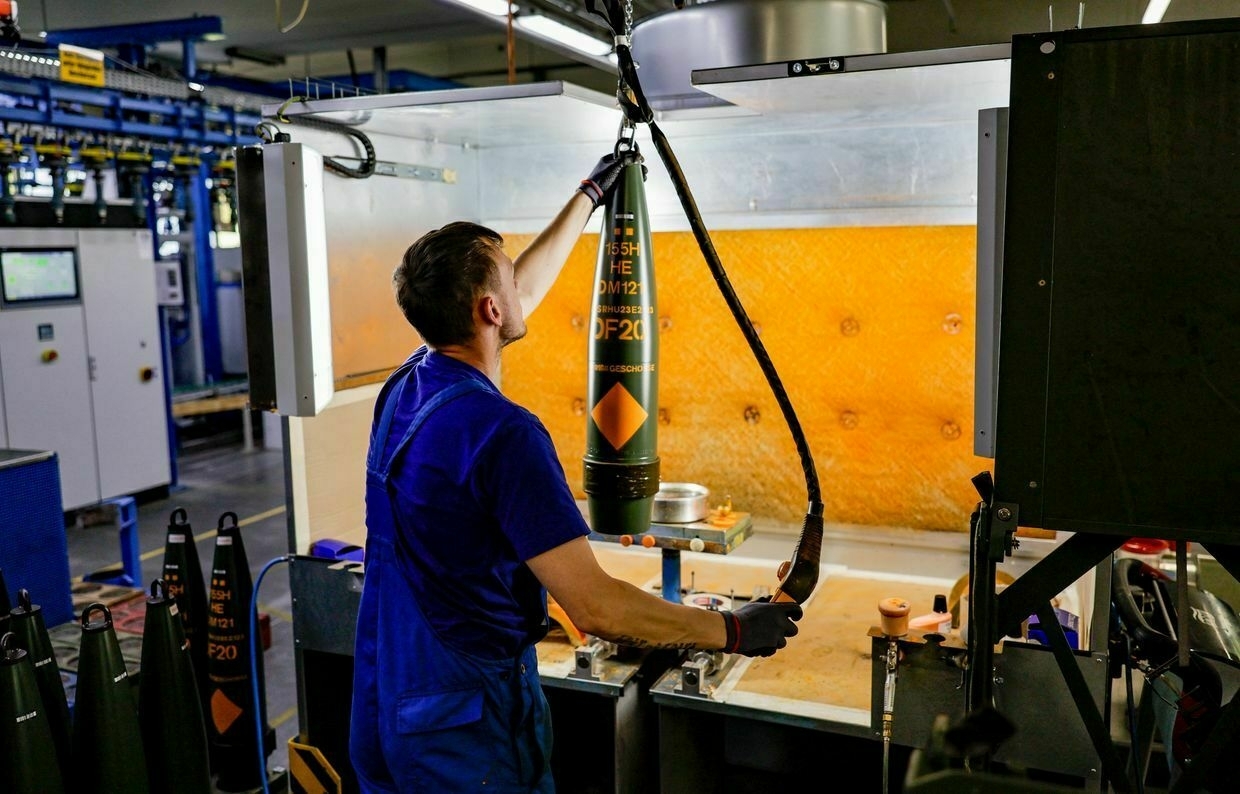
-
Iran strikes show peace can be achieved through strength, US Ambassador to NATO says
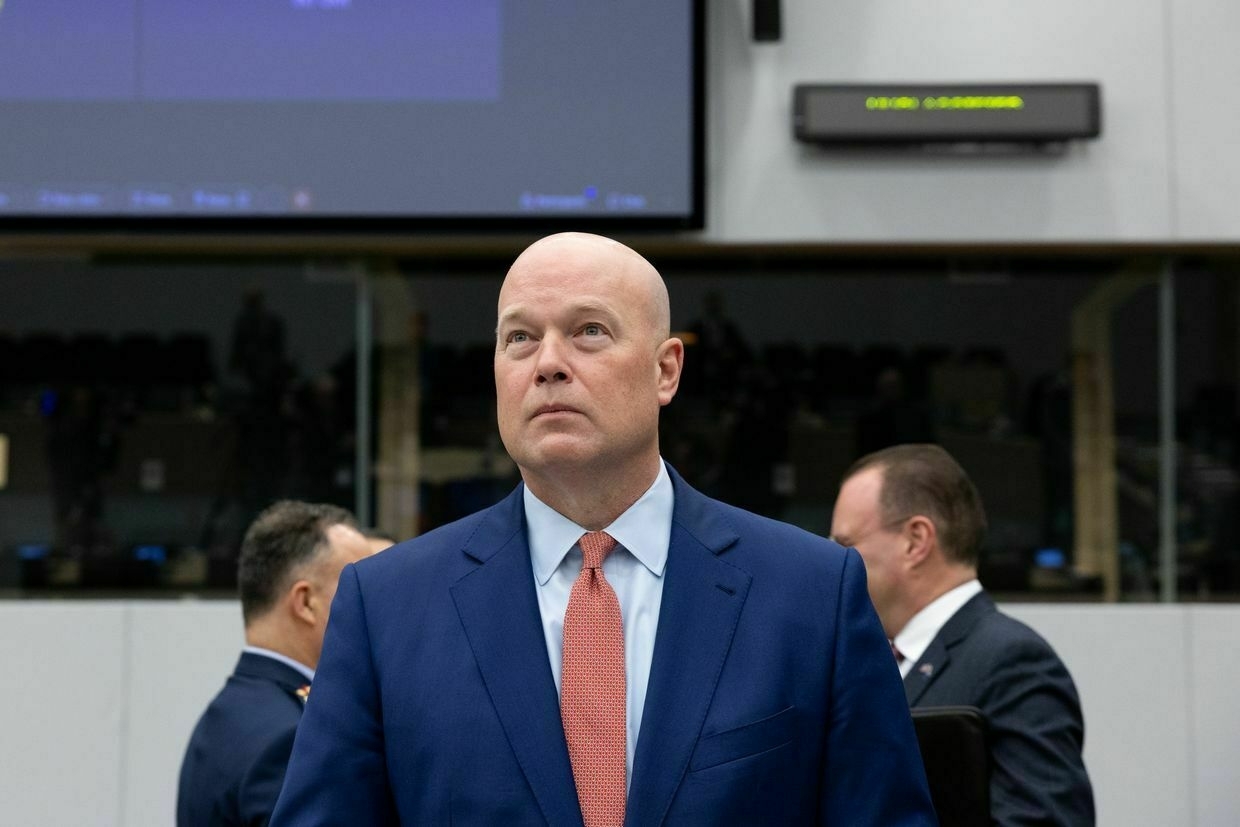
U.S. airstrikes on Iranian nuclear facilities demonstrated how precision military action can achieve rapid peace, U.S. Ambassador to NATO Matthew Whitaker said on June 24, speaking at the NATO Public Forum held alongside the alliance summit in The Hague.
"(The U.S. attack on Iran’s nuclear facilities) shows kind of how you get that peace through that strength, and that strength is amplified and enhanced by this alliance (NATO)," Whitaker said, referring to the June 21 American strikes on Iran’s Fordow, Natanz and Esfahan nuclear sites, which U.S. President Donald Trump called a “spectacular success."
Whitaker emphasized that the U.S. remains a reliable ally and a cornerstone of NATO’s deterrence. “The U.S. isn’t going anywhere,” he said. “The U.S. has certain capabilities that you want an alliance to have."
He added that recent U.S. military operations underscore the importance of defense investments by all member states. “If all of (NATO) countries elevate investments in their defense, I think we will have peace for generations,” Whitaker said.
The U.S. strikes on Iran came amid escalating tensions between Israel and Tehran. Trump said the strikes were intended to push Iran toward negotiations, warning that the alternative would be “tragedy for Iran far greater than we have witnessed."
Trump claimed that a ceasefire between Iran and Israel was achieved on June 24. Just hours later, Israel accused Tehran of launching missiles toward its territory — an allegation Iran denied.
Whitaker said the White House hopes the U.S. will also bring to an end Russia’s war in Ukraine. He added that there is “no purely military solution” to the war in Ukraine.
Unlike past U.S. administrations, Trump has not introduced new sanctions against Russia despite increasing Russian missile and drone attacks on civilians.
On June 24, the first day of the NATO summit, Russia launched a ballistic missile strike on the Ukrainian city of Dnipro, killing at least three people and injuring more than 20, including two children, according to regional officials.
Kyiv has long been advocating for “peace through strength” policy, calling for stronger sanctions against Russia and increased military aid to Ukraine.
‘Let’s not be naive’ — Rutte urges NATO to face Russia, China threats, pledges support for UkraineNATO Secretary General Mark Rutte said NATO’s role is to ensure Ukraine has the military means to stay in the fight until “serious” peace negotiations begin.The Kyiv IndependentAnna Fratsyvir
